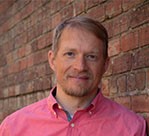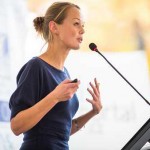Cultivating Potential – Workshop 2 (Growth Foundation)
The Appleton Greene Corporate Training Program (CTP) for Cultivating Potential is provided by Mr. Biss MRED Certified Learning Provider (CLP). Program Specifications: Monthly cost USD$2,500.00; Monthly Workshops 6 hours; Monthly Support 4 hours; Program Duration 12 months; Program orders subject to ongoing availability.
If you would like to view the Client Information Hub (CIH) for this program, please Click Here
Learning Provider Profile
Mr. Biss, MRED, is a Certified Learning Provider (CLP) at Appleton Greene. He has experience in management, marketing, and operations. He has a degree in Mechanical Engineering from the University of Maryland and a Masters of Real Estate Development from Auburn University.
He has industry experience in the following sectors: Non-profit & Charities, Real Estate, Defense, Aviation and Aerospace.
He has had commercial experience in the following countries: United States of America, or more specifically within the following cities: Washington DC, Atlanta GA, Charlotte NC, Orlando FL, and Raleigh NC.
In addition to serving as a KC-130J Transport Plane Commander during global operations throughout North America, Europe, and the Middle East, he served in leadership positions in aviation operations, quality assurance, and maintenance. During one role as a maintenance division officer, he was responsible for the maintenance of a $400MM fleet of aircraft and the leadership of 100 personnel.
Upon retiring from the Marine Corps, Biss pivoted professionally to pursue aspirations in human potential development and has been involved in pioneering work to bring advances human potential development and positive psychology interventions to those in addiction recovery to help cultivate their higher potential for wellbeing and a life of meaning.
Additionally, he serves as a founding member of a water NGO, where he leads small teams into rural villages in Central America to deliver innovative water solutions, having served more than 50 communities so far providing safe water to nearly 12,000 water-insecure people.
MOST Analysis
Mission Statement
This second module shifts the focus from learning ideas to application and the Cultivating Potential process for personal transformation.
A growth foundation begins with helping participants to adopt a growth mindset. Too often, we fall prey to the false belief that we as individuals have fixed strengths, talents, and abilities. Recent neuroscience and positive psychology have shown that skills and abilities are not a fixed variable but can continue to develop throughout a person’s life. Adopting a growth mindset (the focus for this module) provides the context for tapping into innate abilities that have yet to be revealed and processing for honing skills, gaining knowledge, and developing habits that reinforce personal growth.
Once a growth mindset is adopted, the possibilities for increased performance and heightened achievement become near limitless. This change starts with learning to accept full responsibilities for our individual actions and the outcomes we experience in life. Shifting the locus of control over our outcomes to the thoughts, visions, and actions we can control is a personally liberating and incredibly empowering skill to develop. Participants will leverage new tools to analyze how they can best respond to events and circumstances to get the outcomes they seek, regardless of external factors that influence the situation.
By the end of this module, participants will be ready to give up old habits of complaining, blaming, and excuse-making to focus their attention on their personal ownership of the situation and the responses that will lead to constructive outcomes. Through process-oriented performance evaluations, leaders at every level will learn to promote a growth mindset in their team members and co-workers.
With sights set on what is possible with a proper growth foundation, any participant’s inclination to shy away from one’s most ambitious goals will be addressed through processing limiting beliefs. Too often, it is not one’s innate ability that limits their level of achievement as much as it is false beliefs about what is possible for that individual, team, or organization to achieve. These false beliefs become self-fulfilling prophecies as we as individuals or groups limit our expectations for future outcomes; our performance is governed to meet the falsely perceived limitation we hold.
Objectives
01. Growth Mindset: departmental SWOT analysis; strategy research & development. Time Allocated: 1 Month
02. Intention Sets the Course: departmental SWOT analysis; strategy research & development. Time Allocated: 1 Month
03. Three-Part Brain: departmental SWOT analysis; strategy research & development. Time Allocated: 1 Month
04. Basic Human Needs: departmental SWOT analysis; strategy research & development. Time Allocated: 1 Month
05. Self-Esteem & Self-Efficacy: departmental SWOT analysis; strategy research & development. Time Allocated: 1 Month
06. PERMA Model of Human Flourishing: departmental SWOT analysis; strategy research & development. Time Allocated: 1 Month
07. Illness/Wellness Continuum: departmental SWOT analysis; strategy research & development. 1 Month
08. Positivity-Focused: departmental SWOT analysis; strategy research & development. Time Allocated: 1 Month
09. Strengths-Based: departmental SWOT analysis; strategy research & development. Time Allocated: 1 Month
10. Cognitive Biases: departmental SWOT analysis; strategy research & development. Time Allocated: 1 Month
11. Limiting Beliefs: departmental SWOT analysis; strategy research & development. Time Allocated: 1 Month
12. Leadership: Process Feedback: departmental SWOT analysis; strategy research & development. Time Allocated: 1 Month
Strategies
01. Growth Mindset: Each individual department head to undertake departmental SWOT analysis; strategy research & development.
02. Intention Sets the Course: Each individual department head to undertake departmental SWOT analysis; strategy research & development.
03. Three-Part Brain: Each individual department head to undertake departmental SWOT analysis; strategy research & development.
04. Basic Human Needs: Each individual department head to undertake departmental SWOT analysis; strategy research & development.
05. Self-Esteem & Self-Efficacy: Each individual department head to undertake departmental SWOT analysis; strategy research & development.
06. PERMA Model of Human Flourishing: Each individual department head to undertake departmental SWOT analysis; strategy research & development.
07. Illness/Wellness Continuum: Each individual department head to undertake departmental SWOT analysis; strategy research & development.
08. Positivity-Focused: Each individual department head to undertake departmental SWOT analysis; strategy research & development.
09. Strengths-Based: Each individual department head to undertake departmental SWOT analysis; strategy research & development.
10. Cognitive Biases: Each individual department head to undertake departmental SWOT analysis; strategy research & development.
11. Limiting Beliefs: Each individual department head to undertake departmental SWOT analysis; strategy research & development.
12. Leadership: Process Feedback: Each individual department head to undertake departmental SWOT analysis; strategy research & development.
Tasks
01. Create a task on your calendar, to be completed within the next month, to analyze Growth Mindset.
02. Create a task on your calendar, to be completed within the next month, to analyze Intention Sets the Course.
03. Create a task on your calendar, to be completed within the next month, to analyze Three-Part Brain.
04. Create a task on your calendar, to be completed within the next month, to analyze Basic Human Needs.
05. Create a task on your calendar, to be completed within the next month, to analyze Self-Esteem & Self-Efficacy.
06. Create a task on your calendar, to be completed within the next month, to analyze PERMA Model of Human Flourishing.
07. Create a task on your calendar, to be completed within the next month, to analyze Illness/Wellness Continuum.
08. Create a task on your calendar, to be completed within the next month, to analyze Positivity-Focused.
09. Create a task on your calendar, to be completed within the next month, to analyze Strengths-Based.
10. Create a task on your calendar, to be completed within the next month, to analyze Cognitive Biases.
11. Create a task on your calendar, to be completed within the next month, to analyze Limiting Beliefs.
12. Create a task on your calendar, to be completed within the next month, to analyze Leadership: Process Feedback.
Introduction
This second module shifts the focus from learning ideas to application and the Cultivating Potential process for personal transformation.
A growth foundation begins with helping participants to adopt a growth mindset. Too often, we fall prey to the false belief that we as individuals have fixed strengths, talents, and abilities. Recent neuroscience and positive psychology have shown that skills and abilities are not a fixed variable but can continue to develop throughout a person’s life. Adopting a growth mindset (the focus for this module) provides the context for tapping into innate abilities that have yet to be revealed and processing for honing skills, gaining knowledge, and developing habits that reinforce personal growth.
Once a growth mindset is adopted, the possibilities for increased performance and heightened achievement become near limitless. This change starts with learning to accept full responsibilities for our individual actions and the outcomes we experience in life. Shifting the locus of control over our outcomes to the thoughts, visions, and actions we can control is a personally liberating and incredibly empowering skill to develop. Participants will leverage new tools to analyze how they can best respond to events and circumstances to get the outcomes they seek, regardless of external factors that influence the situation.
By the end of this module, participants will be ready to give up old habits of complaining, blaming, and excuse-making to focus their attention on their personal ownership of the situation and the responses that will lead to constructive outcomes. Through process-oriented performance evaluations, leaders at every level will learn to promote a growth mindset in their team members and co-workers.
With sights set on what is possible with a proper growth foundation, any participant’s inclination to shy away from one’s most ambitious goals will be addressed through processing limiting beliefs. Too often, it is not one’s innate ability that limits their level of achievement as much as it is false beliefs about what is possible for that individual, team, or organization to achieve. These false beliefs become self-fulfilling prophecies as we as individuals or groups limit our expectations for future outcomes; our performance is governed to meet the falsely perceived limitation we hold.

Growth Foundation: reaching your full potential
Many athletes have been predicted to be the next big thing over the years, but they have failed to live up to their full potential. Freddy Adu, for example, became the youngest athlete in America to sign a professional contract when he signed with D.C United of Major League Soccer at the age of 14 in 2004. (MLS). He was dubbed “the next Pele” since he was the youngest player to appear and score in the MLS. Many people thought he was going to be one of the best soccer players ever.
Let’s jump ahead 13 years. Is Freddy Adu considered one of the best soccer players in the world? Regrettably, no. Adu has played for ten different professional clubs in the ten years since his big money move to Benfica in 2007, and at the age of just 28, he is currently a ‘free agent’ and does not play for any club.
So, why didn’t Freddy Adu achieve the heights that everyone expected him to, and why do so many other athletes share his fate? One possibility is that some athletes lack the attitude required to reach their full potential and compete at the highest level. If that’s the case, what kind of mindset does a good athlete require?
People have two types of mindsets, according to psychologist Carol Dweck: fixed and growth mindsets. Everyone will have both mindsets, but they will frequently favor one over the other.
Individuals with a fixed mindset believe that some characteristics, such as intelligence, talent, and athleticism, are unchangeable no matter what they do or try (Dweck, 2006, 2009). As a result, these people place a lower value on work and are more concerned with looking their best. People with a fixed mindset frequently fail to reach their full potential because they do not put in the necessary effort to achieve. Due to the fear of failure and looking stupid, research has consistently shown that people with a fixed mindset are more likely to give up easily when confronted with setbacks (Dweck, 2006, 2009). If you can’t succeed at something, they believe there’s no use in persevering since you simply lack the brains to succeed. This is frequently the reason why many young athletes with great potential fail to make the move to the next level.
People with a growth mindset believe that success and achievement are the result of a protracted process that requires hard work, dedication, and perseverance. They believe that talents and intelligence can be developed and improved through time, and that if they work hard enough, they can reach their full potential. According to research, cultivating a growth mindset can lead to good outcomes such as increased resilience in the face of adversity (Yeager & Dweck, 2012; Hinton & Hendrick, 2015), persistence for longer periods of time (Mueller & Dweck, 1998), and greater results (Dweck, 2008).
When examining the processes of the two mindset types, it’s easy to understand how Freddy Adu’s professional inability to achieve the heights anticipated of him might be related to a fixed mindset. His early professional success was sometimes attributed to his inherent ability and similarities to Pele, the Brazilian soccer legend. Hard work, commitment, and tenacity, on the other hand, were rarely mentioned as growth mindset behaviors. Freddy Adu may have developed a fixed mindset, believing his success was primarily due to his innate skill, as a result of the repeated praise on his ability. This research builds on Mueller and Dweck’s (1998) findings, which found that when students were commended for their intelligence/ability rather than their hard effort, their motivation and performance suffered.
According to research, having a growth mindset is a predictor of long-term success. The main question is: how can individuals learn to create growth mindset processes and boost their chances of reaching their maximum potential? The first step is to recognize that long-term success does not come solely from aptitude and ability. For example, was it easy to become a successful athlete, if you asked any elite athlete? They would argue no, claiming that high levels of work, perseverance, and a constant desire to learn are necessary factors for success. The following quotations from Michael Phelps (the most decorated Olympian) and Cristiano Ronaldo (the four-time world footballer of the year) illustrate the importance of trying to learn and progress at all times.
Michael Phelps: ‘There will be obstacles, there will be doubters, there will be mistakes. But with hard work, there are no limits’.
Cristiano Ronaldo: ‘I feel an endless need to learn, to improve, to evolve, not only to please the coach and the fans, but also feel satisfied with myself’.
The second phase is to have no limitations. Restricting what you can achieve will limit what you can accomplish. Always keep in mind that there is always something new to learn, and that every experience you have will help you grow.
The ability to embrace setbacks/failure and learn from them, as well as what you need to do to better, is a critical component in developing a growth mindset. Above all, utilize that failure to drive your desire to succeed and reach your greatest potential. Because they have learned from their previous mistakes and failures, the most successful business people can perform successfully in any circumstances, both typical and tough.
Finally, identify your sources of inspiration that pushes you to develop and succeed. Your source of inspiration could be the ambition to become the best in your field.
Embracing a growth mindset, could be the answer to you reaching your full potential.

Growth Mindset vs Fixed Mindset: How what you think affects what you achieve
Can the way we think about ourselves and our skills impact our lives, whether we have a growth mindset or a fixed mindset? Absolutely. The way we think about our intellect and talents has an impact on not just how we feel, but also on what we achieve, whether we cling to new habits, and whether we continue to learn new skills.
If you have a growth mindset, you feel that your intelligence and abilities can be improved through time. If you have a fixed mindset, you believe that intelligence is fixed, therefore if you’re not excellent at something, you may believe that you’ll never be good at it.
Let’s look at growth vs. fixed mindsets together, explore the science, and see how people can change their mindsets over time.
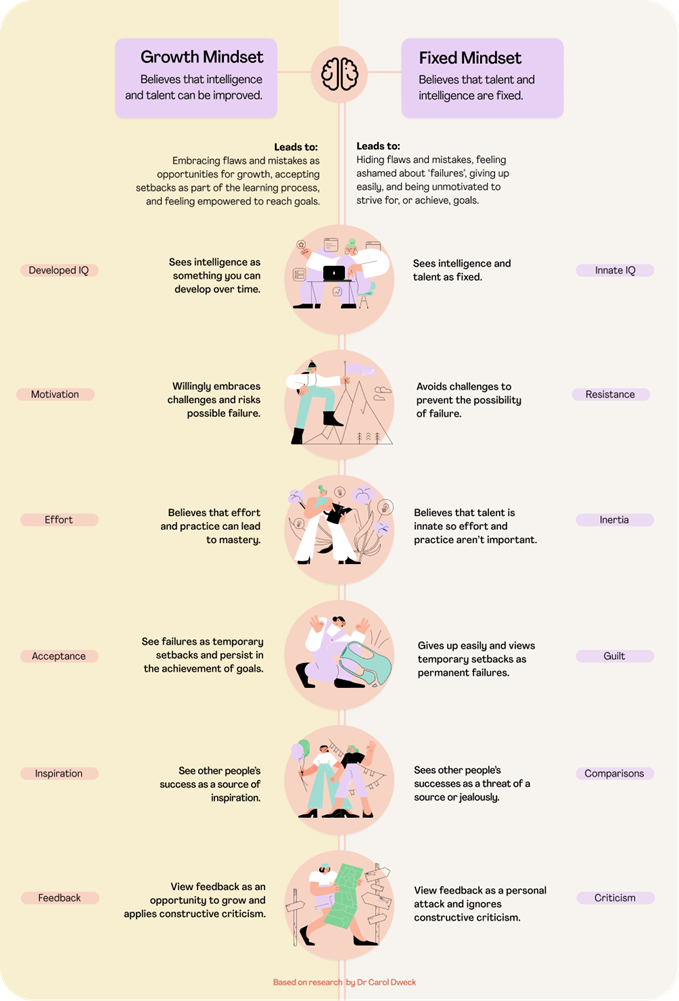
Growth vs. fixed mindsets for life
The human brain was once thought to end developing in childhood, but we now know that it is always altering and changing. Many regions of the brain respond to events, and we can update our ‘software’ by learning.
Despite the scientific evidence, some individuals believe you are stuck with the abilities and ‘smarts’ you were born with. Carol Dweck, a Stanford University psychologist, was the first to investigate the concept of fixed and development mindsets.
Dr. Dweck characterized the two primary ways individuals think about intelligence or ability in her foundational work as being either:
• A fixed mindset: in this mindset, people believe that their intelligence is fixed and static.
• A growth mindset: in this mindset, people believe that intelligence and talents can be improved through effort and learning.
People who have a fixed mindset feel that their intelligence and abilities are predetermined. Fixed mindset people believe that “they have a specific amount (of knowledge) and that’s it,” according to Dr. Dweck, and that their goal is to “appear clever all the time and never look dumb.”
People with a growth mindset, on the other hand, recognize that not knowing or being good at anything is a transient state, so they don’t have to feel embarrassed or strive to prove they’re smarter than they are.
Dweck states that in a growth mindset, “students understand that their talents and abilities can be developed through effort, good teaching, and persistence.”
What is a growth mindset?
Intelligence and talent are seen as attributes that can be developed over time under a growth mentality.
This isn’t to say that people with a growth mindset believe they can become the next Einstein; there are still limits to what we can accomplish. People with a growth mindset believe that by putting up effort and taking action, they may increase their intelligence and talents.
A growth mindset also acknowledges that setbacks are an unavoidable part of the learning process, allowing people to ‘bounce back’ by boosting motivating effort.
A growth mindset views ‘failures’ as temporary and adaptable, making it essential for learning, resilience, motivation, and performance.
People that have a growth mindset are more likely to undertake the following:
• Be open to lifelong learning.
• Belief that intelligence may be enhanced
• Make a greater effort to learn
• Believe that hard work leads to mastery
• Believe that setbacks are just temporary.
• Consider criticism as a source of information.
• Takes on challenges with enthusiasm
• Take inspiration from others’ achievements.
• Look at feedback as an opportunity to improve.
What is a fixed mindset?
People with a fixed mindset believe that traits like talent and intelligence are fixed—that is, they believe they are born with the amount of intelligence and natural talents they will achieve as adults.
A fixed-minded individual avoids life’s obstacles, gives up easily, and is intimidated or threatened by other people’s success. This is due to the fact that a fixed mindset views intelligence and talent as something you “are,” rather than something you “grow.”
Negative thinking can be exacerbated by fixed mindsets. A person with a fixed mindset, for example, may fail at a task and assume it is because they aren’t smart enough to do it. A person with a growth mindset, on the other hand, can fail at the same task and assume it’s because they need to practice more.
Individual traits cannot change, no matter how hard you try, and people with a fixed mindset are more likely to:
• Believe intelligence and talent are static
• Avoid challenges to avoid failure
• Ignore feedback from others
• Feel threatened by the success of others
• Hide flaws so as not to be judged by others
• Believe putting in effort is worthless
• View feedback as personal criticism
• Give up easily
Who identified the growth mindset?
The growth mindset was originally presented by Stanford University psychologist Dr. Carol Dweck. Dweck’s ground-breaking research looked at why some people fail while others flourish.
High school pupils were given puzzles that ranged from easy to challenging in one research. Some students accepted failure and viewed it as a learning experience, much to the surprise of researchers, and this positive attitude was eventually termed by Dweck as the ‘growth mindset.’
Dweck’s research also discovered that, contrary to popular belief, it is more effective to praise the process rather than skill or innate qualities. Effort, strategies, perseverance, and resilience, in particular, should be praised. These procedures are crucial for providing constructive feedback and establishing a positive student-teacher connection.
While effort is an important aspect of a growth mindset, it shouldn’t be the primary focus of praise, according to Dweck in a 2015 paper. Effort should be viewed as a tool for learning and improvement. Continue telling yourself “excellent effort” after completing a task to promote a growth attitude, but also seek for ways to improve next time—so you feel good in the short and long term.

The benefits of a growth mindset
According to Dweck and others’ research, a growth mindset improves motivation and academic success.
One study looked at undergraduate students’ academic satisfaction after learning about the brain’s neuroplasticity.
Three one-hour seminars on brain functioning were used to encourage pupils to adopt a growth mindset. The participants in the control group were educated that there are several types of intelligence. After learning about the growth mindset, students demonstrated much stronger motivation and pleasure of science than students in the control group.
Teaching a growth mindset to junior high school pupils resulted in enhanced motivation and academic achievement, according to another study. A growth mindset was found to be especially useful for students studying science and mathematics, according to the researchers.
Students who advocated a growth mindset rather than a fixed mindset received superior grades in mathematics, languages, and grade point averages (GPA), according to studies.
A growth mentality also has the following advantages:
• Reduced burnout
• Fewer psychological problems, such as depression and anxiety
• Fewer behavioral problems
The neuroscience of a growth mindset
To better understand the neurological correlates of a growth mindset, scientists have examined electrical activity in the brain.
Researchers have discovered a correlation between a growth mindset and activation in two important areas of the brain using neuroimaging:
• The anterior cingulate cortex (ACC): involved in learning and control
• The dorsolateral prefrontal cortex (DLPFC): involved in error-monitoring and behavioral adaptation
Higher motivation and error correction appear to be linked to a growth mindset. It’s also linked to less activation in the face of negative input.
Furthermore, studies have discovered that when a person is told how they might develop — for example, recommendations on what to do better next time – the brain is most active in growth-minded people. Meanwhile, when a person with a fixed mindset is given information regarding their performance – such as the results of a test – the brain is engaged. This implies that persons with a growth mindset are more concerned with the process than with the outcome.
Only a few studies, however, have looked at the brain mechanisms that underpin diverse mindsets. More research is needed to determine the exact brain activity of those with development mindsets.
Can a person’s mindset change?
People can change their brain processes and thinking patterns in the same way that they can grow and expand their intellect.
Even as adults, the brain continues to develop and alter, according to neuroscience. The brain is comparable to plastic in that new neural pathways can be formed over time, allowing it to be remolded. As a result, scientists have coined the term “neuroplasticity” to describe the brain’s ability to change through growth and rearrangement.
According to research, the brain may form new connections, strengthen existing ones, and increase the speed with which pulses are transmitted. These findings imply that someone with a fixed mindset might gradually shift to a growth mindset.
You may shift from a fixed mindset to a growth mindset, according to Dr. Carol Dweck. Neuroscience studies demonstrating the malleability of self-attributes such as intelligence back this up.
There are a few techniques to cultivate a growth mindset.
Researchers discovered that teaching students about neuroscience research demonstrating that the brain is changeable and improves with effort can help them develop a growth mindset.
There are a variety of approaches to cultivating a development mindset, the most of which will be covered in the first course manual. Here are a few examples to get you started:
1. Recognize that you can improve scientifically.
Understanding that our brains are built to grow and learn is one of the most direct ways to foster a growth mindset. By exposing yourself to new experiences, you can build or strengthen neural connections in your brain, allowing you to’rewire’ your brain and become smarter.
2. Remove the inner voice that has a “fixed mindset.”
A negative inner voice exists in many people, and it works against a growth mindset. To cultivate a growth mindset, try flipping thoughts like “I can’t do this” to “I can do this if I keep practicing.”
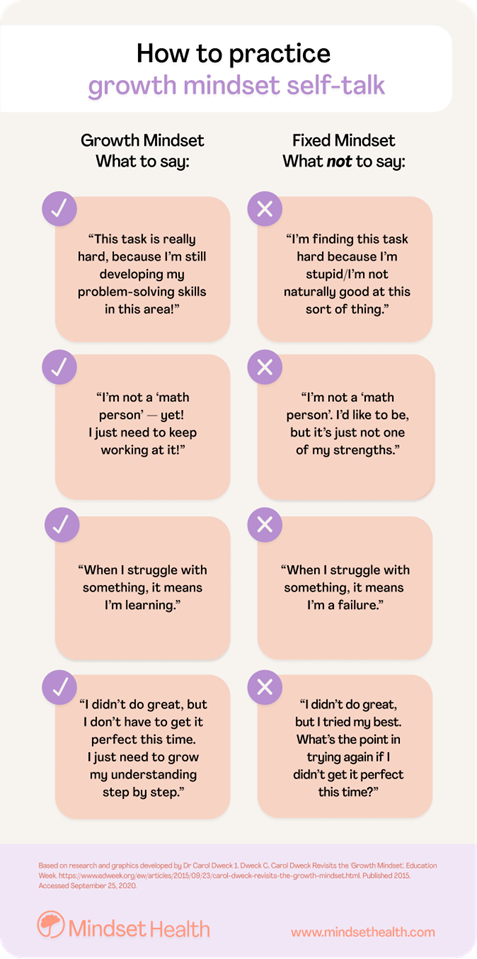
3. The process should be rewarded.
Although society frequently honors people who achieve exceptional results, this might be counterproductive to a growth attitude. Rather, commend the process and the effort put forward. Dr. Carol Dweck’s research found that rewarding effort over outcomes boosted performance in a math game.
4. Gather feedback
Make an effort to get feedback on your work. Individuals are motivated to keep going when they are given progressive feedback on what they did well and where they can improve. Feedback is also linked to a happy dopamine response and aids in the development of a growth mindset.
5. Get out of your comfort zone
Having the courage to step outside of your comfort zone can aid in the development of a growth mentality. When faced with a challenge, select the more difficult alternative to allow you to progress.
Accept failure as part of the process
Failure, setbacks, and early perplexity are all part of the learning curve! Consider occasional ‘failures’ as valuable learning opportunities while trying something new, and try to enjoy the process of discovery along the way.
Final Thoughts
The growth mindset holds that intelligence and ability may be developed through hard work and learning. Setbacks are a crucial part of the learning process for growth-minded people, and they bounce back from ‘failure’ by putting in more effort. This mindset helps you to be more motivated while also helping you to reach your full potential. According to the limited data from neuroscience, those with a growth mindset have more active brains than those with a fixed mindset, especially in areas related to error correction and learning.
Executive Summary
Chapter 1: Growth Mindset
A growth mindset is a way of thinking about life and learning that prepares you to realize your full potential. Nothing about the human experience is fixed, according to research and wisdom ranging from Buddhist wisdom to cutting-edge neuroscience. This covers things like your personality, intelligence, and how you react to circumstances.
Formal schooling is at the heart of much of the study on the growth mindset. But it has a broad application, touching on the very core of life’s university, the everyday possibilities for learning and progress that are always present for those with the willingness and bravery to notice them.
This course manual will show you how to lay the groundwork, nourish the soil, and sow the seeds that will allow you to reach your maximum potential. A growth mindset is vital whether you want to become more self-aware, increase your productivity, ignite your success, love more, build your business, or enhance your abilities.
Carol Dweck: the growth mindset guru
Without mentioning Stanford psychologist Carol Dweck, it’s impossible to describe the growth mindset. Mindset: The New Psychology of Success, her groundbreaking book, gave a comprehensive explanation of it, based on a large body of scientific research and insights gained over two decades of effort.
Carol Dweck’s research is straightforward yet profound: one’s thinking determines a large part of one’s performance. Regardless of talent or skill, how you perceive your abilities has a significant impact on outcomes. You’re more likely to struggle if you believe you’re stupid and useless. However, if you begin to believe in your own potential and capability, the outcomes will follow.
According to Dweck’s research, your fundamental outlook on life may be altered. Because attitude affects so many parts of how you interact with the world, it has a significant impact on all facets of your life. The good news is that a growth mindset can be developed with a little work and a desire to improve.
Neuroplasticity: the neuroscience of the growth mindset
The physical structure of the brain reflects the concept of a growth mindset. Years ago, it was thought that the brain was permanently fixed. However, thanks to the development of neuroscience, this viewpoint has changed. The term “neuroplasticity” was coined in 1948 to describe how the brain constantly grows, alters, and adapts in response to new information.
“Neurons that fire together, wire together,” as the expression goes. Synapses are structures that allow neurons to communicate using electrochemical impulses. During the learning or repetition of a task, certain brain “pathways” are stimulated. These circuits in the brain strengthen with time, changing its structure.
From the moment you are born to the moment you die, your brain is always developing and evolving. Nothing about you is fixed, which serves as a great metaphor for the concept of growth. The potential of the brain to “alter in response to experience, repeated stimuli, environmental signals, and learning” is explained by experience-dependent neuroplasticity, for example.
Surprisingly, one study identified a neuroscientific link between the brain regions associated with growth mindset and intrinsic motivated behaviors. Author Betsy Ng explains, “Growth mindset is related to brain processes, and brain processes are related to motivated behaviors.” “By instilling a growth mindset, people will see the inherent worth of a task and self-regulate their behavior to complete it.”
The significance of a growth mindset in being the person you want to be
“Your personality isn’t permanent. The most successful people in the world base their identity and internal narrative on their future, not their past.” – Benjamin Hardy
A growth mindset, according to Carol Dweck, “can determine whether you become the person you want to be and whether you accomplish the things you value.” That’s a major deal, and it’s backed up by a lot of studies. It is a crucial foundation for all forms of self-development in my opinion.
Although Dweck’s work examines growth mindsets through the lens of success, she is quick to point out that there is no such thing as failure when you approach life as an opportunity to learn. This mindset sees every event as an opportunity to learn something new. This is one of the most liberating perspectives on life.
A word of caution: growth mindsets do not imply instantaneous change. Keep an eye out for small improvements over time, and be nice to yourself in the process. Human progress is cyclical, so don’t get discouraged if things don’t seem to be going your way.
There is a paradox of growth in that, in order to reach your full potential, you must accept where you are now and build from there. Trying to go away from who you are, or striving to improve in order to be more lovable, really stifles growth. Perfectionism is reduced, not enhanced, by cultivating the correct mindset.

Chapter 2: Intention Sets the Course
“Everyone has busy, stress-filled, hectic lives; you barely have time to grab a cup of coffee in the morning, so you think there’s no way you have time to set a daily intention each morning, and that’s precisely why you need to,” says Melissa Maxx, a certified mindfulness coach. “If you don’t set an intention, you let the day determine your mood, rather than taking control and determining how you want the day to be.”
Simply said, an intention is a goal or purpose that you intend to accomplish – and paying more attention to your intentions can help you achieve incredible things in your life.
“Intention setting is empowering,” says Maxx. “Instead of feeling like a victim of circumstance, you become the conscious creators of your days and your life.”
Setting intentions has numerous advantages, but it’s not as simple as wishing on a star or concentrating on what you want. Here’s how to set your intentions the right way:
The Benefits of Setting Intentions
According to Jason Frishman, Psy.D., “intention setting” may sound woo-woo or like something you’d only do at the start of a yoga session, but it’s fundamental to anyone with objectives — aka most any human being. “As you learn and commit to your goals, intention becomes the very first step in achieving them.”
“Setting an intention is the initiation, the first step into your preferred story,” he says. “Particularly if your intention is solidly aligned with your values, then you have a powerful tool for moving forward and achieving your desires.” Regular statements of intention also allow you to change courses or adjust the path if needed, he says.
Intentions might be big (think: everlasting) or tiny (think: short-term; for the next day or even the next hour). In either case, they must be explicit and actionable, according to Frishman. (It’s similar to setting objectives using the “SMART” method.)
They may also be emotional, adds Sara Weand, L.P.C., licensed dialectical behavior therapy therapist and counselor. “Intentions involve the emotions you hope and intend to feel about a particular thing or situation in the future,” she says. “When you set an intention, it provides accountability and allows you to take control of your personal choices and life. It’s about being proactive in your own life, by purposely choosing how you want to live it.”
She claims that creating intentions allows you to actively live your life with meaning. You do this by becoming more present in both your personal life and your interpersonal relationships.
“When setting an intention, it’s like laying the foundation for what you’d like to have, feel, and experience versus just being a passive participant going through the motions,” she explains. “Intentions provide you with the opportunity to actively participate in your life the way you want to live it.”
So how, exactly, do you set intentions for the greatest chance at success? We will cover this in Course Manual 2.
What Is the Difference Between Intent and Impact, and Why Does It Matter?
Misunderstandings are unavoidable in everyday life. Whether it’s their approach to grocery shopping or how they handle dispute with a coworker, everyone has a unique perspective, lived experience, and set of biases that drive their actions.
People frequently try to justify their behavior by citing their motives, while others may have a quite different view of the overall consequence of their activities.
At best, this can result in a little misunderstanding. However, in rare circumstances, the gap between someone’s goal and the actual impact of their actions might result in considerable conflict.
While the distinction between intent and impact is frequently discussed in conflict resolution and trauma-informed care, it also comes up in everyday interactions and disputes.

Chapter 3: Three-part brain
Did you realize you have three brains? That’s right, you read that correctly. You have three brains: one in your head, one in your heart, and one in your gut. The three brains are similar to an orchestra, with billions of neurons working together to create a harmonious symphony — harnessing an ever-changing network of neurons that function in unison.
Various actions within and across the huge communication networks are synchronized by oscillations induced by impulses from the three brains. The oscillations work together to guarantee that all components are able to perform their functions at the appropriate times, similar to how a conductor generates order among a vast number of instruments in an orchestra. Our three brains, on the other hand, stop working correctly when synchronization fails.
The Role of the Three Brains
Although the brains of the head, heart, and gut work together, they have distinct physical functions and perform distinct mental and emotional functions.
• Information is analyzed and logic is applied by the head brain.
• Emotions and feelings are how the heart brain senses the world.
• The gut brain is responsible for determining our identity and place in the world. The gut brain also teaches us self-preservation by educating us to trust our instincts — that “gut feeling” that we all have from time to time.
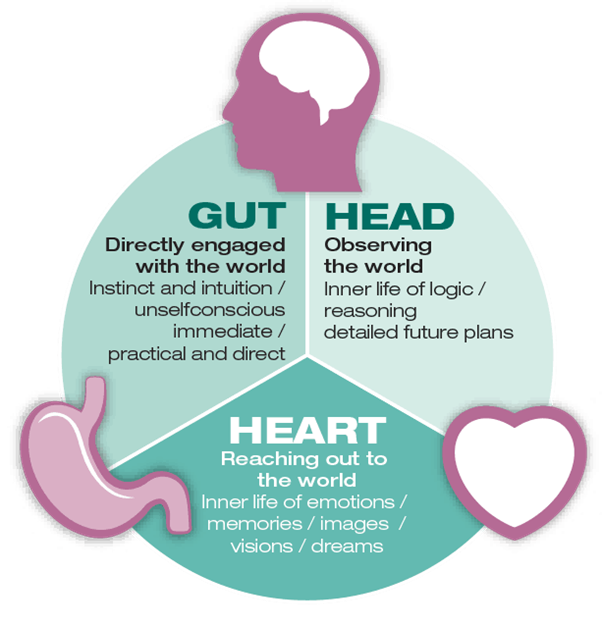
Source: www.naturalfactors.com
The Three Brains: Mind to Destiny
You were undoubtedly informed as a child that you only had one brain that controlled everything. You may have heard that the brain has two sides, one on the left and one on the right, as you grew older. Perhaps you learned about the Limbic System in early high school science class when discussing smells and memories. The ‘core’ three brains that make up the fundamental physiological processes of your mind will be discussed, as well as how they are connected to interpret events, guard you from threats, stressors, and generally catalog what experiences are good and bad for your overall survival.
Much of the information presented here originates from well-reviewed sources, particularly in the field of neuroscience. The majority of everything you’ll read below will be centered on the deliberate rebuilding of your brain in order to positively influence your life.
To frame your mentality, I recommend heading into this course manual with a question: How can you move from being a victim of circumstance and pre-conditioned behavior to being the creator of your own joy and success?
The Three Brains
The core infrastructure underpinning everything you think, feel, and believe is made up of three brains. Some of the functions in these three brains are within your immediate control, while others happen without your knowledge, sensation, or consent. The psychological order for what we’ll talk about more technically when we go deeper is:
Thinking – Doing – Being
This is a sequence of your being that has been at work in your life without you ever realizing it, and it has been constantly reinforced by the events that have either been placed in front of you or that you’ve sought out.
The technical names for each of these brains are:
• The Neocortex
• The Limbic or Mammalian Brain
• The Cerebellum is Reptilian Brain
In this course manual, we will discuss these regions of the brain and how each of the three sections affects how we establish a growth mindset.

Chapter 4: Basic Human Needs
Why do we behave the way we do? Why do we prize attention and status as indicators of success and value, but frown on complacency? What power is responsible for all of our feelings, activities, quality of life, and, eventually, our fates?
Did you know that understanding about human needs may explain all of the answers to these questions?
The inability to consistently address these essential demands is the root of all dysfunctional behaviors. People’s needs, on the other hand, aren’t just behind bad judgments – they’re also behind all of humanity’s great achievements. Understanding your own needs and psychology can help you not only avoid harmful behaviors and routines, but also achieve your objectives.
How do we develop our core needs?
Each of us is unique, shaped by our personal life experiences and emotions. Many of our fundamental desires emerge throughout childhood, when our minds are absorbing as much information as possible. This knowledge, whether good or bad, shapes our views and values, which in turn shape our entire universe. Stress has also been shown to have long-term consequences on brain chemistry and development in children.
Each of us prioritizes our needs differently, and our choices are influenced by the needs we prioritize first. While human wants are deep-seated, keep in mind that until you live there, your past is not your future. You can choose to meet your needs in a healthy way while also bringing balance to your life by honing your capacity to meet them all equally.
One of the most well-known theories of motivation is Abraham Maslow’s hierarchy of needs. According to Maslow’s hypothesis, our activities are driven by physiological requirements. It’s commonly depicted as a need pyramid, with the most fundamental demands at the bottom and more complex needs at the top.
What Is Maslow’s Hierarchy of Needs?
Abraham Maslow first introduced the concept of a hierarchy of needs in his 1943 paper titled “A Theory of Human Motivation,” and again in his subsequent book, Motivation and Personality. People are motivated to meet basic needs before moving on to more complex needs, according to this hierarchy.
While several existing schools of thought at the time, such as psychoanalysis and behaviorism, focused on undesirable behaviors, Maslow was more interested in discovering what makes individuals happy and what they do to reach that goal.
Maslow, a humanist, thought that people had an inborn need to be self-actualized, or to be the best version of themselves. However, in order to attain this ultimate goal, a number of more basic requirements must be met. Food, safety, love, and self-esteem are all necessities.
These needs, according to Maslow, are akin to instincts and play a significant role in motivating behavior.
There are five different levels of Maslow’s hierarchy of needs, which we will discuss in this course manual.

Chapter 5: Self-Esteem & Self-Efficacy
Everyone has a sense of self. Our experiences in life, as well as our judgments and assessments of ourselves, determine whether we have a positive or negative sense of self. There wouldn’t be anything to talk about if our self-evaluation was always correct. The issue is that our image of ourselves is frequently flawed.
This perspective can be skewed by previous experiences. For example, a person who grew up in a perfectionistic home may see herself as constantly falling short of the family’s standards. As a result, she sees herself as a failure, no matter how successful she is.
“How foolish!” or “What a dork!” could be spoken to a boy who is often picked on by his elder brothers. He might start to trust the labels he’s been given. People who believe in specific labels, unfortunately, typically live up to, or down to, those titles. The labels have the potential to produce a self-fulfilling expectation. He assumes he is foolish and never tries to prove differently.
What is self-concept?
The self-concept is a precise account of how you see yourself. This description may not be an exact representation of you if your perception is flawed, but it IS an accurate statement of what you believe about yourself.
Self-esteem and self-efficacy are the foundations of self-concept. A person’s self-concept may be tilted in the direction of a negative description if they have poor self-esteem. Some components of one’s self-concept may be entirely factual, such as “I have a college education” or “I don’t dance,” with no assessment of whether or not they are good or bad.
In fact, persons who have high self-esteem and self-efficacy are more likely to accept their limitations without feeling judged. “I don’t have a good sense of direction,” for example, might be simply stated without implying any positive or negative feelings.
What is self-esteem?
The admiration or respect a person has for himself or herself is known as self-esteem. Self-esteem is a term used to describe a person’s positive thoughts about themselves. However, self-esteem can refer to very specific areas as well as a general feeling about the self. For instance, a person may have low self-esteem regarding physical attractiveness and high self-esteem about ability to do a job well.
What is self-efficacy?
A person’s self-efficacy is their belief in their capacity to achieve a certain goal or task. It usually corresponds to an individual’s sense of competence. Competence varies depending on the situation. For example, a person may be extremely capable at competing in a specific sport but not of speaking in front of a group. As a result, total self-efficacy, which assesses an individual’s general sense of competence across a number of situations or tasks, may not be completely accurate.

Chapter 6: PERMA model of human flourishing
Humans have been striving for happiness since the beginning of time.
However, the term “happy” is notoriously difficult to define.
Happiness conjures up images of living the good life, flourishing, self-actualization, joy, and meaning. Is it possible to have any of these feelings in the midst of a chaotic world and bad circumstances? Can we learn to improve or develop talents that will help us achieve this “happy life”?

This course manual will outline the PERMA+ model and the theory of wellbeing, and provide practical ways to apply its components in your career or personal life.
What Is Seligman’s PERMA+ Model?
With his criteria of a self-actualized individual, Abraham Maslow (1962) was one of the first in the area of psychology to characterize “wellbeing.” The PERMA model, which specifies the attributes of a flourishing individual, and Wellbeing Theory (WBT) are both foreshadowed by the concept of self-actualization.
In his inaugural address as the incoming president of the American Psychological Association in 1998, Dr. Martin Seligman shifted the focus away from mental illness and pathology and toward exploring what is good and beneficial in life. Positive psychology therapies that help make life worth living, as well as how to define, quantify, and generate wellbeing, have been the focus of theories and research since this period (Rusk & Waters, 2015).
In developing a theory to address this, Seligman (2012) selected five components that people pursue because they are intrinsically motivating and they contribute to wellbeing. These elements are pursued for their own sake and are defined and measured independently of each other (Seligman, 2012).
WBT differs from other theories of wellbeing in that the five components include both eudaimonic and hedonic components.
These five elements or components (PERMA; Seligman, 2012) are:
• Positive emotion
• Engagement
• Relationships
• Meaning
• Accomplishments
The PERMA model makes up WBT, where each dimension works in concert to give rise to a higher order construct that predicts the flourishing of groups, communities, organizations, and nations (Forgeard, Jayawickreme, Kern, & Seligman, 2011).
Each of the PERMA components has been proven to have strong positive connections with physical health, energy, job satisfaction, life satisfaction, and organizational commitment in studies (Kern, Waters, Alder, & White, 2014).
In addition, PERMA is a better predictor of psychological distress than earlier distress ratings (Forgeard et al., 2011). This suggests that proactively addressing the PERMA components improves aspects of wellbeing while also reducing psychological suffering.

Chapter 7: Illness/Wellness Continuum
Understanding the illness wellness continuum
Wellness is more than just the absence of illness. It’s critical to understand how to achieve optimum wellbeing in order to live your best life.
The National Wellness Institute’s Illness-Wellness Continuum posits that wellbeing is more than just whether or not you have symptoms of an illness. It refers to one’s mental, emotional, and physical well-being.
We frequently associate health with visible conditions such as disease, injuries, or disability. But what about anxiety and despair, as well as other hidden aspects of our lives that affect our general health and well-being?
This continuum is a sliding scale on which we are continually shifting. On the right, you’ll find optimum health and wellbeing, while on the left, you’ll find illness and death. One can keep moving towards the positive end of the spectrum by increasing awareness, education, and growth.
Dimensions of wellness
You may notice fewer or more dimensions depending on where you look. According to the National Wellness Institute, there are six dimensions:
1. Emotional Wellness? – the awareness and acceptance of your feelings and emotions and how you cope with relationships and life in general.
2. Occupational Wellness – the idea of enriching your life through work that aligns with your values and is fulfilling and rewarding.
3. Physical Wellness – how you care for yourself through what you eat and drink, ensuring you are sleeping enough, and exercising.
4. Social Wellness – how you contribute to your community and interact with others.
5. Intellectual Wellness – keeping your brain stimulated by engaging in challenging and creative activities.
6. Spiritual Wellness – to discover your meaning of life and using your beliefs and values to live a life with purpose.
Stages on the wellness continuum
The ultimate goal as you progress along the spectrum is to improve your mental, bodily, and spiritual well-being so that you can reach your maximum potential.
A neutral zone separates the stages on this journey. As you go toward sickness, you will encounter signs, symptoms, and impairment. You pass through awareness, education, and progress on your route to high-level wellness.
Throughout your life, and even day to day, you can travel up and down this spectrum.
How does it work
You should practice behaviors that assist you advance along the positive road in your daily life.
You must be in a good frame of mind to live your life to its utmost potential. The body cannot perform at its optimum if it is in a state of physical or emotional illness.
As you work toward wellness, many aspects of your life can improve, including your physical health and relationships.
Newton’s First Law of Motion, which states that a body in motion stays in motion, is presumably familiar to you. The same is true when it comes to achieving wellness. When one aspect of your life improves, it inspires you to make other positive adjustments that benefit your entire health.
how can you apply it to your everyday life
You can make your way along the wellness continuum by taking a series of small steps. The following are simple things you may gradually incorporate into your life to aid with each aspect of wellness:
• Eating well by adding in wholesome nutritious food to your diet.
• Get your body moving every day.
• Practice meditating.
• Try activities that challenge you and make you step out of your comfort zone.
• Do caring acts for others.
• Practice mindfulness.
• Make sure your circle is filled with people who contribute positively to your life.
• If you belong to a church, participate in activities.
• Rest well! Shoot for at least 7-8 hours of sleep every night.
• Try to limit how often you are on social media.
• Pick up a new hobby.
Common questions
What are the five health stages that form the wellness continuum?
The 5 stages along the continuum are disability, symptoms, awareness, education, and growth.
What are the two categories that make up the wellness continuum?
Premature mortality is at the extreme of the illness spectrum, and high level wellness is at the end of the wellness spectrum.
What are the six dimensions of wellness?
Emotional Wellness, Occupational Wellness, Physical Wellness, Social Wellness, Intellectual Wellness, and Spiritual Wellness are the 6 dimensions.
Is there such a thing as a health-illness continuum?
The health illness, illness-wellness, and health continuum are all terms used to describe the wellness continuum. All of these words are used to describe the same thing.

Chapter 8: Positivity-Focused
Positive thinking: Stop negative self-talk to reduce stress
Positive thinking helps with stress management and can even improve your health.
Do you see your glass as half-full or half-empty? How you respond to this age-old question about positive thinking may reflect your outlook on life, your attitude toward yourself, and whether you’re optimistic or pessimistic — and it could even have an impact on your health.
Indeed, some research suggests that personality qualities like optimism and pessimism might have an impact on a variety of aspects of your health and well-being. Positive thinking, which is often associated with optimism, is an important component of good stress management. And effective stress management is linked to a slew of health advantages. Don’t worry if you’re a pessimist; positive thinking abilities may be learned.
Understanding positive thinking and self-talk
Positive thinking does not imply that you disregard the unpleasant aspects of life. Positive thinking simply means approaching unpleasant situations in a more positive and productive manner. You expect the best, not the worst, to happen.
Self-talk is a common starting point for positive thinking. The unending stream of unsaid thoughts that go through your head is known as self-talk. These thoughts might be either pleasant or negative. Logic and reason play a role in some of your self-talk. Other self-talk may stem from misunderstandings you acquire as a result of a lack of facts or expectations based on previous notions about what might happen.
If the majority of your thoughts are negative, you are more likely to have a pessimistic attitude on life. If you think largely positively, you’re probably an optimist, or someone who believes in positive thinking.
The health benefits of positive thinking
The impacts of positive thinking and optimism on health are still being studied by researchers. Positive thinking may provide the following health benefits:
• Increased life span
• Lower rates of depression
• Lower levels of distress and pain
• Greater resistance to illnesses
• Better psychological and physical well-being
• Better cardiovascular health and reduced risk of death from cardiovascular disease and stroke
• Reduced risk of death from cancer
• Reduced risk of death from respiratory conditions
• Reduced risk of death from infections
• Better coping skills during hardships and times of stress
It’s unclear why those who practice positive thinking have such good health. According to one theory, having a positive mindset helps you cope better with stressful events, reducing the negative health impacts of stress on your body.
Positive and optimistic people are also regarded to have healthier lifestyles, as they engage in more physical exercise, eat a healthier diet, and don’t smoke or drink excessively.

Chapter 9: Strengths-Based
The strengths-based approach is both a complement and a counterbalance to the deficit-based approach. And strengths-based development allows us to spend more time developing and stretching our strengths rather than hammering out our flaws and deficiencies.
What is strengths-based development and how does it vary from deficit development?
We have been swimming in a sea of negativity since birth. We are surrounded with guidance and diktats on how we should and shouldn’t behave from the moment we are born, based on others’ deeply held convictions about what is wrong and what is right.
We are also neurologically predisposed to focus on risk and danger considerably more than on pleasant stimuli, according to research. This combination creates the ideal environment for a negative internal conversation to emerge from a young age. This ‘inner critic,’ which we all have, will tell us that we need to improve, that we need to be stronger, faster, smarter, more, and different. Finally, our inner critic tells us that we are inadequate, that we aren’t good enough.
And because we’re so focused on avoiding the bad stuff, working on it, improving it, or running away or hiding from it, when we come across something positive in ourselves – a quality, skill, trait, or talent, something that we naturally find easy or that we’re good at – we often don’t notice it at all. As a result, we overlook the positive or downplay its significance. Our inner critic is continuously reminding us to concentrate on the far more significant issue of what isn’t good enough.
As a result, most of us greatly underbake the opportunity to focus on what we’re naturally good at – our strengths – to turn them from good to outstanding, to advance from competence to mastery, at school, at home, and at work. All because of the natural human negativity bias, which is exacerbated by negative external feedback. Bring on the strengths-based strategy, especially strengths-based development.
All elements of our lives — school, home, and work – resonate with strengths-based development. It signals a shift back to focusing on the good and improving in areas where we are naturally strong. This course manual will concentrate on strengths-based development, why it is important, and how we may devote more of our time to it.
Growth mindset’s critical significance in strengths-based development
If you have a growth mindset, you’re more likely to appreciate difficulties, despite the danger, because you value learning and growth more than any fears you might have about people thinking you’re incompetent. And, because you’re eager to try new things, you frequently don’t know what you’re doing, at least at first, but you don’t see this as a danger; rather, you see it as an opportunity to learn and improve at something you could appreciate.
Any fixed mindset worries and anxieties might be amplified with strengths-based learning and development since you’re moving into a space where you’re owning that you have strengths and that you’re choosing to work on them in order to become even better in those areas. The inner critic voices of fixed mindsetters may now be saying things like, ‘well, you’re setting yourself up to fail here, aren’t you?’, ‘you don’t want to come across as bigheaded or arrogant by declaring you’ve got all these strengths, do you?’, and so on.
As a result, you should be aware that working on enhancing and expanding your talents can cause discomfort and worry before things return to normal. Stick with the discomfort since it’s where you’ll learn the most and have the most fun.

Chapter 10: Cognitive Biases
What Is Cognitive Bias?
Have you ever been so engrossed in your phone conversation that you miss the fact that the light has gone green and it is your turn to cross the street?
Have you ever exclaimed, “I knew it was going to happen!” after your favorite baseball team loses after blowing a big lead in the ninth inning?
Have you ever found yourself just reading news reports that bolster your own point of view?
These are only a handful of the many examples of cognitive bias that we encounter on a daily basis. But, before we get into these various biases, let’s take a step back and clarify what bias is.
A cognitive bias is a mental error that causes you to misinterpret information from the environment, affecting the logic and correctness of your decisions and judgments. Biases are unconscious, automatic processes that speed up and improve the efficiency of decision-making. Heuristics (mental shortcuts), societal pressures, and emotions, for example, can all contribute to cognitive biases.
Bias is a tendency to favor or oppose a person, group, concept, or item, usually in an unjust way. Biases are natural — they’re a part of our makeup — and they don’t only live in our heads; they have an impact on how we make decisions and act.
Biases are divided into two categories in psychology: conscious and unconscious biases. You are aware of your attitudes and the behaviors that emerge from them when you have conscious bias, also known as explicit bias.
Explicit bias can be beneficial since it gives you a feeling of self and helps you make smart judgments (for example, being biased towards healthy foods).
However, when these biases manifest themselves as conscious stereotyping, they can be extremely hazardous.
Unconscious bias, also known as cognitive bias, refers to a set of unintentional biases in which you are unaware of your attitudes and the behaviors that emerge from them.
We get around 11 million bits of information each second, but we can only analyze about 40 bits per second, thus cognitive bias is often the product of your brain’s attempt to simplify information processing.
As a result, we frequently rely on mental shortcuts (also known as heuristics) to help us make sense of the world quickly. As a result, these errors are frequently caused by issues with thinking, such as memory, attention, and other mental errors.
Unconscious biases, like conscious prejudices, can be useful because they don’t involve much mental effort and allow you to make decisions fast. However, much like conscious biases, unconscious biases can also be destructive prejudice that harms an individual or a group.
And, while it may appear that unconscious bias has recently increased, particularly in the context of police violence and the Black Lives Matter movement, this is not a new phenomena.
The History of Cognitive Bias: A Crash Course
Israeli psychologists Amos Tversky and Daniel Kahneman created the term “cognitive bias” in the 1970s to explain people’s erroneous habits of thinking in response to judgment and decision issues.
The heuristics and biases study program of Tversky and Kahneman looked into how people make decisions with limited resources (for example, limited time to decide which food to eat or limited information to decide which house to buy).
People are compelled to rely on heuristics, or rapid mental shortcuts, to help them make judgments as a result of their limited resources.
Tversky and Kahneman sought to know more about the unique biases that come with this type of assessment and decision-making.
To do so, the two researchers used a research paradigm in which participants were given with a reasoning issue with a computed normative response (they used probability theory and statistics to compute the expected answer).
The actual responses of the participants were then compared to the prepared solution to uncover the consistent mental aberrations.
The researchers were able to detect several norm breaches that occur when our minds rely on these cognitive biases to make decisions and judgements after conducting several tests involving a large number of reasoning issues.

Chapter 11: Limiting Beliefs
If you go back to your earliest childhood recollections, you’re sure to recall times when you were fearless, when your curiosity led you to places you’d never dare to go now.
As you grew older, though, you were bombarded with a never-ending litany of rules about what you should say, how you should act, and what you should do. As a result, you’ve probably developed limiting beliefs and may not have reached your full potential.
While you must follow some standards, it is critical that you do not limit yourself from living a complete life.
This course manual will show you how to recognize and overcome your limiting beliefs.
What Are Limiting Beliefs?
Have you ever said something to the effect of “I’m not good at arithmetic” or “I have two left feet and could never be a decent dancer”? These are examples of limiting beliefs that trap you in a box you created for yourself and often define you incorrectly.
A limiting belief is a state of mind, conviction, or belief that you hold to be true and that you believe to be true, but that confines you in some way. This limiting idea could be about yourself, your interactions with others, or the world and how it functions.
Limiting beliefs can have a variety of harmful consequences. They may prevent you from making good decisions, taking new chances, or realizing your full potential. Limiting beliefs can keep you caught in a negative mindset and prevent you from enjoying the life you really want.
Causes of Limiting Beliefs
Do you know what generates limiting beliefs now that you know what they are? What are their origins, and how have they influenced your life choices?
Some claim that individuals aren’t wired to be open-minded since our biases lead us to seek out only good and agreeable information.
Aside from inherent biases and an incapacity to be open-minded, there are other factors that contribute to restricting views. You’ll find a handful that may strike a chord with you below.
Family Beliefs
Your parents most certainly tried to instill principles and ideals in you as a child. These were frequently based on their own family’s views and ideals about how you and the world should be. It could be things like choosing a job route, how to act, and how to interact with others.
Based on the views they established in you, you may develop your own limiting beliefs. Your parents, for example, may instill in you the attitude that authority should never be questioned.
As a result, you may assume that unjust treatment from persons in positions of authority must be accepted rather than contested. It’s possible that you won’t be able to notice this conduct.
Education
Education also has a significant impact in the formation of limiting beliefs. Whether you learn from your parents, school, or friends, they all have an influence on what you believe to be true. This is due to the fact that they are both in positions of power and are constantly exchanging information, ideas, and views about how the world works.
When you’re learning from someone you respect, you’re more likely to believe what they’re telling you is true.
Experiences
It is typical for people to draw conclusions after making decisions or having life experiences. If you fell in love and it ends in heartbreak, for example, you might assume that love is always painful.
Negative events, in particular, can have a significant impact on your limiting beliefs. It’s critical to remember that the conclusions you reach following terrible situations are only relevant for a limited time.

Chapter 12: Leadership: Process Feedback
The Importance of Feedback
Any leader’s skill set must include the ability to give and receive feedback. This is a talent that project managers, team leaders, teachers, and coaches develop over the course of their careers. It is critical to not only give but also receive feedback in order to effectively share knowledge within teams and organizations. Let’s take a closer look at its worth and see how we can improve our ability to deliver it.
Constructive feedback is a powerful tool for fostering a positive work atmosphere, increasing productivity and engagement, and improving performance. It has a favorable impact on communication, team member engagement, and teamwork outcomes in a variety of industries. This is how it works for various processes:
• The importance of feedback in the workplace is hard to overestimate: sharing information on what can and needs to be improved helps optimize the work process and get things done in less time.
• Feedback is extremely beneficial to leadership and communication because it clarifies the image and enhances transparency.
• Feedback is critical in education and learning since it aids in the faster adoption of new information and the avoidance of common errors.
• The same can be said for feedback in sports and coaching: it aids in the development of new skills and the attainment of improved results.
Constructive criticism in the workplace is critical: for a company to succeed and thrive, it must have effective communication. Feedback not only boosts employee morale, but it also teaches us more about ourselves, our strengths and shortcomings, our behaviors, and how our actions effect others. It also improves our self-awareness and promotes personal growth.
It is not always necessary for feedback to be positive. Negative criticism identifies areas where we need to improve, allowing us to improve our job in the long term. However, it is critical that you provide feedback in a skillful and productive manner; otherwise, there would be no basis for progress.
It goes without saying that providing good, constructive feedback is challenging, so I’ll explain how to do it and what the key advantages are. This course manual will also provide you with some examples of constructive feedback words to utilize at work.
Curriculum
Cultivating Potential – Workshop 2 – Growth Foundation
- Growth Mindset
- Intention Sets the Course
- Three-Part Brain
- Basic Human Needs
- Self-Esteem & Self-Efficacy
- PERMA Model of Human Flourishing
- Illness/Wellness Continuum
- Positivity-Focused
- Strengths-Based
- Cognitive Biases
- Limiting Beliefs
- Leadership: Process Feedback
Distance Learning
Introduction
Welcome to Appleton Greene and thank you for enrolling on the Cultivating Potential corporate training program. You will be learning through our unique facilitation via distance-learning method, which will enable you to practically implement everything that you learn academically. The methods and materials used in your program have been designed and developed to ensure that you derive the maximum benefits and enjoyment possible. We hope that you find the program challenging and fun to do. However, if you have never been a distance-learner before, you may be experiencing some trepidation at the task before you. So we will get you started by giving you some basic information and guidance on how you can make the best use of the modules, how you should manage the materials and what you should be doing as you work through them. This guide is designed to point you in the right direction and help you to become an effective distance-learner. Take a few hours or so to study this guide and your guide to tutorial support for students, while making notes, before you start to study in earnest.
Study environment
You will need to locate a quiet and private place to study, preferably a room where you can easily be isolated from external disturbances or distractions. Make sure the room is well-lit and incorporates a relaxed, pleasant feel. If you can spoil yourself within your study environment, you will have much more of a chance to ensure that you are always in the right frame of mind when you do devote time to study. For example, a nice fire, the ability to play soft soothing background music, soft but effective lighting, perhaps a nice view if possible and a good size desk with a comfortable chair. Make sure that your family know when you are studying and understand your study rules. Your study environment is very important. The ideal situation, if at all possible, is to have a separate study, which can be devoted to you. If this is not possible then you will need to pay a lot more attention to developing and managing your study schedule, because it will affect other people as well as yourself. The better your study environment, the more productive you will be.
Study tools & rules
Try and make sure that your study tools are sufficient and in good working order. You will need to have access to a computer, scanner and printer, with access to the internet. You will need a very comfortable chair, which supports your lower back, and you will need a good filing system. It can be very frustrating if you are spending valuable study time trying to fix study tools that are unreliable, or unsuitable for the task. Make sure that your study tools are up to date. You will also need to consider some study rules. Some of these rules will apply to you and will be intended to help you to be more disciplined about when and how you study. This distance-learning guide will help you and after you have read it you can put some thought into what your study rules should be. You will also need to negotiate some study rules for your family, friends or anyone who lives with you. They too will need to be disciplined in order to ensure that they can support you while you study. It is important to ensure that your family and friends are an integral part of your study team. Having their support and encouragement can prove to be a crucial contribution to your successful completion of the program. Involve them in as much as you can.
Successful distance-learning
Distance-learners are freed from the necessity of attending regular classes or workshops, since they can study in their own way, at their own pace and for their own purposes. But unlike traditional internal training courses, it is the student’s responsibility, with a distance-learning program, to ensure that they manage their own study contribution. This requires strong self-discipline and self-motivation skills and there must be a clear will to succeed. Those students who are used to managing themselves, are good at managing others and who enjoy working in isolation, are more likely to be good distance-learners. It is also important to be aware of the main reasons why you are studying and of the main objectives that you are hoping to achieve as a result. You will need to remind yourself of these objectives at times when you need to motivate yourself. Never lose sight of your long-term goals and your short-term objectives. There is nobody available here to pamper you, or to look after you, or to spoon-feed you with information, so you will need to find ways to encourage and appreciate yourself while you are studying. Make sure that you chart your study progress, so that you can be sure of your achievements and re-evaluate your goals and objectives regularly.
Self-assessment
Appleton Greene training programs are in all cases post-graduate programs. Consequently, you should already have obtained a business-related degree and be an experienced learner. You should therefore already be aware of your study strengths and weaknesses. For example, which time of the day are you at your most productive? Are you a lark or an owl? What study methods do you respond to the most? Are you a consistent learner? How do you discipline yourself? How do you ensure that you enjoy yourself while studying? It is important to understand yourself as a learner and so some self-assessment early on will be necessary if you are to apply yourself correctly. Perform a SWOT analysis on yourself as a student. List your internal strengths and weaknesses as a student and your external opportunities and threats. This will help you later on when you are creating a study plan. You can then incorporate features within your study plan that can ensure that you are playing to your strengths, while compensating for your weaknesses. You can also ensure that you make the most of your opportunities, while avoiding the potential threats to your success.
Accepting responsibility as a student
Training programs invariably require a significant investment, both in terms of what they cost and in the time that you need to contribute to study and the responsibility for successful completion of training programs rests entirely with the student. This is never more apparent than when a student is learning via distance-learning. Accepting responsibility as a student is an important step towards ensuring that you can successfully complete your training program. It is easy to instantly blame other people or factors when things go wrong. But the fact of the matter is that if a failure is your failure, then you have the power to do something about it, it is entirely in your own hands. If it is always someone else’s failure, then you are powerless to do anything about it. All students study in entirely different ways, this is because we are all individuals and what is right for one student, is not necessarily right for another. In order to succeed, you will have to accept personal responsibility for finding a way to plan, implement and manage a personal study plan that works for you. If you do not succeed, you only have yourself to blame.
Planning
By far the most critical contribution to stress, is the feeling of not being in control. In the absence of planning we tend to be reactive and can stumble from pillar to post in the hope that things will turn out fine in the end. Invariably they don’t! In order to be in control, we need to have firm ideas about how and when we want to do things. We also need to consider as many possible eventualities as we can, so that we are prepared for them when they happen. Prescriptive Change, is far easier to manage and control, than Emergent Change. The same is true with distance-learning. It is much easier and much more enjoyable, if you feel that you are in control and that things are going to plan. Even when things do go wrong, you are prepared for them and can act accordingly without any unnecessary stress. It is important therefore that you do take time to plan your studies properly.
Management
Once you have developed a clear study plan, it is of equal importance to ensure that you manage the implementation of it. Most of us usually enjoy planning, but it is usually during implementation when things go wrong. Targets are not met and we do not understand why. Sometimes we do not even know if targets are being met. It is not enough for us to conclude that the study plan just failed. If it is failing, you will need to understand what you can do about it. Similarly if your study plan is succeeding, it is still important to understand why, so that you can improve upon your success. You therefore need to have guidelines for self-assessment so that you can be consistent with performance improvement throughout the program. If you manage things correctly, then your performance should constantly improve throughout the program.
Study objectives & tasks
The first place to start is developing your program objectives. These should feature your reasons for undertaking the training program in order of priority. Keep them succinct and to the point in order to avoid confusion. Do not just write the first things that come into your head because they are likely to be too similar to each other. Make a list of possible departmental headings, such as: Customer Service; E-business; Finance; Globalization; Human Resources; Technology; Legal; Management; Marketing and Production. Then brainstorm for ideas by listing as many things that you want to achieve under each heading and later re-arrange these things in order of priority. Finally, select the top item from each department heading and choose these as your program objectives. Try and restrict yourself to five because it will enable you to focus clearly. It is likely that the other things that you listed will be achieved if each of the top objectives are achieved. If this does not prove to be the case, then simply work through the process again.
Study forecast
As a guide, the Appleton Greene Cultivating Potential corporate training program should take 12-18 months to complete, depending upon your availability and current commitments. The reason why there is such a variance in time estimates is because every student is an individual, with differing productivity levels and different commitments. These differentiations are then exaggerated by the fact that this is a distance-learning program, which incorporates the practical integration of academic theory as an as a part of the training program. Consequently all of the project studies are real, which means that important decisions and compromises need to be made. You will want to get things right and will need to be patient with your expectations in order to ensure that they are. We would always recommend that you are prudent with your own task and time forecasts, but you still need to develop them and have a clear indication of what are realistic expectations in your case. With reference to your time planning: consider the time that you can realistically dedicate towards study with the program every week; calculate how long it should take you to complete the program, using the guidelines featured here; then break the program down into logical modules and allocate a suitable proportion of time to each of them, these will be your milestones; you can create a time plan by using a spreadsheet on your computer, or a personal organizer such as MS Outlook, you could also use a financial forecasting software; break your time forecasts down into manageable chunks of time, the more specific you can be, the more productive and accurate your time management will be; finally, use formulas where possible to do your time calculations for you, because this will help later on when your forecasts need to change in line with actual performance. With reference to your task planning: refer to your list of tasks that need to be undertaken in order to achieve your program objectives; with reference to your time plan, calculate when each task should be implemented; remember that you are not estimating when your objectives will be achieved, but when you will need to focus upon implementing the corresponding tasks; you also need to ensure that each task is implemented in conjunction with the associated training modules which are relevant; then break each single task down into a list of specific to do’s, say approximately ten to do’s for each task and enter these into your study plan; once again you could use MS Outlook to incorporate both your time and task planning and this could constitute your study plan; you could also use a project management software like MS Project. You should now have a clear and realistic forecast detailing when you can expect to be able to do something about undertaking the tasks to achieve your program objectives.
Performance management
It is one thing to develop your study forecast, it is quite another to monitor your progress. Ultimately it is less important whether you achieve your original study forecast and more important that you update it so that it constantly remains realistic in line with your performance. As you begin to work through the program, you will begin to have more of an idea about your own personal performance and productivity levels as a distance-learner. Once you have completed your first study module, you should re-evaluate your study forecast for both time and tasks, so that they reflect your actual performance level achieved. In order to achieve this you must first time yourself while training by using an alarm clock. Set the alarm for hourly intervals and make a note of how far you have come within that time. You can then make a note of your actual performance on your study plan and then compare your performance against your forecast. Then consider the reasons that have contributed towards your performance level, whether they are positive or negative and make a considered adjustment to your future forecasts as a result. Given time, you should start achieving your forecasts regularly.
With reference to time management: time yourself while you are studying and make a note of the actual time taken in your study plan; consider your successes with time-efficiency and the reasons for the success in each case and take this into consideration when reviewing future time planning; consider your failures with time-efficiency and the reasons for the failures in each case and take this into consideration when reviewing future time planning; re-evaluate your study forecast in relation to time planning for the remainder of your training program to ensure that you continue to be realistic about your time expectations. You need to be consistent with your time management, otherwise you will never complete your studies. This will either be because you are not contributing enough time to your studies, or you will become less efficient with the time that you do allocate to your studies. Remember, if you are not in control of your studies, they can just become yet another cause of stress for you.
With reference to your task management: time yourself while you are studying and make a note of the actual tasks that you have undertaken in your study plan; consider your successes with task-efficiency and the reasons for the success in each case; take this into consideration when reviewing future task planning; consider your failures with task-efficiency and the reasons for the failures in each case and take this into consideration when reviewing future task planning; re-evaluate your study forecast in relation to task planning for the remainder of your training program to ensure that you continue to be realistic about your task expectations. You need to be consistent with your task management, otherwise you will never know whether you are achieving your program objectives or not.
Keeping in touch
You will have access to qualified and experienced professors and tutors who are responsible for providing tutorial support for your particular training program. So don’t be shy about letting them know how you are getting on. We keep electronic records of all tutorial support emails so that professors and tutors can review previous correspondence before considering an individual response. It also means that there is a record of all communications between you and your professors and tutors and this helps to avoid any unnecessary duplication, misunderstanding, or misinterpretation. If you have a problem relating to the program, share it with them via email. It is likely that they have come across the same problem before and are usually able to make helpful suggestions and steer you in the right direction. To learn more about when and how to use tutorial support, please refer to the Tutorial Support section of this student information guide. This will help you to ensure that you are making the most of tutorial support that is available to you and will ultimately contribute towards your success and enjoyment with your training program.
Work colleagues and family
You should certainly discuss your program study progress with your colleagues, friends and your family. Appleton Greene training programs are very practical. They require you to seek information from other people, to plan, develop and implement processes with other people and to achieve feedback from other people in relation to viability and productivity. You will therefore have plenty of opportunities to test your ideas and enlist the views of others. People tend to be sympathetic towards distance-learners, so don’t bottle it all up in yourself. Get out there and share it! It is also likely that your family and colleagues are going to benefit from your labors with the program, so they are likely to be much more interested in being involved than you might think. Be bold about delegating work to those who might benefit themselves. This is a great way to achieve understanding and commitment from people who you may later rely upon for process implementation. Share your experiences with your friends and family.
Making it relevant
The key to successful learning is to make it relevant to your own individual circumstances. At all times you should be trying to make bridges between the content of the program and your own situation. Whether you achieve this through quiet reflection or through interactive discussion with your colleagues, client partners or your family, remember that it is the most important and rewarding aspect of translating your studies into real self-improvement. You should be clear about how you want the program to benefit you. This involves setting clear study objectives in relation to the content of the course in terms of understanding, concepts, completing research or reviewing activities and relating the content of the modules to your own situation. Your objectives may understandably change as you work through the program, in which case you should enter the revised objectives on your study plan so that you have a permanent reminder of what you are trying to achieve, when and why.
Distance-learning check-list
Prepare your study environment, your study tools and rules.
Undertake detailed self-assessment in terms of your ability as a learner.
Create a format for your study plan.
Consider your study objectives and tasks.
Create a study forecast.
Assess your study performance.
Re-evaluate your study forecast.
Be consistent when managing your study plan.
Use your Appleton Greene Certified Learning Provider (CLP) for tutorial support.
Make sure you keep in touch with those around you.

Tutorial Support
Programs
Appleton Greene uses standard and bespoke corporate training programs as vessels to transfer business process improvement knowledge into the heart of our clients’ organizations. Each individual program focuses upon the implementation of a specific business process, which enables clients to easily quantify their return on investment. There are hundreds of established Appleton Greene corporate training products now available to clients within customer services, e-business, finance, globalization, human resources, information technology, legal, management, marketing and production. It does not matter whether a client’s employees are located within one office, or an unlimited number of international offices, we can still bring them together to learn and implement specific business processes collectively. Our approach to global localization enables us to provide clients with a truly international service with that all important personal touch. Appleton Greene corporate training programs can be provided virtually or locally and they are all unique in that they individually focus upon a specific business function. They are implemented over a sustainable period of time and professional support is consistently provided by qualified learning providers and specialist consultants.
Support available
You will have a designated Certified Learning Provider (CLP) and an Accredited Consultant and we encourage you to communicate with them as much as possible. In all cases tutorial support is provided online because we can then keep a record of all communications to ensure that tutorial support remains consistent. You would also be forwarding your work to the tutorial support unit for evaluation and assessment. You will receive individual feedback on all of the work that you undertake on a one-to-one basis, together with specific recommendations for anything that may need to be changed in order to achieve a pass with merit or a pass with distinction and you then have as many opportunities as you may need to re-submit project studies until they meet with the required standard. Consequently the only reason that you should really fail (CLP) is if you do not do the work. It makes no difference to us whether a student takes 12 months or 18 months to complete the program, what matters is that in all cases the same quality standard will have been achieved.
Support Process
Please forward all of your future emails to the designated (CLP) Tutorial Support Unit email address that has been provided and please do not duplicate or copy your emails to other AGC email accounts as this will just cause unnecessary administration. Please note that emails are always answered as quickly as possible but you will need to allow a period of up to 20 business days for responses to general tutorial support emails during busy periods, because emails are answered strictly within the order in which they are received. You will also need to allow a period of up to 30 business days for the evaluation and assessment of project studies. This does not include weekends or public holidays. Please therefore kindly allow for this within your time planning. All communications are managed online via email because it enables tutorial service support managers to review other communications which have been received before responding and it ensures that there is a copy of all communications retained on file for future reference. All communications will be stored within your personal (CLP) study file here at Appleton Greene throughout your designated study period. If you need any assistance or clarification at any time, please do not hesitate to contact us by forwarding an email and remember that we are here to help. If you have any questions, please list and number your questions succinctly and you can then be sure of receiving specific answers to each and every query.
Time Management
It takes approximately 1 Year to complete the Cultivating Potential corporate training program, incorporating 12 x 6-hour monthly workshops. Each student will also need to contribute approximately 4 hours per week over 1 Year of their personal time. Students can study from home or work at their own pace and are responsible for managing their own study plan. There are no formal examinations and students are evaluated and assessed based upon their project study submissions, together with the quality of their internal analysis and supporting documents. They can contribute more time towards study when they have the time to do so and can contribute less time when they are busy. All students tend to be in full time employment while studying and the Cultivating Potential program is purposely designed to accommodate this, so there is plenty of flexibility in terms of time management. It makes no difference to us at Appleton Greene, whether individuals take 12-18 months to complete this program. What matters is that in all cases the same standard of quality will have been achieved with the standard and bespoke programs that have been developed.
Distance Learning Guide
The distance learning guide should be your first port of call when starting your training program. It will help you when you are planning how and when to study, how to create the right environment and how to establish the right frame of mind. If you can lay the foundations properly during the planning stage, then it will contribute to your enjoyment and productivity while training later. The guide helps to change your lifestyle in order to accommodate time for study and to cultivate good study habits. It helps you to chart your progress so that you can measure your performance and achieve your goals. It explains the tools that you will need for study and how to make them work. It also explains how to translate academic theory into practical reality. Spend some time now working through your distance learning guide and make sure that you have firm foundations in place so that you can make the most of your distance learning program. There is no requirement for you to attend training workshops or classes at Appleton Greene offices. The entire program is undertaken online, program course manuals and project studies are administered via the Appleton Greene web site and via email, so you are able to study at your own pace and in the comfort of your own home or office as long as you have a computer and access to the internet.
How To Study
The how to study guide provides students with a clear understanding of the Appleton Greene facilitation via distance learning training methods and enables students to obtain a clear overview of the training program content. It enables students to understand the step-by-step training methods used by Appleton Greene and how course manuals are integrated with project studies. It explains the research and development that is required and the need to provide evidence and references to support your statements. It also enables students to understand precisely what will be required of them in order to achieve a pass with merit and a pass with distinction for individual project studies and provides useful guidance on how to be innovative and creative when developing your Unique Program Proposition (UPP).
Tutorial Support
Tutorial support for the Appleton Greene Cultivating Potential corporate training program is provided online either through the Appleton Greene Client Support Portal (CSP), or via email. All tutorial support requests are facilitated by a designated Program Administration Manager (PAM). They are responsible for deciding which professor or tutor is the most appropriate option relating to the support required and then the tutorial support request is forwarded onto them. Once the professor or tutor has completed the tutorial support request and answered any questions that have been asked, this communication is then returned to the student via email by the designated Program Administration Manager (PAM). This enables all tutorial support, between students, professors and tutors, to be facilitated by the designated Program Administration Manager (PAM) efficiently and securely through the email account. You will therefore need to allow a period of up to 20 business days for responses to general support queries and up to 30 business days for the evaluation and assessment of project studies, because all tutorial support requests are answered strictly within the order in which they are received. This does not include weekends or public holidays. Consequently you need to put some thought into the management of your tutorial support procedure in order to ensure that your study plan is feasible and to obtain the maximum possible benefit from tutorial support during your period of study. Please retain copies of your tutorial support emails for future reference. Please ensure that ALL of your tutorial support emails are set out using the format as suggested within your guide to tutorial support. Your tutorial support emails need to be referenced clearly to the specific part of the course manual or project study which you are working on at any given time. You also need to list and number any questions that you would like to ask, up to a maximum of five questions within each tutorial support email. Remember the more specific you can be with your questions the more specific your answers will be too and this will help you to avoid any unnecessary misunderstanding, misinterpretation, or duplication. The guide to tutorial support is intended to help you to understand how and when to use support in order to ensure that you get the most out of your training program. Appleton Greene training programs are designed to enable you to do things for yourself. They provide you with a structure or a framework and we use tutorial support to facilitate students while they practically implement what they learn. In other words, we are enabling students to do things for themselves. The benefits of distance learning via facilitation are considerable and are much more sustainable in the long-term than traditional short-term knowledge sharing programs. Consequently you should learn how and when to use tutorial support so that you can maximize the benefits from your learning experience with Appleton Greene. This guide describes the purpose of each training function and how to use them and how to use tutorial support in relation to each aspect of the training program. It also provides useful tips and guidance with regard to best practice.
Tutorial Support Tips
Students are often unsure about how and when to use tutorial support with Appleton Greene. This Tip List will help you to understand more about how to achieve the most from using tutorial support. Refer to it regularly to ensure that you are continuing to use the service properly. Tutorial support is critical to the success of your training experience, but it is important to understand when and how to use it in order to maximize the benefit that you receive. It is no coincidence that those students who succeed are those that learn how to be positive, proactive and productive when using tutorial support.
Be positive and friendly with your tutorial support emails
Remember that if you forward an email to the tutorial support unit, you are dealing with real people. “Do unto others as you would expect others to do unto you”. If you are positive, complimentary and generally friendly in your emails, you will generate a similar response in return. This will be more enjoyable, productive and rewarding for you in the long-term.
Think about the impression that you want to create
Every time that you communicate, you create an impression, which can be either positive or negative, so put some thought into the impression that you want to create. Remember that copies of all tutorial support emails are stored electronically and tutors will always refer to prior correspondence before responding to any current emails. Over a period of time, a general opinion will be arrived at in relation to your character, attitude and ability. Try to manage your own frustrations, mood swings and temperament professionally, without involving the tutorial support team. Demonstrating frustration or a lack of patience is a weakness and will be interpreted as such. The good thing about communicating in writing, is that you will have the time to consider your content carefully, you can review it and proof-read it before sending your email to Appleton Greene and this should help you to communicate more professionally, consistently and to avoid any unnecessary knee-jerk reactions to individual situations as and when they may arise. Please also remember that the CLP Tutorial Support Unit will not just be responsible for evaluating and assessing the quality of your work, they will also be responsible for providing recommendations to other learning providers and to client contacts within the Appleton Greene global client network, so do be in control of your own emotions and try to create a good impression.
Remember that quality is preferred to quantity
Please remember that when you send an email to the tutorial support team, you are not using Twitter or Text Messaging. Try not to forward an email every time that you have a thought. This will not prove to be productive either for you or for the tutorial support team. Take time to prepare your communications properly, as if you were writing a professional letter to a business colleague and make a list of queries that you are likely to have and then incorporate them within one email, say once every month, so that the tutorial support team can understand more about context, application and your methodology for study. Get yourself into a consistent routine with your tutorial support requests and use the tutorial support template provided with ALL of your emails. The (CLP) Tutorial Support Unit will not spoon-feed you with information. They need to be able to evaluate and assess your tutorial support requests carefully and professionally.
Be specific about your questions in order to receive specific answers
Try not to write essays by thinking as you are writing tutorial support emails. The tutorial support unit can be unclear about what in fact you are asking, or what you are looking to achieve. Be specific about asking questions that you want answers to. Number your questions. You will then receive specific answers to each and every question. This is the main purpose of tutorial support via email.
Keep a record of your tutorial support emails
It is important that you keep a record of all tutorial support emails that are forwarded to you. You can then refer to them when necessary and it avoids any unnecessary duplication, misunderstanding, or misinterpretation.
Individual training workshops or telephone support
Please be advised that Appleton Greene does not provide separate or individual tutorial support meetings, workshops, or provide telephone support for individual students. Appleton Greene is an equal opportunities learning and service provider and we are therefore understandably bound to treat all students equally. We cannot therefore broker special financial or study arrangements with individual students regardless of the circumstances. All tutorial support is provided online and this enables Appleton Greene to keep a record of all communications between students, professors and tutors on file for future reference, in accordance with our quality management procedure and your terms and conditions of enrolment. All tutorial support is provided online via email because it enables us to have time to consider support content carefully, it ensures that you receive a considered and detailed response to your queries. You can number questions that you would like to ask, which relate to things that you do not understand or where clarification may be required. You can then be sure of receiving specific answers to each individual query. You will also then have a record of these communications and of all tutorial support, which has been provided to you. This makes tutorial support administration more productive by avoiding any unnecessary duplication, misunderstanding, or misinterpretation.
Tutorial Support Email Format
You should use this tutorial support format if you need to request clarification or assistance while studying with your training program. Please note that ALL of your tutorial support request emails should use the same format. You should therefore set up a standard email template, which you can then use as and when you need to. Emails that are forwarded to Appleton Greene, which do not use the following format, may be rejected and returned to you by the (CLP) Program Administration Manager. A detailed response will then be forwarded to you via email usually within 20 business days of receipt for general support queries and 30 business days for the evaluation and assessment of project studies. This does not include weekends or public holidays. Your tutorial support request, together with the corresponding TSU reply, will then be saved and stored within your electronic TSU file at Appleton Greene for future reference.
Subject line of your email
Please insert: Appleton Greene (CLP) Tutorial Support Request: (Your Full Name) (Date), within the subject line of your email.
Main body of your email
Please insert:
1. Appleton Greene Certified Learning Provider (CLP) Tutorial Support Request
2. Your Full Name
3. Date of TS request
4. Preferred email address
5. Backup email address
6. Course manual page name or number (reference)
7. Project study page name or number (reference)
Subject of enquiry
Please insert a maximum of 50 words (please be succinct)
Briefly outline the subject matter of your inquiry, or what your questions relate to.
Question 1
Maximum of 50 words (please be succinct)
Maximum of 50 words (please be succinct)
Question 3
Maximum of 50 words (please be succinct)
Question 4
Maximum of 50 words (please be succinct)
Question 5
Maximum of 50 words (please be succinct)
Please note that a maximum of 5 questions is permitted with each individual tutorial support request email.
Procedure
* List the questions that you want to ask first, then re-arrange them in order of priority. Make sure that you reference them, where necessary, to the course manuals or project studies.
* Make sure that you are specific about your questions and number them. Try to plan the content within your emails to make sure that it is relevant.
* Make sure that your tutorial support emails are set out correctly, using the Tutorial Support Email Format provided here.
* Save a copy of your email and incorporate the date sent after the subject title. Keep your tutorial support emails within the same file and in date order for easy reference.
* Allow up to 20 business days for a response to general tutorial support emails and up to 30 business days for the evaluation and assessment of project studies, because detailed individual responses will be made in all cases and tutorial support emails are answered strictly within the order in which they are received.
* Emails can and do get lost. So if you have not received a reply within the appropriate time, forward another copy or a reminder to the tutorial support unit to be sure that it has been received but do not forward reminders unless the appropriate time has elapsed.
* When you receive a reply, save it immediately featuring the date of receipt after the subject heading for easy reference. In most cases the tutorial support unit replies to your questions individually, so you will have a record of the questions that you asked as well as the answers offered. With project studies however, separate emails are usually forwarded by the tutorial support unit, so do keep a record of your own original emails as well.
* Remember to be positive and friendly in your emails. You are dealing with real people who will respond to the same things that you respond to.
* Try not to repeat questions that have already been asked in previous emails. If this happens the tutorial support unit will probably just refer you to the appropriate answers that have already been provided within previous emails.
* If you lose your tutorial support email records you can write to Appleton Greene to receive a copy of your tutorial support file, but a separate administration charge may be levied for this service.

How To Study
Your Certified Learning Provider (CLP) and Accredited Consultant can help you to plan a task list for getting started so that you can be clear about your direction and your priorities in relation to your training program. It is also a good way to introduce yourself to the tutorial support team.
Planning your study environment
Your study conditions are of great importance and will have a direct effect on how much you enjoy your training program. Consider how much space you will have, whether it is comfortable and private and whether you are likely to be disturbed. The study tools and facilities at your disposal are also important to the success of your distance-learning experience. Your tutorial support unit can help with useful tips and guidance, regardless of your starting position. It is important to get this right before you start working on your training program.
Planning your program objectives
It is important that you have a clear list of study objectives, in order of priority, before you start working on your training program. Your tutorial support unit can offer assistance here to ensure that your study objectives have been afforded due consideration and priority.
Planning how and when to study
Distance-learners are freed from the necessity of attending regular classes, since they can study in their own way, at their own pace and for their own purposes. This approach is designed to let you study efficiently away from the traditional classroom environment. It is important however, that you plan how and when to study, so that you are making the most of your natural attributes, strengths and opportunities. Your tutorial support unit can offer assistance and useful tips to ensure that you are playing to your strengths.
Planning your study tasks
You should have a clear understanding of the study tasks that you should be undertaking and the priority associated with each task. These tasks should also be integrated with your program objectives. The distance learning guide and the guide to tutorial support for students should help you here, but if you need any clarification or assistance, please contact your tutorial support unit.
Planning your time
You will need to allocate specific times during your calendar when you intend to study if you are to have a realistic chance of completing your program on time. You are responsible for planning and managing your own study time, so it is important that you are successful with this. Your tutorial support unit can help you with this if your time plan is not working.
Keeping in touch
Consistency is the key here. If you communicate too frequently in short bursts, or too infrequently with no pattern, then your management ability with your studies will be questioned, both by you and by your tutorial support unit. It is obvious when a student is in control and when one is not and this will depend how able you are at sticking with your study plan. Inconsistency invariably leads to in-completion.
Charting your progress
Your tutorial support team can help you to chart your own study progress. Refer to your distance learning guide for further details.
Making it work
To succeed, all that you will need to do is apply yourself to undertaking your training program and interpreting it correctly. Success or failure lies in your hands and your hands alone, so be sure that you have a strategy for making it work. Your Certified Learning Provider (CLP) and Accredited Consultant can guide you through the process of program planning, development and implementation.
Reading methods
Interpretation is often unique to the individual but it can be improved and even quantified by implementing consistent interpretation methods. Interpretation can be affected by outside interference such as family members, TV, or the Internet, or simply by other thoughts which are demanding priority in our minds. One thing that can improve our productivity is using recognized reading methods. This helps us to focus and to be more structured when reading information for reasons of importance, rather than relaxation.
Speed reading
When reading through course manuals for the first time, subconsciously set your reading speed to be just fast enough that you cannot dwell on individual words or tables. With practice, you should be able to read an A4 sheet of paper in one minute. You will not achieve much in the way of a detailed understanding, but your brain will retain a useful overview. This overview will be important later on and will enable you to keep individual issues in perspective with a more generic picture because speed reading appeals to the memory part of the brain. Do not worry about what you do or do not remember at this stage.
Content reading
Once you have speed read everything, you can then start work in earnest. You now need to read a particular section of your course manual thoroughly, by making detailed notes while you read. This process is called Content Reading and it will help to consolidate your understanding and interpretation of the information that has been provided.
Making structured notes on the course manuals
When you are content reading, you should be making detailed notes, which are both structured and informative. Make these notes in a MS Word document on your computer, because you can then amend and update these as and when you deem it to be necessary. List your notes under three headings: 1. Interpretation – 2. Questions – 3. Tasks. The purpose of the 1st section is to clarify your interpretation by writing it down. The purpose of the 2nd section is to list any questions that the issue raises for you. The purpose of the 3rd section is to list any tasks that you should undertake as a result. Anyone who has graduated with a business-related degree should already be familiar with this process.
Organizing structured notes separately
You should then transfer your notes to a separate study notebook, preferably one that enables easy referencing, such as a MS Word Document, a MS Excel Spreadsheet, a MS Access Database, or a personal organizer on your cell phone. Transferring your notes allows you to have the opportunity of cross-checking and verifying them, which assists considerably with understanding and interpretation. You will also find that the better you are at doing this, the more chance you will have of ensuring that you achieve your study objectives.
Question your understanding
Do challenge your understanding. Explain things to yourself in your own words by writing things down.
Clarifying your understanding
If you are at all unsure, forward an email to your tutorial support unit and they will help to clarify your understanding.
Question your interpretation
Do challenge your interpretation. Qualify your interpretation by writing it down.
Clarifying your interpretation
If you are at all unsure, forward an email to your tutorial support unit and they will help to clarify your interpretation.
Qualification Requirements
The student will need to successfully complete the project study and all of the exercises relating to the Cultivating Potential corporate training program, achieving a pass with merit or distinction in each case, in order to qualify as an Accredited Cultivating Potential Specialist (ACPS). All monthly workshops need to be tried and tested within your company. These project studies can be completed in your own time and at your own pace and in the comfort of your own home or office. There are no formal examinations, assessment is based upon the successful completion of the project studies. They are called project studies because, unlike case studies, these projects are not theoretical, they incorporate real program processes that need to be properly researched and developed. The project studies assist us in measuring your understanding and interpretation of the training program and enable us to assess qualification merits. All of the project studies are based entirely upon the content within the training program and they enable you to integrate what you have learnt into your corporate training practice.
Cultivating Potential – Grading Contribution
Project Study – Grading Contribution
Customer Service – 10%
E-business – 05%
Finance – 10%
Globalization – 10%
Human Resources – 10%
Information Technology – 10%
Legal – 05%
Management – 10%
Marketing – 10%
Production – 10%
Education – 05%
Logistics – 05%
TOTAL GRADING – 100%
Qualification grades
A mark of 90% = Pass with Distinction.
A mark of 75% = Pass with Merit.
A mark of less than 75% = Fail.
If you fail to achieve a mark of 75% with a project study, you will receive detailed feedback from the Certified Learning Provider (CLP) and/or Accredited Consultant, together with a list of tasks which you will need to complete, in order to ensure that your project study meets with the minimum quality standard that is required by Appleton Greene. You can then re-submit your project study for further evaluation and assessment. Indeed you can re-submit as many drafts of your project studies as you need to, until such a time as they eventually meet with the required standard by Appleton Greene, so you need not worry about this, it is all part of the learning process.
When marking project studies, Appleton Greene is looking for sufficient evidence of the following:
Pass with merit
A satisfactory level of program understanding
A satisfactory level of program interpretation
A satisfactory level of project study content presentation
A satisfactory level of Unique Program Proposition (UPP) quality
A satisfactory level of the practical integration of academic theory
Pass with distinction
An exceptional level of program understanding
An exceptional level of program interpretation
An exceptional level of project study content presentation
An exceptional level of Unique Program Proposition (UPP) quality
An exceptional level of the practical integration of academic theory
Preliminary Analysis
Research Article
The Neuroscience of Growth Mindset and Intrinsic Motivation
By Brain Sciences, Published online 2018 Jan 26.
“Abstract
Our actions can be triggered by intentions, incentives or intrinsic values. Recent neuroscientific research has yielded some results about the growth mindset and intrinsic motivation. With the advances in neuroscience and motivational studies, there is a global need to utilize this information to inform educational practice and research. Yet, little is known about the neuroscientific interplay between growth mindset and intrinsic motivation. This paper attempts to draw on the theories of growth mindset and intrinsic motivation, together with contemporary ideas in neuroscience, outline the potential for neuroscientific research in education. It aims to shed light on the relationship between growth mindset and intrinsic motivation in terms of supporting a growth mindset to facilitate intrinsic motivation through neural responses. Recent empirical research from the educational neuroscience perspective that provides insights into the interplay between growth mindset and intrinsic motivation will also be discussed.
1. Introduction
With an emphasis on inquiry and scientific skills, students are encouraged to discover, produce and evaluate knowledge, using inquiry and scientific skills [1]. Such inquiry learning should be structured in a way that student learning is facilitated, while encouraging students to plan and conduct their own investigation. An autonomy-supportive environment facilitates autonomous learning, and fosters self-determined motivation in students [2]. Students learn to synthesize contradictory perspectives and rise to intellectual meta-levels of thinking, which is a crucial trait for the 21st-century operating environment [3]. As such, it is fundamental to nurture the young generation in becoming adaptive, self-regulated and self-determined.
In the 21st century, there has been a strong proliferation of research on growth mindset and intrinsic motivation in learning. The constructs of mindset and motivation have been important foci among educators seeking to positively impact student learning and outcomes. The underlying mechanism for students to have their own agency in finding out new knowledge is intrinsic motivation. However, much of this research has relied on quantitative approaches for assessing students’ self-reports on motivational regulations and learning outcomes [4,5]. Some of these quantitative findings are used to generalize across school settings. Although the multiple facets of student motivation and learning have been identified in quantitative analyses, they have not provided a detailed understanding of students’ motivational processes. Neuroscience methods may offer new insights regarding students’ motivation and learning processes.
Most neuroscience studies have focused on research related to cognitive functions, such as attention, memory and decision-making. In addition to these cognitive studies, there is also the implicit nature of mindsets that lead to the malleability of self-attributes (e.g., intelligence) [6]. Subtle feedback and messages related to growth mindset can have noticeable effects on students’ attitudes and motivation that may transfer to long-term outcomes. Likewise, human motivation is important, as it is one’s intrinsic desire to learn and obtain information. Growth mindset is the belief that intelligence can be nurtured through learning and effort, while intrinsic motivation is the volition to engage in a task for inherent satisfaction. Individuals with growth mindset believe that motivation can be nurtured, and that extrinsic motivation can be internalized (i.e., from extrinsic regulation to integrated regulation that is similar to intrinsically motivated behavior). In an integrative view, growth mindset and intrinsic motivation are important and interrelated, thus raising fundamental questions about the neural mechanisms of mindset-motivation interaction. The links among growth mindset, brain and motivation are important to academic performance. Therefore, it is important to draw on neuroscientific findings to show the way the brain is motivated, and how it learns by changing mindset (i.e., from a fixed to a growth mindset). Such intervention studies are still not common, and there is potential in these research areas.
This paper reviews the theoretical frameworks of growth mindset and intrinsic motivation, and how they are linked to neuroscientific evidence. It also reviews a number of recent neuroscience studies related to growth mindset and intrinsic motivation. It is important to survey the progress of neuroscience research on growth mindset and intrinsic motivation, as understanding the neural substrates will provide insights into human motivation and drive. Neuroscience research has the potential to support and refine models of motivation and cognitive skill. It may play a pivotal role in developing classroom interventions and understanding non-cognitive skills (e.g., mindset). Knowing the key brain regions that are associated with growth mindset and intrinsic motivation, researchers and practitioners could work together to investigate the granular processes of motivation in relation to growth mindset.
Most empirical research on growth mindset and intrinsic motivation has focused on behavioral methods and self-reports of experiences. There is little information about the internal processes of motivation at a higher level of resolution. It is, therefore, relevant and timely to examine the existing literature and empirical research that is associated with intrinsic motivation. Neuroscientific evidence has the potential to uncover new insights and refine the conceptual ideas of intrinsic motivation by articulating the granular processes of motivation that behavioral methods alone cannot afford. This paper offers recommendations for potential neuroscience research in studying growth mindset and intrinsic motivation.
2. Growth Mindset
Growth mindset is defined as a belief that construes intelligence as malleable and improvable [6]. Students with growth mindset are likely to learn by a mastery approach, embrace challenges and put in effort to learn. For instance, growth-minded individuals perceive task setbacks as a necessary part of the learning process and they “bounce back” by increasing their motivational effort [7,8]. One recent study on elementary students showed that leveraging an online educational game (the BrainPOP website) with in-game rewards can promote a growth mindset by directly incentivizing effort and encouraging persistence in low performing students [7]. Learners with growth mindset tend to embrace lifelong learning and the joy of incremental personal growth. In addition, they do not see their intelligence or personality as fixed traits. They will mobilize their learning resources without being defeated by the threat of failure. This paper aims to provide some insights into the cultivation of resilience and mastery in university students, preparing them to overcome challenges in the real working world.
Empirical studies have revealed that growth mindset has positive effects on student motivation and academic performance [9,10]. Recent research has also shown that mindset is related to student outcomes and behaviors including academic achievement, engagement, and willingness to attempt new challenges [11,12]. Numerous studies have shown the effects of growth mindset interventions on students’ achievement at all ages. According to Dweck [9], teaching growth mindset to junior high school students resulted in increased motivation and better academic achievement. Her findings revealed that students in the growth mindset intervention group outperformed those in the control group (who received excellent training in study skills), indicating improved learning and desire to work hard. The growth mindset intervention teaches students that intelligence is not a fixed quality [13]. Intelligence can be nurtured through challenging tasks, as intelligence grows with hard work on challenging problems. A growth mindset intervention was especially impactful with student outcomes in particular subjects such as science and mathematics [14].
An individual with a growth mindset works hard and improves without an incentive reward in mind as the outcome. The conceptualization of growth mindset is similar to that of intrinsic motivation. A learner with a growth mindset tends to self-regulate their own learning and has the propensity to cope with academic tasks. Hence, encouraging a growth mindset can improve the academic performance of college students [14,15] and middle school math students [9].
Most of the abovementioned empirical studies reported the utility of questionnaires or self-report measures. There is still limited neuroscientific research on the neural mechanism of growth mindset. It is, therefore, important to examine data from other means such as neuroscientific information about how the brain changes with experience of learning and how it is associated to growth mindset. The subsequent sections will discuss the neuroscientific evidence of growth mindset.”
To continue reading this research article, please visit: www.ncbi.nlm.nih.gov

Research Article
The effects of a growth mindset on self-efficacy and motivation
By Emily Rhew, Jody S. Piro, Pauline Goolkasian & Particia Cosentino, 06/11/2017
“ABSTRACT
The purpose of this study was to investigate whether a growth mindset intervention would improve adolescent special education students’ self-efficacy and motivation. The sample included sixth, seventh, and eighth grade students receiving learning disability services in the area of reading. The study was quasi-experimental in design which included both a comparison group and a treatment group. The treatment group received a growth mindset intervention called Brainology. The Reader Self-Perception Scale 2nd Edition and the Motivation for Reading Questionnaire were used to measure whether there were differences in the mean scores for self-efficacy and motivation in reading. Results suggested that a growth mindset intervention had a significant difference in the motivation, but not self-efficacy, of adolescent special education participants.
PUBLIC INTEREST STATEMENT
The purpose of this study was to investigate whether a growth mindset intervention called Brainology would improve adolescent special education students’ self-efficacy and motivation. The sample included sixth, seventh, and eighth grade students receiving learning disability services in the area of reading in the United States. The treatment group received a growth mindset intervention called Brainology and the comparison group did not. Results suggested that a growth mindset intervention had a significant difference in the motivation, but not the self-efficacy, of adolescent special education participants.
The National Assessment of Educational Progress results and high-school dropout rates (Uline & Johnson, 2005) have suggested that some special education students experience low academic performance in the United States. For example, the University of New Hampshire’s Institute on Disability (2013) documented 78,653 students who identified as needing special education services who dropped out of school in the United States between 2010 and 2011. Identifying the causes of nonsuccess has been problematic because low academic performance among students with special needs is influenced by several different factors (Rumberger, 2001).
Students who repeatedly fail to achieve become fearful of new challenges and devastated by setbacks (Dweck, 1999, 2006). Finding alternative methods to improve self-efficacy and motivation while facilitating the academic success of special education students may decrease the dropout rate. Dweck’s (2006) research indicated that students’ beliefs in fixed intelligence might raise their concerns about aptitude while also increasing their anxiety when being challenged. As a result, those students attribute their failures to intelligence, which reinforced a defensive and helpless behavior, worsening their performance. Students with a fixed-intelligence mindset may feel threatened at the notion of their flaws being unmasked because they believe their flaws result in failures. Therefore, they might be unwilling to attempt challenging tasks (Dweck, 1999, 2006). A belief that intelligence was malleable and could improve with effort created a desire for learning, and obstacles were viewed as a natural part of learning (Dweck, 1999). Improving the mindset of special education students may have a positive, long-lasting impact on students’ learning and performance (Dweck, 2006).
Because of the rigorous expectations associated with the Common Core State Standards, shared standards adopted by many states in the United States, and high-stakes standardized assessments, all students are required to successfully master difficult concepts. Following the implementation of the Common Core State Standards, the gap widened between students who have reading difficulties and their peers. According to Burris and Aja (2014), students with disabilities of all nationalities, income levels, and backgrounds experienced plunging achievement scores in 2012. In fifth grade, 75% of students with disabilities scored “Below Standard” on the English Language Arts and Literacy Common Core tests. Tabassam and Granger (2002) found that students with disabilities scored drastically lower scores in academic self-efficacy than peers without a disability.
In educational contexts, success is often attributed to high capability and hard work, and failure is credited to low capability and lack of trying (Weiner, 1985). However, students with special needs frequently attributed their failure to internal causes (Bryan, 1986). Consequently, students with special needs may perceive that lack of success in school indicates an inability to succeed academically, or that it is proof that they did not exert enough effort to achieve. Though there is some research that examined the relationship between self-efficacy, motivation, and achievement following students receiving a growth mindset intervention (Saunders, 2013), there is limited research on how growth mindset interventions support adolescent special education students.
1. Related literature
1.1. Mindset
Dweck (1999) explored why certain students enjoyed learning, even though the work was difficult, while other students were anxious or unwilling to attempt tasks that appeared challenging. She developed a theory of mindset with a spectrum ranging from the fixed mindset to the growth mindset. The spectrum illustrated how people could have different mindsets—fixed or growth—toward varying areas within their lives. For example, students with a fixed mindset toward their ability to complete academic tasks may simultaneously experience a growth mindset toward their ability to play baseball. Students with a fixed mindset deem intelligence as a factor that cannot be changed (Dweck, 1999, 2006; Mueller & Dweck, 1998). Normally, students with a fixed mindset saw their failures, whether academic or not, as a reflection of their intelligence. Even more debilitating for students was the combination of exerting effort and still enduring failure; this blend left the fixed mindset students with no other excuse for their failure except perceived lack of intelligence (Dweck, 2006).
Students with a fixed mindset characteristically ignore constructive feedback and feel threatened by the success of their peers (Saunders, 2013). They may blame outside factors for their failure. For instance, if they failed a test, fixed mindset students might blame teachers by suggesting, “They did not teach us that,” or, “That was not on the study guide.” As a result, students with a fixed mindset tended to believe that their failure was not due to their lack of skill or determination, but rather the result of other people’s actions (Dweck, 2006).
Conversely, students with a growth mindset believed that intelligence was malleable and could change, and through their failures, they learned and grew. Belief in the importance of effort permitted students with a growth mindset to view failure as a motivator that drove them to continue learning (Blackwell, Trzesniewski, & Dweck, 2007; Plaks & Stecher, 2007). Eventually, growth mindset students’ persistence and desire to persevere resulted in success (Dweck, 1999, 2006). Furthermore, students with a growth mindset used constructive feedback to improve and learned from the success of others (Saunders, 2013). Dweck (2006) found student improvement even when the feedback was negative. Students with a growth mindset did not blame outside factors for their failures, and they looked for ways to improve on the subsequent assessments. Boosting students’ self-esteem through praise did not improve students’ motivation and academic success. Feedback from teachers could “convey messages that affect students’ opinion of themselves, their motivation, and their achievement” (Dweck, 2006, p. 207). Furthermore, the praise might be interpreted as an indication that their teacher did not perceive that students were capable of accomplishing more (Dweck, 1999).
Hartmann (2013) suggested that special education students tended to possess a more fixed mindset compared to their typical peers. Students requiring special education assistance for a specific learning disability did not achieve with the same propensity as their typical peers (Frederickson, Simmonds, Evans, & Soulsby, 2007). These students were accustomed to receiving failing or otherwise unacceptable grades (Hartmann, 2013). When educators or parents instilled the idea that students were measured by their accomplishments, the students further surmised that they were measured by their failures and tended to focus on their performance rather than on knowledge acquisition (Hartmann, 2013).
1.2. Self-efficacy
Psychologist Albert Bandura (1986) described self-efficacy as a belief in one’s own ability to be successful in particular circumstances. Self-efficacy attitudes governed how prospects and hindrances were observed and affected not only people’s choices, but how much they were willing to strive and persist until they were successful (Bandura, 1997). An individual’s self-efficacy was built upon past successes, especially ones that challenged the individual and were overcome with abundant effort. Otherwise, failures easily shattered an individual’s sense of self-efficacy, especially if the individual only achieved accomplishments effortlessly (Bandura, 1995).
In addition, if individuals with a growth mindset observed others succeeding at a task, they perceived that they had the potential to be successful. When individuals with a fixed mindset observed others failing at a task or if individuals were given negative verbal feedback about their ability to achieve, these individuals put forth less effort or would not attempt the task at hand (Bandura, 1995).
Academic self-efficacy significantly affected students’ success at the secondary level and in higher-education coursework. “Self-efficacy beliefs have shown convergent validity in influencing such key indices of academic motivation as choice of activities, level of effort, persistence, and emotional reactions” (Zimmerman, 2000, p. 86). Therefore, students who had greater levels of academic self-efficacy were more likely to work harder to complete a challenging task. Students with high academic self-efficacy tended to be eager to participate in an activity, persevered through trials, and had fewer emotional frustrations or negative feelings when they were not successful than students who had lower academic self-efficacy (Zimmerman, 2000).
For students with special education needs, low self-efficacy could be a barrier to academic success. Past performance was considered the most powerful element in fostering self-efficacy. Subsequently, special education students who experienced repeated academic failures or difficulties were likely to have lower self-efficacy (Hampton, 1996). Special education students with low self-efficacy may be less willing to attempt a challenging task and to sustain effort (Hampton, 1996). This outcome may reinforce the poor perceptions that special education students maintained about their academic abilities.
Special education students may dedicate significantly more time and effort to achieve the same results as their typical peers. As a result, when students who have a learning disability observe that they must put in extra effort, they experienced a lowered sense of self-efficacy (Bergen, 2013). Having both low self-efficacy and a disability is a “dangerous dynamic” because it was essential for special education students to have increased perseverance to meet the same standards as their typical peers (Bergen, 2013, p. 1). Klassen (2007) studied special education students and found that, while adolescent special education students were highly confident in their performance in a specific academic domain, they were completely unaware that they were performing poorly. Klassen (2007) asserted that teachers could address this miscalibration of efficacy and low self-efficacy.
Self-efficacy was an essential component to students’ ability to complete daily classroom activities, perform well on standardized assessments, and succeed overall in school (Pajares & Schunk, 2001). “Compared with students who doubt their learning capabilities, those who feel efficacious for learning or performing a task participate more readily, work harder, persist longer when they encounter difficulties, and achieve at a higher level” (Pajares & Schunk, 2001, p. 2–3). Self-efficacy “makes a difference in how people feel, think and act” (Schwarzer, 2014, p. 1). For instance, low self-efficacy caused feelings of depression and anxiety as well as an overall feeling of helplessness (Schwarzer, 2014). Klassen, Krawchuk, and Rajani (2008) found that undergraduate students with lower self-efficacy had significantly lower GPAs and higher tendencies to procrastinate on daily academic work.
Students with more of a growth mindset characteristically had higher levels of self-efficacy than students with more of a fixed mindset (Dweck & Master, 2009). Furthermore, students with a growth mindset were usually willing to participate and persevere in a task and to put forth additional effort (Urdan & Turner, 2005). Thus, students with a growth mindset were likely to have had high academic self-efficacy and persisted through challenging tasks, resulting in academic achievement (Dweck, 2009). Encouragement or praise from others increased a student’s self-efficacy. When praise focused on effort, strategies, and overcoming obstacles, students learned to believe they could accomplish challenging tasks (Dweck, 2009). The manner in which educators discussed success, failure, and challenges with students had a strong effect on increasing self-efficacy (The Scientific Foundation for Mindset, 2015).”
To continue reading this research article, please visit: www.tandfonline.com
Research Paper

What Can Be Learned from Growth Mindset Controversies?
By David S. Yeager and Carol S. Dweck
“Abstract
The growth mindset is the belief that intellectual ability can be developed. This article seeks to answer recent questions about growth mindset, such as: Does a growth mindset predict student outcomes? Do growth mindset interventions work, and work reliably? Are the effect sizes meaningful enough to merit attention? And can teachers successfully instill a growth mindset in students? After exploring the important lessons learned from these questions, the article concludes that large-scale studies, including pre-registered replications and studies conducted by third parties (such as international governmental agencies), justify confidence in growth mindset research. Mindset effects, however, are meaningfully heterogeneous across individuals and contexts. The article describes three recent advances that have helped the field to learn from this heterogeneity: standardized measures and interventions, studies designed specifically to identify where growth mindset interventions do not work (and why), and a conceptual framework for anticipating and interpreting moderation effects. The next generation of mindset research can build on these advances, for example, to begin to understand and perhaps change classroom contexts in ways that can make interventions more effective. Throughout, the authors reflect on lessons that can enrich meta-scientific perspectives on replication and generalization.
A growth mindset is the belief that personal characteristics, such as intellectual abilities, can be developed, and a fixed mindset is the belief that these characteristics are fixed and unchangeable (Dweck, 1999; Dweck & Leggett, 1988; Yeager & Dweck, 2012). Research on these mindsets has found that people who hold more of a growth mindset are more likely to thrive in the face of difficulty and continue to improve, while those who hold more of a fixed mindset may shy away from challenges or fail to meet their potential (see Dweck & Yeager, 2019). There has been considerable interest among researchers, policymakers, and educators in the use of growth mindset research to improve educational outcomes, in part because research on mindsets has yielded effective, scalable interventions. For instance, the National Study of Learning Mindsets (NSLM; Yeager, 2019) evaluated a short (<1hr), online growth mindset intervention in a nationally representative sample of 9th graders in the U.S. (N = 12,490). Compared to the control condition, the intervention improved grades for lower-achieving students and improved the rate at which students overall chose and stayed in harder math classes (Yeager, Hanselman, Walton, et al., 2019). These or similar effects have appeared in independent evaluations of the NSLM (Zhu et al., 2019) and international replications (Rege et al., in press). With increasing emphasis on replication and generalizability has come an increased attention to questions of when, why, and under what conditions growth mindset associations and intervention effects can be expected to appear. Large trans-disciplinary studies have yielded insights into contextual moderators of mindset intervention effects, such as the educational cultures created by peers or teachers (Rege et al., in press; Yeager, Hanselman, Walton, et al., 2019), and has begun to document the behaviors that can mediate intervention effects on achievement (Gopalan & Yeager, 2020; Qin et al., 2020). At the same time, researchers and practitioners have begun to test a variety of mindset measures, manipulations, and interventions. These have sometimes failed to find growth mindset effects and other times have replicated mindset effects. The trend toward testing “heterogeneity of effects” and the boundary conditions of effects has coincided with the rise of the meta-science movement. This latter movement has asked foundational questions about the replicability of key findings in the literature (see Nelson et al., 2018). The emergence of these two trends in parallel—increased examination of heterogeneity and increased focus on replicability—has made it difficult to distinguish between studies that call into question the foundations of a field and studies that are a part of the normal accumulation of knowledge about heterogeneity (about where effects are likely to be stronger or weaker; see Kenny & Judd, 2019; Tipton et al., 2019). Many scientists and educational practitioners now wish to know: Which key claims in the growth mindset literature still stand? How has our understanding evolved? And what will the future of mindset research look like? In this article we examine different controversies about the mindset literature and discuss the lessons that can be learned from them.1 To be clear, we think controversies are often good. It can be useful to reexamine the foundations of a field. Furthermore, controversies can lead to theoretical advances and positive methodological reforms. But controversies can only benefit the field in the long run when we identify useful lessons from them. This is what we seek to do in the current paper. We highlight why people’s growth versus fixed mindsets or why growth mindset interventions should sometimes affect student outcomes and what we can learn from the times when they do not. Preview of Controversies
In this paper we review several prominent growth mindset controversies:
1. Do mindsets predict student outcomes?
2. Do student mindset interventions work?
3. Are mindset intervention effect sizes too small to be interesting?
4. Do teacher mindset interventions work?
As we discuss below, different authors can stitch together different studies across these issues to create very different narratives. One narrative can lead to the conclusion that mindset effects are not real and that even the basic tenets of mindset theory are unfounded (Li & Bates, 2019; Macnamara, 2018). Another selective narrative could lead to the opposite conclusion. Although we are not disinterested parties, we hope to navigate the evidence in a way that is illuminating for the reader—that is, in a way that looks at the places where mindset effects are robust and where they are weak or absent. Below, we first preview the key concepts at issue in each controversy and the questions we will explore. After that, we will review the evidence for each controversy in turn.
1. Do mindsets predict student outcomes?
A fixed mindset, with its greater focus on validating one’s ability and drawing negative ability inferences after struggle or failure, has been found to predict lower achievement (e.g., grades and test scores) among students facing academic challenges or difficulties, compared to a growth mindset with its greater focus on developing ability and on questioning strategy or effort after failure (e.g. Blackwell et al., 2007). However, some studies have not found this same result (e.g. Li & Bates, 2019). Meta-analyses have shown overall significant associations in the direction expected by the theory, but the effects have been heterogeneous and thus call for a greater understanding of where these associations are likely and where they may be less likely (Burnette et al., 2013; Sisk et al., 2018).
Recently, Macnamara (2018) and her co-authors (Burgoyne, Hambrick, & Macnamara, 2020; Sisk, et al., 2018) and Bates and his co-author (Li & Bates, 2019) have looked at this pattern of results and called into question the basic correlations between mindsets and outcomes. Below, we look at the differences across these correlational studies to try and make sense of the discrepant results. We ask: Are the effects found in the large, generalizable studies (i.e. random or complete samples of defined populations), particularly those conducted by independent organizations or researchers? But perhaps more important, how can we know whether a given result is a “failure to replicate” or a part of a pattern of decipherable heterogeneity?
2. Do student mindset interventions work?
The effects of mindset interventions on student outcomes have been replicated but they, too, are heterogeneous (Sisk et al., 2018; Yeager, Hanselman, Walton, et al., 2019). Some studies (and subgroups within studies) have shown noteworthy effects, but other studies or subgroups have not. Macnamara (2018), Bates (Li & Bates, 2019), and several commentators (Shpancer, 2020; Warne, 2020) have argued that this means mindset interventions do not work or are unimportant. Others have looked at the same data and concluded that the effects are meaningful and replicable but they are likely to be stronger or weaker for different people in different contexts (Gelman, 2018; Tipton et al., 2019). We ask whether the heterogeneity is in fact informative and whether there is an over-arching framework that could explain (and predict in advance) heterogeneous effects.
3. Are mindset intervention effect sizes too small to be interesting?
Macnamara and colleagues have argued that growth mindset intervention effect sizes are too small to be worthy of attention (Macnamara, 2018; Sisk et al., 2018). Others have disagreed (Gelman, 2018; Kraft, 2020; The World Bank, 2017). Here we ask: What are the appropriate benchmarks for the effect sizes of educational interventions? How do mindset interventions compare? And how can an appreciation of the moderators of effects contribute to a more nuanced discussion of “true” effect sizes for interventions (also see Tipton et al., 2020; Vivalt, 2020)?
4. Do teacher mindset interventions work?
Correlational research has indicated a role for educators’ mindsets and mindset-related practices in student achievement (Canning et al., 2019; Leslie et al., 2015; Muenks et al., 2020). Nevertheless, two recent mindset interventions, delivered to and by classroom teachers, have not had any discernable effects on student achievement (Foliano et al., 2019; Rienzo et al., 2015). We examine the issue of teacher-focused interventions and ask: Why might it be so difficult to coach teachers to instill or support a growth mindset? How can the next generation of mindset research make headway on this?”
To continue reading this research article, please visit: www.ncbi.nlm.nih.gov
Course Manuals 1-12
Course Manual 1: Growth Mindset
Keep an eye out for the false growth mindset
Self-deception is a technique that humans have mastered. The ego thinks up a variety of explanations and justifications that restrict your growth. What happens if the growth mindset notion is intellectually grasped but not embodied or practiced? Or when the need to keep growing becomes a hindrance? Because of its widespread presence, Stanford psychologist Carol Dweck modified her book to address the false growth mindset.
When it comes to creating a growth mindset, it’s important to be aware of the false growth attitude. “False growth mindset” is defined as “saying you have a growth mindset when you don’t really have it or don’t really understand what it is,” according to Dweck. “It’s also false in the sense nobody has a growth mindset in everything all the time.”
Remember how everything is constantly changing and evolving, and nothing is permanent? That goes for the growth mindset as well. Various circumstances can cause us to become stuck or “trigger” a fixed attitude. That’s why a genuine growth mindset entails always being truthful, always examining and evaluating, and making appropriate modifications.

How to Develop a Growth Mindset: Ten Steps to Success
So, now that you’ve learned everything there is to know about the notion, the next step is to put it into practice. To help you get started, we’ve put together a list of ten practical tasks.
1. Accept yourself in your current state.
“The curious paradox is that when I accept myself just as I am, then I can change.” stated Carl Rogers, a pioneer of positive psychology. With all of the talk about potential and growth, it’s easy to slip into the trap of self-rejection. Accepting the paradox of acceptance leads to self-development that is inspired rather than driven by a desire to change who you are.Before they can change, flaws, undesirable inclinations, or coping methods must be recognized and accepted. If you want to be a more loving partner, for example, you need to be honest about what’s holding you back – possibly jealousy, resentment, or uncertainty in the face of your partner’s success.
Knowing yourself, then, is an important part of the path. You accept yourself as you are when you fully know yourself. Then, rather than reinforcing unproductive behaviors, you may start moving toward who you’d like to become once you’ve identified the areas where you’d like to improve. Accepting yourself as you are, though, is always the first step.
2. Concentrate on a lifetime commitment to study.
A growth mindset is achievable. This isn’t a case of optimistic thinking or quick fixes. It’s a psychological method that’s been scientifically validated. There are no guarantees that anyone can become as brilliant or productive as Elon Musk. However, having the appropriate mindset means accepting that human potential is unknown, and that “it’s impossible to foresee what can be accomplished with years of passion, toil, and training.” as Dweck puts it.
Part of this strategy is to concentrate on the process rather than the result. While envisioning your future self is a step on this list, it’s not one to get too caught up in. Use it as a motivator. “Man plans, God laughs,” states a Yiddish proverb.
In the end, the specifics are unknowable due to endless potentials and life’s unfathomable nature. But focus on the learning, and you’ll find yourself in places you’d never imagined, becoming a person you never thought you’d be, yet loving every step of the way.
3. Let go of the need for perfection.

Perfectionism is the glue keeping a fixed mindset in place. While it may appear to be self-serving, as Brene Brown notes, it is a barrier to growth. Developing a growth mindset entails accepting flaws and imperfections and examining areas that require improvement from a point of equanimity rather than judgment.
It’s not simple to let go of perfectionism, especially if it’s a longtime habit. Accepting that you’re not perfect and that there’s always more to learn, grow, and better is immensely liberating. How would you feel if you could totally accept your flaws while also understanding that you have the power to alter them?
4. Adopt a radical sense of self-honesty.
Given that self-deception maintains a fixed worldview in place, practicing radical self-honesty is critical. What areas of your life are you avoiding accepting reality? Where are you deceiving yourself or making excuses for why you can’t? This is tied to perfectionism, as maintaining a veneer of excellence often leads to inauthenticity.
Is someone who believes they are inherently bright and intelligent and wants to prove it to the world likely to seek assistance? Or should you own up to your mistakes? To get the most out of the paradox of growth, you need to be honest with yourself.
Many people with high intelligence believe they don’t need to put up as much effort.
5. Be aware of the illusion of the end of history.
Students with a growth mindset understand the value of believing in one’s own abilities. That implies believing in a version of yourself that is greater than where you are now or the degree of your abilities.
The psychological idea of the end-of-history delusion provides a helpful clue in this approach. This is a growth fallacy: most people can recognize how much they’ve progressed in the past, but grossly underestimate their future growth potential.
What is the significance of this? When seeing your future self, being aware of this misconception allows you to overcome it. Consider the “you” you were as a child, and then the “you” you were five years ago, in terms of your beliefs and methods, your attitude, and your talents and abilities. Be bold in the amount of growth and transformation you want to see in your future self. It’s very likely that your first approach will undervalue what’s feasible.
6. Consider your future self.
Keeping the end-of-history fallacy in mind, knowing what you’re growing towards is one method to instill a growth mindset. Even the tiniest plant has the need to reach through the dirt, travel towards the sun, and obtain sustenance. What direction will you take? What vision does it take to motivate you?
Make a mental vision of your future self using your imagination. Make up your own story. What excites you the most? What makes you feel inspired? What steps do you need to do in the next six months, a year, five years, ten years, or longer to get to this version of yourself?
7. Concentrate on development rather than approval.
Researchers such as Dweck distinguish between the drive for praise or validation and the desire to grow. The likelihood of perfectionism and stress increases when you seek validation for how brilliant, gifted, or accomplished you are. Instead, let go of the urge for acceptance, no matter where you’re beginning from (you might be a struggling student or have natural aptitude in certain areas).
Instead, make the most of the skills and abilities you already have; no one on this earth is beyond improvement. Elite performers who put in more effort than their peers are a wonderful example of this – think of sportsmen like Michael Jordan and Cristiano Ronaldo. They are not only gifted, but they also put in extra effort.
8. Change the way you think about failure and rejection.
One of the advantages of establishing a growth mindset is that it changes your attitude about failure. There isn’t such a thing with a growth attitude. However, if you’re a high achiever or used to viewing the world in terms of success and failure, this is an attitude that may take some time to cultivate.
One prevalent misconception about this step is that it will lead to acceptance of failure and, as a result, a decrease in motivation. This isn’t the case; eventually, personal failure or rejection is beyond one’s control. Even if you write the best manuscript ever written, it will be rejected by publisher after publisher.
You’ll be more productive and, ironically, more successful if you focus on process rather than outcome. This is because your actions are motivated by a desire to improve and learn rather than by the outcomes. A growth mindset concentrates on what you can change or control while letting the rest fall into place.
9. Experiment with stepping outside of your comfort zone.
It’s critical to take on challenges that push you outside of your comfort zone if you want to grow and attain your full potential. Moving beyond of your comfort zone creates momentum, widens what you believe you are capable of, and reinforces your potential to progress. You gain confidence in taking on harder difficulties as time goes on.
To quote Brene Brown again, “you can choose courage or you can choose comfort. You can’t have it both ways.” Stepping outside of your comfort zone, into what is known as the “growth zone,” isn’t easy. Humans, on the other hand, aren’t built for comfort. To flourish, a healthy level of stress is essential. This doesn’t imply jumping in headfirst or overworking oneself; rather, it means finding a good balance of techniques. In what areas of your life do you prefer to stay in your comfort zone? Where do you think you could push yourself a little harder?
10. Develop a “not yet” mentality.
Dweck outlines “two ways to think about a problem that’s slightly too hard for you to solve.” in her TED talk. Although her method is geared on how teachers educate pupils in schools, teaching children to see intellect and problem-solving as a work in progress (rather than a failure) applies to any obstacles that come organically on the path to self-development.
Take a minute to pause, rephrase, and add “not yet” at the end of the sentence whenever you have setbacks or feel you’re not where you’d like to be, or if your self-critic begins to create myths about capabilities. Remind yourself that nothing is permanent, that you must take each step one at a time, and that you must continue to grow.
Finally, a vocabulary of terms related to growth.
It can feel like you’re not enough in the self-development industry unless you’re always developing and expanding. Dweck’s development mentality provides a framework for growth that avoids the traps of perfectionism and comparison, often known as the “false growth mindset.”
Having a vision of who you want to be does not imply that you must reject who you are right now. Remember that who you are is the result of a previous vision. As you continue to expand towards the sun of your potential, make sure you maintain self-compassion and self-acceptance.
As Stephen Covey says, “Be patient with yourself. Self-growth is tender; it’s holy ground. There’s no greater investment.” Consider the growth mindset a long-term investment rather than a quick remedy. Begin by following the instructions given above, and the effects will appear over time.

Case Study: Evolving from know-it-alls to learn-it-alls: How Microsoft used growth mindset to improve its culture
Growth mindset has been a significant emphasis of Microsoft’s culture makeover as the company’s basic culture attribute. With a new emphasis on continuous learning, CEO Satya Nadella started the computer giant’s cultural revamp four years ago. Since then, the personnel team has worked diligently to enable growth-oriented business priorities, employee behavioral habits, and organizational systems for the company’s global workforce of 131,000 workers.
Employees at all levels will need to be in a constant state of learning as a result of digital transformation. This strategic reorientation, in Nadella’s words, would entail moving from a group of “know-it-alls” to a group of “learn-it-alls.”
Nadella and Kathleen Hogan, Microsoft CHRO, along with the senior leadership team, decided that growth mindset would become the cornerstone of Microsoft’s desired-toward culture, inspired by Professor Carol Dweck. Since then, a variety of approaches have been used to kick off and drive long-term change efforts, including engaging senior leaders to talk about and model growth mindset, employee awareness campaigns to drive growth mindset adoption, and ongoing measurement of how employees experience growth mindset in the workplace.
Employees, for example, were taught about growth mindset using interactive online sessions that included rich storytelling and multimedia. Managers were given conversation aids to facilitate meaningful discussions about what growth mindset practices look like in a team setting. Leaders can also use storytelling to demonstrate growth mindset habits. Successes that reflect growth mindset behaviors are celebrated in the workplace as reinforcing of growth mindset practices. To engage employees around growth mindset habits, a variety of employee engagement and training solutions were developed, including games, quizzes, lending libraries with curated books, a mobile empathy museum, and environmental creative assets.
One of the most important initiatives was the development of Microsoft leadership principles in collaboration with NLI, with the goal of involving everyone at Microsoft – from senior executives to new hires – in incorporating growth mindset habits, processes, and environments into the company’s everyday culture.
Growth mindset was also operationalized in procedures and practices by the talent team. Growth mindset principles have been included into learning, team development, and performance management procedures, as well as talent evaluation and succession planning. 12 Managers, for example, are operationalizing growth mindset through company reviews and goal setting with their employees, in addition to generating clarity on the meaning of the term. Since Microsoft no longer uses a rating and ranking system, the current performance and development process focuses on ensuring that employees understand what they are being rewarded for: demonstrated abilities to build on and contribute to the success of others are now just as important as achieving performance goals.
Last but not least, Microsoft considers continual measurement to be critical to its culture change efforts. Daily pulse surveys capture metrics on employee growth mindset experiences in general, as well as more specific topics like risk aversion, visibly acknowledging and learning from failure, and help in unlocking one’s capacity. Growth mindset experience measurement has been shown to be the primary driver of the other Microsoft culture qualities of customer-obsessed, diverse and inclusive, one Microsoft, and making a difference, with favorability rates ranging from 78 percent to 80 percent.

Course Manual 2: Intention Sets the Course
How to Set Intentions
1. State your intentions.
When you’ve made up your mind, say it out loud or write it down. Not only will it feel cathartic, but it will also help you stay accountable.
“After gaining clarity on your goals and understanding your values, I would encourage taking the initiative by finding a small and repeatable action that moves you toward the goal and expresses a value,” says Frishman. “Then, state your intention to accomplish that task. Making a statement is essential. It can be declared to yourself and others, or it can be written and posted… Intentions are most powerful when they are shared or declared outside of your own head.”
2. Be as specific as possible.
Whatever your goals are, clinical psychologist Aura Priscel De Los Santos advises, “it’s necessary to be clear about what you want to achieve and think about the results that you’ll obtain from it,”
The trick is to be aware of where you focus your attention; this is the only way to bring your desires into reality.
“If you know what you want, it’s easier to focus and put all your energy into it,” says De Los Santos. Life has its ups and downs, and so does pursuing a goal of any kind. Intentions can help you maintain course even when there are fluctuations, says De Los Santos. “The intentions are there to remind you why you want to do it and the results you desire.”
3. Make sure you have good intentions.
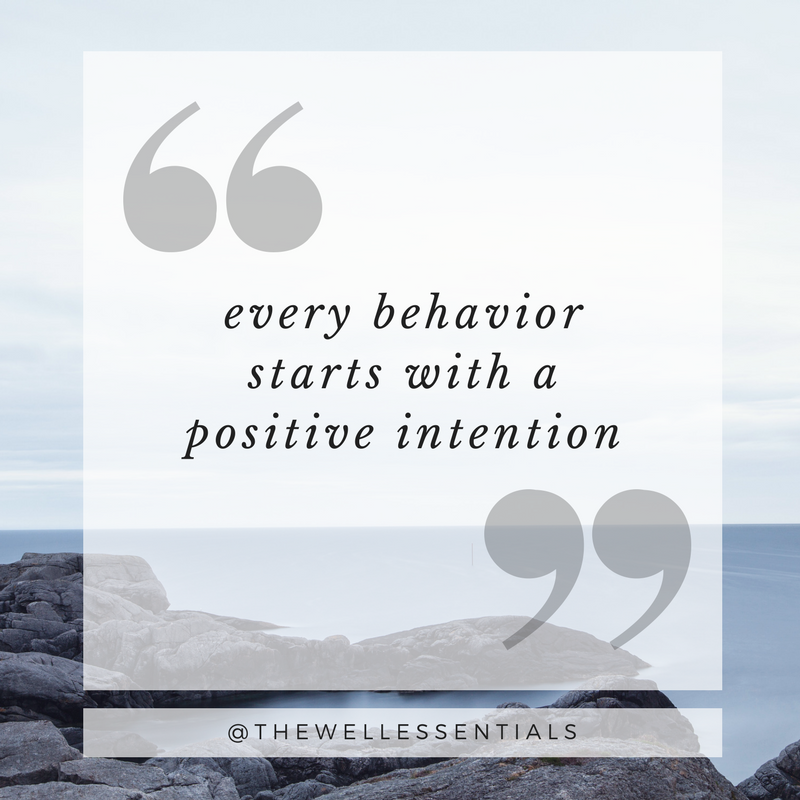
According to Maxx, “anything can be an intention.” An intention merely provides you with a focal point from which to refocus your energy when it is pushed and tugged in many directions throughout the day. Just make sure that whatever you’re aiming for comes from a positive place.
“Today, I will be present,” for example, is an example of an aim. “Today, I’m going to eat healthful foods.” “I’m going to be patient today.” “Today, I shall make informed decisions.”
“It’s important that the intention be phrased as a positive ‘I will’ rather than a negative ‘I won’t,'” she explains. This is because studies demonstrate that negative emotions often outnumber happy feelings.”Take brief mindful pauses throughout the day to make sure the choices you are making align with your intention.”
4. Keep your intentions simple.
It’s not necessary for your ambitions to be based on lofty objectives. Rather, they should be viable and actionable in the real world.
“Set an intention for something that’s a typical part of your day,” Weand advises. “For example, let’s say it’s a Monday morning and, typically, you’re scheduled to attend your weekly, Monday afternoon staff meeting, which usually gives you a sense of dread. You can set the intention of ‘I intend to go into the Monday staff meeting more relaxed and connected to others.'”
She claims that as you become more accustomed to setting daily intentions, they become easier and more natural. You can next progress to setting intentions for the weeks, months, and years ahead of you. The same method applies: be explicit about what you desire, visualize it in your future, and thoroughly feel it. You’ll achieve your objectives over time.
5. Any limiting beliefs should be shifted.
Limiting beliefs are views that you hold to be absolutely true but that have a detrimental impact on your life by preventing you from moving forward in some way. (Think about it: if you honestly feel you’re afraid of heights, you won’t jump off that waterfall.) This means that any uncertainty you have will prevent you from reaching your goals.
“Not believing you can achieve your intention is a great barrier to achieving your set intentions,” says Barbara Santini, a psychotherapist and sex and relationship adviser. Instead, “reframe your mindset to match your desire with your beliefs,” and let your intentions lead the way.
What’s the difference between intent and impact?
Before going any further, it’s crucial to understand the difference between someone’s intent and their impact.
What someone thinks or feels during an action or discussion is their aim. It’s usually the motivation or cause for the issue. “Well, I said it that way because…” someone can say to explain their motivation.
The impact of an action or a discussion is how it affects the other person. “It seemed like you were…” they would say, bringing up the effect issue.
In a nutshell, intent describes what you intended to do. The other person’s perception of the action is referred to as impact.

Examples from everyday life
The idea of intent versus impact shows up more often than you might think in day-to-day life.
Some examples of situations that you might find yourself in:
• You are offended by a joke made by your partner. Even if you know they didn’t mean any harm, it still hurts. Their intent was amusing, but the impact was that your feelings were injured.
• A coworker approaches you to discuss a problem they’re having at work. Your friend is defensive and quits the conversation when you offer them advise. You later hear that they thought you were criticizing them for how they handled the incident. Your intent was to provide an action plan, but the impact was that they felt judged.
• Your boss implements a new policy at work in the name of strengthening the culture, but the employees perceive it as extra work and surveillance, aggravating the office’s lack of trust. Your supervisor’s intent was to add processes for efficiency, but the impact is a decrease in morale.
• Your adolescent comes home a report card with marks that are below average for them. They shut down when you sit them down to talk about the value of accomplishing their best. They believe your remarks come from a place of disappointment rather than love or support. Your intent was to start a discussion about the future, but the impact is that your teen feels judged.
Which is more crucial?
During every confrontation, each party is likely to take the position that best supports their own reality.
“The truth lies somewhere in the middle,” as the cliché goes. There is no such thing as a one-size-fits-all solution in this case.
When discussing intent versus impact, context is important because one person’s intentions and another’s view or experience are both valid.
When it comes to intent vs. impact, context is crucial.
If your impact does not correspond to your intention
“But that’s not what I meant,” have you ever said?
You’re not the only one who feels this way. Everyone’s reactions are based on their personal interpretation of a situation, which means that unintentional hurt is guaranteed to occur – no one is immune to an inadvertent “ouch.”
If someone tells you that you wounded or offended them, how you manage the issue might affect the rest of your relationship, whether it’s professional, romantic, or platonic.
To get everything back on track, follow these steps:
• Listen with the intention of understanding what they’re saying, not of defending yourself. Using the active listening approach of repeating back exactly what you hear can be beneficial.
• It is their feelings that should be prioritized, not yours. When someone tells you that you done something wrong and you disagree, it’s natural to get irritated. But take a breather and remember that you can talk about your feelings afterwards.
• Acknowledge or sincerely apologize for the impact your actions had on them. Avoid using phrases like “I’m sorry if,” “I’m sorry you,” or “I’m sorry but,” which lack accountability and place blame on the person who was injured. “I’m sorry for what I did,” and “I’ll do better” are much better examples.
Is it better to have a goal mindset or an intention mindset?
A thoughtful attitude to work necessitates a conscious approach to objectives.
You hear a lot about setting objectives in the workplace. Goals are defined by precise actions and definitions. At times, our professional and even personal lives appear to revolve around achieving objectives and crossing items off our to-do lists.
Setting intentions is a common theme in the mindfulness community. Intentions are all about controlling attention and energy, and despite the fact that these are extremely significant resources for our work, they are rarely employed as tools in the workplace.
What if incorporating intents into your planning helped you be more effective at achieving your work goals and build a more thoughtful approach to work?
To get started, follow these four simple actions.
STEP 1: Understand the difference between a goal and an intention mindset.
To begin, grasp the distinction between an intention mindset and a goal mindset. You can discover that one strategy is better suited to certain conditions or goals.
Fitness is an excellent illustration of this. Make it a point to go to the gym three times every week. You can also nurture a desire to improve your health, which can entail going to the gym but also include things like diet and stress management.
Sometimes you need a tight scope to take action, and other times you need flexibility to move forward. Where does it make sense to employ goals or intentions in your work?
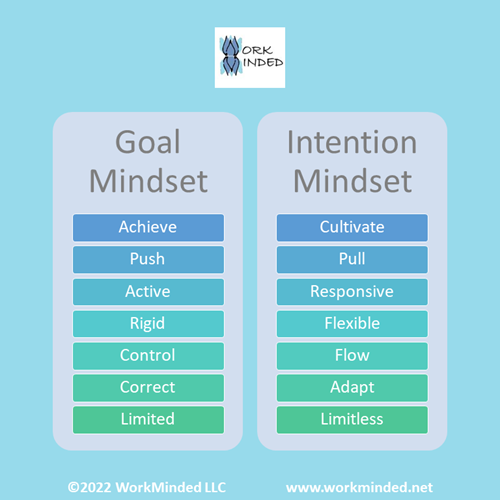
STEP 2: Recognize the Importance of Intentions
A goal mindset has a different organizational influence than an intention mindset. Here are two main areas where using intent has a significant impact.
In a dynamic, uncertain, complex, and confusing business world, intentions can help you be more productive. In today’s VUCA atmosphere, which contains numerous elements outside our control, traditional goal planning might be difficult. Intentions can help you navigate the future of business with more flexibility. Consider our fitness example. When gyms close due to the pandemic, you will not be able to meet your objective of going to the gym a specific number of days each week. If you set the goal of getting healthy, even if gyms close, you’ll have other options to keep moving forward – without wasting time by having to redo the planning process.
Intentions can have a good impact on employee satisfaction. Taking a more deliberate approach to planning inside your organization’s culture can also have a significant impact on employee satisfaction. Perhaps most importantly, working with goals can sometimes lead to burnout, but working with intents can actually aid employee well-being.
STEP 3: Overcome Obstacles to Using Intentions
Even when we realize the benefits of working with intentions, it’s not always easy to put them into practice at work. Here are a few frequent stumbling hurdles and how to overcome them.
Intentional ROI isn’t always straightforward. When it comes to intentions, connecting the dots can require a few steps, whereas ROI for goals is usually proved with a direct measurement. Intentions can also be linked to more subjective or anecdotal measures, which are often overlooked or discounted in ROI estimates. It’s critical to realize the value of both intention and goal data, and to balance the two in order to estimate ROI more properly.
Objectivity and accomplishment are valued more than subjectivity and growth in traditional work cultures. Intentions can touch on themes that make people feel uneasy at work, such as emotions, ambiguity, and confusing information. However, this does not imply that intentions are less important than goals. Indeed, with a more human-centered approach driving the future of work, business may require more of an intention mentality model in the not-too-distant future. Recognize when a goal mindset is actually beneficial to your work and when adhering to a goal mindset for the sake of tradition may be preventing you from reaping the benefits of employing intents.
STEP 4: Just Start Doing It
At any point, you can begin incorporating intentions into your company planning. Here are a few ideas to get you started right away.
Make a daily intention to cultivate. Set an intention to cultivate as well as a goal to reach on your daily to-do list or schedule. Keep track of your progress toward the aim and the objective, as well as how your approach differs from one to the other and how you feel as you work toward both.
Incorporate intention into your present objectives. Convert an existing objective into an intention to practice utilizing intention language in your planning. Ask yourself what you want your future state to be like, and then seek for ways to apply goal mentality or intention mindset to get there. Where would objective facts with a limited scope be useful in achieving the desired result? Where would subjective data and a broad approach help to achieve the desired result? Reframing your traditional beliefs about ROI and workplace objectives is especially important.
“What If?” is a good question to ask oneself. Consider a case in which you could employ an intention to achieve a business goal. (For example, “Our aim is to exceed $1 million in sales by December 31” vs. “Our desire is to considerably grow sales this year.”) What do the distinctions and nuances between each statement imply for your work? Consider the scenarios in which each choice might be useful, as well as how each method might alter resource allocation, employee experience, and prospective consequences.
Starting small is OK when it comes to bringing more of an intention attitude to your work – just get started! Remember that every step you take will help you develop a more thoughtful approach to your work.

Course Manual 3: Three-Part Brain
The Neocortex
In the evolutionary sequence, this is the most recent brain. Your conscious mind dwells in the NeoCortex. These are the open conversations we have with ourselves as well as what we hear when we listen. We consciously establish a plan for who we want to be in the Neo Cortex. This is where the journey begins in the process of constructing your new version of self.
The Limbic Brain
The Limbic Brain is also known as the Mammalian Brain, as previously stated. The Limbic brain’s primary job is to maintain chemical order in our neurological and hormonal systems. ‘The feeling brain,’ as the Limbic brain is known. This area of our brain serves as a link between our conscious thoughts and impressions of events and what is stored in our memories and hardwired into our subconscious. The Limbic brain is where we make our emotional decisions, and it’s an important part of the Visualization exercise we need to change our future selves and lives.
The Cerebellum
The reptilian brain is the “seat of our subconscious mind,” according to Dr. Joe Dispenza. The cerebellum stores the situations and behaviors associated with fight or flight. We hardwire an event into our subconscious self after it is sensed and after we have developed an emotional judgment of the encounter. Continued reinforcement will result in a stronger impression, or we will lessen the impression if there is a fresh event and resulting feeling. The Cerebellum is the last stop on our path to becoming a new person. The journey is never-ending since we are constantly making new experiences, yet the behaviors we presently have in our bodies and minds are rooted in this part of our brains.
How Do We Get Hardwired?
It’s crucial to understand how we perceive life in tandem with our brain since it’s the foundation for our potential to modify our lives. Here’s how it goes: You produce thoughts about what you’re experiencing before, during, and after you’ve had the experience. These ideas induce emotions as you assess whether the event was pleasant or bad, as well as whether the benefit or loss had a high or low degree of amplitude. The resultant emotions lead to a patterning of how you feel about the experience, which is subsequently reinforced by behaviors.
When situations in your life recur that are similar to prior similar experiences, your conditioned behaviors will cause you to behave in a way that corresponds to a preconceived assumption about the outcome. You’ve probably heard the phrase “his mind was made up.” This is precisely what has happened. Our minds are built to subconsciously draw upon previous experiences with a limited quantity of incoming information in order to make quick yet educated judgements about an encounter. The Reticular Activating System is a mechanism that connects what is sensed instantly inside an event with what has been ‘learned’ and imprinted unconsciously (RAS). What you expect to happen, what you’ve been emotionally taught to think, is what We believe to be real.
So, how do we break the cycle of our present beliefs and habits and make place for development and understanding? What if what we think is untrue or preventing us from growing and evolving into new people, accomplishing larger goals, and enjoying a more fulfilling life?
New thoughts, emotions, and experiences are the answer. As a result, new behaviors emerge, reinforcing new experiences and forming a new self.
Developing as a Creator
“95% of who you are by the time you are 35 years old is a set of memorized behaviors and emotional reactions that create and identity subconsciously. ” — Joe Dispenza, M.D. You’ve evolved into a self-contained mechanism that works without the intervention of the conscious self. Lets use an analogy from Eckhart Tolle, who acquired it from a Zen master. The automated system that controls the majority of our thinking resembles a man riding a horse with seeming importance and purpose. He only has so much power over the reins as the rider, but the horse is wild and doesn’t listen to him. If you want to know where the guy is going on his journey, you should Ask The Horse rather than talking to the man himself, especially if the horse is wild and untrained.
So, how do we become well-known and build a better life for ourselves? ‘Neurons that fire together wire together,’ as the adage goes in neuroscience and psychology. A new synaptic connection is formed in the brain every time we learn anything new. To change the way we think, we must generate new experiences in order to learn something new, and by doing so, we inadvertently unlearn what we no longer want.
Previous events have caused chemicals to be released within the Limbic Brain. We’ve built memories for emotional events because of these chemicals, or emotions. The brain also takes a’snapshot,’ which explains why memories are so vivid. A first kiss, graduation from high school, or a surfing trip off the coast of Hawaii are all examples of this. These events cause physical changes in the brain.
What’s more crucial to realize is that the inverse is also true. Routine experiences, which do not elicit a physiological or emotional response, are not remembered. This is why it’s so tough to recall anything as simple as what you had for dinner the night before. The addiction that might come with the substances created can be very tough for some people. Whether these are good or bad emotions, we can become addicted to the chemical itself, and in the case of negative emotion addictions, a person can become trapped in a cycle of exhility, repeating the same behaviors and experiencing the same experiences over and over without even realizing what is causing the cycle. This individual has now succumbed to circumstance and conditioned behavior. Breaking the road starts with a desire to produce different results and a deliberate decision to develop a new vision and path forward; to become a creative.

Thinking – Doing – Being
As you’ve progressed through this course manual, you’ve seen that we’re hardwired by our past experiences, ostensibly subject to our subconscious, but with the power to construct new minds and hence new lives for ourselves. Here’s where we break out what it looks like and break it down into the three phases described earlier:
• Thinking – Feeling – Doing
Thinking
Dopamine-sensitive neurons are found throughout our brains. The bulk of these are found in the frontal lobe, a physical portion of the brain. Our minds are chemically structured to offer us with a risk versus reward process that delivers judgment (good or negative) and reinforces our experiences with these dopamine sensitive neurons in situ. This is also the system we’ll be using to modify our minds. “This is where we integrate personality with emotion and transform thought into action.” says neuroscientist Richard Restak of the frontal lobe.
The Neo-Cortex, in particular, is the location of our conscious thoughts. Within our minds, we have the power to develop conscious thoughts and then put those thoughts into action. And, because our bodies can’t tell the difference between real-life sensations and those created only by mind. This is where we can start the change process by simply thinking about it.
Visualization is the mechanism that sets this process in action. This isn’t your typical visualization exercise in which you imagine how something might seem. This is a visualization exercise including focused concentration and emotion that completely fools the brain into thinking the vision is a real experience. As you may have guessed, the MIND is in charge here. You, that is, your conscious ideas, the part of you that has made up your mind about who you want to be, take command of your mind, body, and destiny.
You must schedule your Visualization session in order to begin the whole sequence with thinking. If writing out your goals or a vision for a new experience helps you set a vision for them, then do so. It’s also a good idea to create an environment that’s comparable to mediation, with few distractions and similar posture and breathing. This helps for a variety of reasons, including altering your brain waves from beta to alpha, but that’s an other topic. Remember, you get to choose what you want and who you want to be. Begin with the following steps:
• Begin with a mental image of yourself as you are now, then imagine yourself having accomplished your goal.
• Be explicit about what you want to accomplish. It’s all about the intention.
• Consider the emotions you’ll experience not only after you achieve your objective, but also as you progress toward it.
• Make a mental note that this achievement is for that moment only, and that there will be more to come, though no energy needs to be spent on them just yet.
We can proceed into the feeling phase once you’ve established your mind in place with intention for the objective and a clear picture for how you’ll appear and feel, as well as how the environment will feel.
Feeling
Remember how we talked about the stages of being? Thoughts are elicited by experiences, which in turn inspire emotions, which lead to acts. We reinforce these habits in ourselves by replaying emotional events in our minds and having comparable sensations, which is what our own behaviors will drive us to do. Your subconscious mind has been programmed in this manner. This is the cycle we will either break or continue if you wish to evolve into a new being and live a new life.
We’ll now connect the emotions we imagined previously to the experiences to finish the Visualization exercise. Whereas before you could only envision or think about how they might look, now you can picture how they would feel.
• Imagine how they will feel based on your vision of the objective or experience, as well as the image of what the end result will look like.
• Allow the sensation to begin in your thoughts and move through your imagined future self.
• Allow your future thinking to notice the feeling throughout your body, resulting in an awareness of the future mind and body.
• When you reach your goal, pay attention to the smells, sounds, and surroundings. Allow all of these things, including your imagined mind, body, and environment, to take shape and exist.
• Finally, express gratitude and appreciation for the journey and the new experience or accomplishment that has resulted.
You can now return your attention and focus to the present, with your vision of your future self solidified and the feelings associated with who you already are in place. Only in the present does one have the ability to effect change. You’ve hacked into a ‘present’ version of yourself from the future. Because you’ve already experienced it, you’ve set in action alterations in what you’re already becoming. Those events have given rise to notions about your emotions, which will manifest in the present to strengthen the person you are.
Being
Your current state of being is a culmination of your past experiences, future projects, and ultimate self-beliefs. This is not to be confused with your spiritual actual inner self, but rather with the personality and lifestyle that result from conditioned behaviors and a belief in who we are, our ego, and our prior fears and accomplishments. Visualization has an effect on who you end up ‘Being’ in terms of shape. You have the capacity to transform who you are into anyone you can envision by using your thoughts as the captain of the ship of your life and self. Actions exist exclusively in the moment.
After Visualization, what’s left? Doing. It’s up to you to put your imagined future self into action. As previously stated, the future has no power, and the same is true for the past. The only power to create will always be the current moment, right now!
You’ve created a situation that will influence your actions. Best books about life, best books to read about life, best mindset books, best philosophy books, book of you, books about life, books about the mind, books for living, books for men to read, books to help, books to read about life, get self help continue to reinforce the experiences, thoughts, and emotions associated with what you’ve envisioned through visualization and repeated exercises. You can put a plan in place to accomplish your future self now that those new behaviors are already formed and taking place.
Uncomfortable Initially
You will be reminded of the genuine purpose of your energy throughout the day. Your body and previous fitness will fight back against the new version of you! You’ll be uncomfortable for days or weeks until you’ve established a new routine and belief about yourself in your subconscious mind.
The new version of self will be resisted by your previous view of yourself, your old ego, and the patterns of conduct that have been in place to sustain your old existence. “The act of rehearsing and mentaling closing your eyes… the brain doesn’t know what is real or not and you are installing the neurological hardware and that hardware [eventually] becomes a software program. We start living our future vision.” Dr. Joe Dispenza explains. This new practice, on the other hand, will allow you to broaden your mental boundaries and be more receptive to new and exciting prospects.
New You
Your decisions will begin to mirror your long-term goals. Your actions and experiences confirm who you’ve already programmed yourself to be. You may become a new person and establish a powerful growth mentality by comprehending the three brains.

Course Manual 4: Basic Human Needs
Maslow’s Hierarchy of Needs
Maslow’s hierarchy of needs is a psychological motivational theory that consists of a five-tier model of human wants, which is sometimes shown as hierarchical tiers within a pyramid.
Physiological (food and clothes), safety (job security), love and belonging needs (friendship), esteem, and self-actualization are the needs from the bottom of the hierarchy up.
Individuals must attend to lower-level demands before they can attend to higher-level requirements.
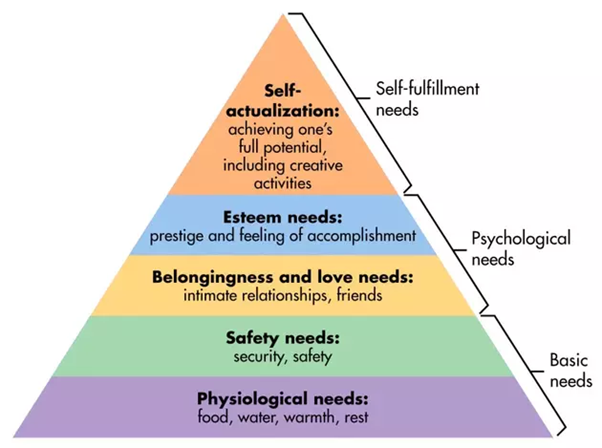
Needs for deficiency vs. needs for growth
There are two types of needs in this five-stage model: deficit and growth. Deficiency needs (D-needs) correspond to the first four levels, whereas growth or being needs refers to the highest level (B-needs).
Deficiency needs emerge as a result of deprivation, and they are said to motivate people when they are not met. Furthermore, the longer such wants go unmet, the stronger the drive to meet them becomes. The longer a person goes without eating, for example, the more hungry they will become.
Individuals must first satisfy lower level deficit wants before moving on to higher level growth requirements, according to Maslow. He later explained that meeting a need is not a “all-or-none” situation, noting that his earlier words may have created “the false impression that a need must be satisfied 100 percent before the next need emerges”.
When a deficit need is’more or less’ met, it fades away, and our activities become routinely focused toward addressing the next set of unmet requirements. These become our most pressing requirements. However, once they have been engaged, growth demands continue to be felt and may even become stronger.
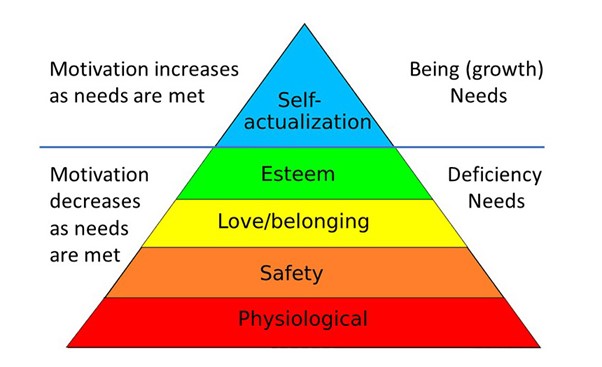
Growth requirements arise from a desire to develop as a person, not from a lack of anything. After these demands for growth have been met to a reasonable degree, one may be able to reach the maximum level of self-actualization.
Every person has the ability and desire to progress up the hierarchy toward self-actualization. Unfortunately, failure to address lower-level demands frequently stymies development. Divorce and job loss are examples of life events that might cause a person to move up and down the ladder.
As a result, not everyone will go through the hierarchy in a single direction, but instead will switch back and forth between the many types of requirements.
The five stages of the original hierarchy of needs paradigm are as follows:
People are motivated to meet particular wants, according to Maslow, and some needs take precedence over others.
Physical survival is our most basic necessity, and it will be the driving force behind our actions. When that level is completed, we are motivated to move on to the next level, and so on.
1. Physiological demands – air, food, drink, shelter, clothes, warmth, sex, and sleep are all biological necessities for human survival.
The human body cannot function optimally if these demands are not met. Physiological needs are the most important, according to Maslow, because all other wants are secondary until these are addressed.
2. Safety needs – after a person’s physiological demands are met, security and safety become more important. In their daily lives, people seek order, predictability, and control. These requirements can be met by the family and society (e.g. police, schools, business and medical care).
Emotional security, financial security (e.g., job, social welfare), law and order, fearlessness, social stability, property, and health and wellness are only a few examples (e.g. safety against accidents and injury).
3. Requirements for love and belonging – when physiological and safety wants are met, the third level of human needs is social, which includes feelings of belonging. A human emotional need for interpersonal interactions, affiliating, togetherness, and being a part of a group is referred to as belongingness.
Friendship, intimacy, trust, and acceptance, as well as receiving and giving affection and love, are all examples of belongingness demands.
4. Esteem needs are the fourth level in Maslow’s hierarchy and include self-worth, accomplishement and respect. Maslow classified esteem needs into two categories: (i) esteem for oneself (dignity, achievement, mastery, independence) and (ii) the desire for reputation or respect from others (e.g., status, prestige).
Maslow indicated that the need for respect or reputation is most important for children and adolescents and precedes real self-esteem or dignity.
5. Self-actualization needs is number five. The highest level in Maslow’s hierarchy, needs allude to a person’s potential realization, self-fulfillment, personal growth, and peak experiences. This level is defined by Maslow as the desire to achieve everything possible, to become the best version of oneself.
This desire may be perceived or focused on quite specifically by individuals. One person, for example, may have a tremendous desire to be the perfect parent. In another, the desire may be manifested in terms of money, academics, or athletics. Others may convey their feelings through art, such as paintings, photographs, or inventions.
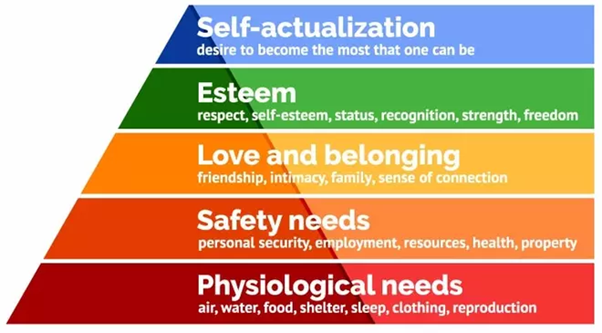
Human needs, according to Maslow, are ordered in a hierarchy:
“It is quite true that man lives by bread alone — when there is no bread. But what happens to man’s desires when there is plenty of bread and when his belly is chronically filled?
At once other (and “higher”) needs emerge and these, rather than physiological hungers, dominate the organism. And when these in turn are satisfied, again new (and still “higher”) needs emerge and so on. This is what we mean by saying that the basic human needs are organized into a hierarchy of relative prepotency” (Maslow, 1943, p. 375).
Over the course of several decades, Maslow refined his theory based on the concept of a hierarchy of needs.
Maslow proposed that the hierarchy’s order “is not nearly as rigid” as he may have implied in his earlier presentation.
The hierarchy of needs, according to Maslow, may be changeable depending on external circumstances or individual characteristics. For example, he states that the desire for self-esteem is more important for certain people than the need for love. For some, the desire to be creative may outweigh even the most fundamental needs.
Maslow also stated that most conduct is motivated by multiple factors, and thus “any behavior tends to be determined by several or all of the basic needs simultaneously rather than by only one of them”.
Summary of the Needs Hierarchy
(a) A hierarchy of needs motivates human beings.
(b) Wants are arranged in a hierarchy of prepotency, with more basic needs having to be supplied in some way (rather than all or nothing) before higher needs can be met.
(c) the order of needs isn’t set in stone, but can change depending on external factors or individual variances.
(d) Most behavior is multi-motivated, meaning it is driven by multiple basic needs at the same time.
The new hierarchy of requirements
Maslow’s five-stage model has been expanded to incorporate cognitive and aesthetic wants, as well as later transcendence demands.
A seven-stage model and an eight-stage model, both developed during the 1960s and 1970s, are noted as modifications to the original five-stage model.
1. Biological and physiological requirements – oxygen, food, water, shelter, warmth, sex, sleep, and so on.
2. Needs for safety: protection from the elements, security, order, law, stability, and fearlessness.
3. Needs for love and belonging – companionship, closeness, trust, and acceptance, as well as receiving and providing affection. Belonging to a group, affiliating (family, friends, work).
4. Self-esteem needs are divided into two categories by Maslow: I self-esteem (dignity, achievement, mastery, independence) and (ii) the need to be accepted and respected by others (e.g., status, prestige).
5. Cognitive requirements: knowledge and comprehension, curiosity, investigation, and the need for meaning and predictability.
6. Aesthetic requirements – appreciation and pursuit of beauty, proportion, and shape, among other things
7. Needs for self-actualization include attaining one’s full potential, self-fulfillment, personal growth, and peak experiences. “To become everything one is capable of becoming” is a wish.
8. Transcendence requirements – A person is motivated by values that go beyond his or her own personal self (e.g., mystical experiences and certain experiences with nature, aesthetic experiences, sexual experiences, service to others, the pursuit of science, religious faith, etc.).
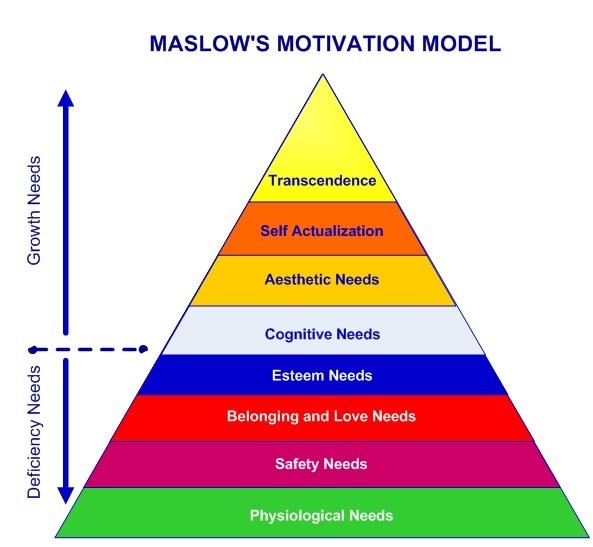
Self-actualization
Maslow developed a more positive description of human behavior that centered on what goes right rather than psychopathology and what goes wrong with humans. He was fascinated by human potential and how we can realize it.
Human motivation, according to psychologist Abraham Maslow, is founded on people desiring fulfillment and transformation through personal growth. Self-actualized people are happy and accomplishing everything they set out to do.
The need for personal growth and discovery that exists throughout a person’s life is referred to as self-actualization. A person is always ‘becoming,’ according to Maslow, and never remains static in these words. Self-actualization is when a person discovers a meaningful purpose in life that is meaningful to them.
Because each person’s motive for self-actualization is distinct, people pursue it in different ways (Kenrick et al., 2010). Self-actualization can be reached in a variety of ways for different people. For some, it might be done via the creation of works of art or literature, while for others, it can be achieved through sports, in the classroom, or in the workplace.
Maslow felt that peak experiences may be used to gauge self-actualization. When a person observes the world completely for what it is, feelings of elation, delight, and astonishment arise.
It’s crucial to remember that self-actualization is a never-ending process of growth rather than a flawless state of ‘happily ever after’ (Hoffman, 1988).
The following is Maslow’s definition of self-actualization:
‘It refers to the person’s desire for self-fulfillment, namely, to the tendency for him to become actualized in what he is potentially.
Of course, the particular form that these requirements will take will differ widely from one person to the next. It could take the form of a desire to be the perfect mother in one person, athleticism in another, and art or innovations in still another.
Self-actualized people have certain characteristics.
Although we are all theoretically capable of self-actualization, the most of us will not, or will only do so to a limited extent. Only two percent of humans, according to Maslow, will achieve self-actualization.
He was particularly intrigued by the traits of those who, in his opinion, had realized their full potential as individuals.
Maslow established 15 traits of a self-actualized person after analyzing 18 people he deemed to be self-actualized (including Abraham Lincoln and Albert Einstein).
Self-actualizers have the following characteristics:
1. They have a good sense of reality and can deal with ambiguity
2. Accept themselves and others for what they are;
3. Acting and thinking on the spur of the moment
4. Problem-focused (rather than self-focused)
5. A peculiar sense of humour
6. Able to look at life objectively
7. Highly creative;
8. Resistant to enculturation, but not purposely unconventional
9. Concerned for the welfare of humanity
10. Capable of deep appreciation of basic life events
11. Establish deep rewarding interpersonal ties with a limited number of people
12. Peak experiences
13. Need for privacy
14. Democratic attitudes
15. Strong moral/ethical standards
Self-actualization-promoting behavior:
(a) Experiencing life through the eyes of a kid, with complete absorption and focus
(b) Trying new things rather than clinging to the tried and true
(c) Listening to your own feelings rather than the voice of tradition, authority, or the majority when evaluating experiences
(d) Avoiding pretense (‘game playing’) and being honest; (e) Being willing to be unpopular if your views differ from the majority’s
(f) Taking responsibility and working hard
(g) Trying to identify your defenses and having the courage to let them go.
The traits of self-actualizers, as well as the activities that lead to self-actualization, are listed above. Despite the fact that everyone achieves self-actualization in their own unique way, there are some features that they all share. ‘There are no perfect human beings,’ however, so self-actualization is a matter of degree.
It is not required to exhibit all 15 traits in order to be self-actualized, and not only self-actualized persons will do so.
Maslow did not associate perfection with self-actualization. Self-actualization is nothing more than realizing one’s full potential. As a result, someone can be foolish, wasteful, vain, and unpleasant yet still achieve self-actualization. Self-actualization is achieved by less than 2% of the population.

Course Manual 5: Self-Esteem & Self-Efficacy
The Self-Concept Pillars: Self-Esteem and Self-Efficacy
What are the signs and symptoms of a low self-esteem problem?
1) Feelings of dissatisfaction.
People who have a low sense of self-esteem are usually dissatisfied. How we feel about ourselves is usually the source of our sense of fulfillment and joy in life. Low self-esteem can lead to sadness and even incapacity to function in life for certain people. Some people, on the other hand, who receive their enjoyment from a different source, such as spiritual beliefs, may not be affected by low self-esteem.
2) Anxiety is a common symptom.
Anxiety, particularly social anxiety, is common in those who have low self-esteem. This is frequently due to the social evaluative part of self-esteem. In other words, we have a tendency to judge ourselves depending on how we compare to others. Furthermore, many people are apprehensive about how others would judge them, assuming that others will perceive the same defects and incompetences that they do. Anxiety arises as a result of such worry.
3) Suffering from feelings of inadequacy or superiority.
The majority of persons with low self-esteem believe they are inferior to others. They believe they don’t meet some arbitrary criterion that others do. They frequently believe that some imperfection in themselves means they are unworthy or undeserving. For many people, this fault is not evident to others, but accentuated by the person with low self-esteem as a result of previous events. For example, a person who believes she is selfish because of what she was told as a child, despite the fact that her behavior is quite caring and sympathetic in the eyes of others.
Some persons who have low self-esteem may project a superiority complex. However, this could be a ruse to hide their true feelings about themselves. Individuals with poor self-esteem who are perfectionists because they are worried about what others think of them may appear to others to be superior.
But don’t make the frequent error of assuming that all sentiments of superiority stem from a lack of self-esteem. There is another group of people who believe they are academically, financially, or spiritually superior to others. This group, however, is not the subject of this course handbook. One method to tell the difference is that those with poor self-esteem and thoughts of superiority are more likely to have additional low self-esteem symptoms like dissatisfaction or anxiety.
4) Irritability or impatience with oneself or others.
A tendency to be impatient or easily irritated by mistakes, defects, or deficiencies is another sign of poor self-esteem. This is most often directed against oneself, although it can also be directed at others.
5) Goals that are focused on the outside world.
Individuals with poor self-esteem frequently rely their life objectives and orientation on what others desire or need. They frequently believe that their wants and needs are irrelevant. Because they are continuously taking care of others while their own needs are ignored, such an attitude can develop to resentment.
6) Negativity.
Negativity is often the result of low self-esteem. Although this negativity may not always be visible from the outside, internal self-talk is almost always negative. Others may see external expressions such as criticizing oneself in front of others, apologizing excessively, or commenting on unpleasant observations. People, unfortunately, tend to avoid people who are overly negative, which can exacerbate poor self-esteem.

What are the traits of a person who has a high level of self-esteem?
We need to distinguish between artificially inflated self-esteem and actual self-esteem in order to accurately define the qualities of high self-esteem. Self-esteem that has been artificially inflated is an attempt to appear to have high self-esteem. Individuals with low self-esteem, on the other hand, are less likely to exhibit the following traits. Individuals with low self-esteem may have some of the attributes listed below, but those with high self-esteem have them in spades and on a consistent basis.
1) Responsibility.
Individuals with high self-esteem are able to accept themselves entirely and take responsibility for their acts and the consequences without being overly critical of themselves. As a result, they are willing to own mistakes and accept constraints.
2) Commitment to a goal.
Those with high self-esteem have a strong sense of purpose and are dedicated to achieving their life goals. Furthermore, they are more committed to accomplishing these objectives because their devotion is not affected by success or failure. They tend to aim for excellence rather than perfection as active participants in life.
3) Genuineness.
People with high self-esteem can be emotionally and intellectually honest with themselves and others. They are more real in their dealings with others since they aren’t afraid of others truly knowing them.
4) Forgiving.
Tolerance and acceptance of constraints are often associated with high self-esteem. People with high self-esteem are therefore forgiving of themselves and others.
5) Values found within the organization.
Individuals with strong self-esteem are more likely to have internal rather than external values. In other words, individuals have a strong sense of self based on values they choose rather than beliefs they believe because of others’ demands or expectations. This is typically referred to as a “achieved identity,” in which a person has examined their views and values in order to determine a set of internal principles or ideals to which they would adhere.
6) Positivity.
People with high self-esteem are upbeat and have a happy and appreciative attitude toward life. They are free to compliment themselves and others, and they like to focus on the positive elements of life rather than the unpleasant.
7) Self-improvement.
Those with high self-esteem have a strong tendency to strive for self-improvement in general. They are able to analyze themselves without judgment since they do not see the need for self-improvement as a negative trait. They can also seek for aid whenever they need it because they don’t consider asking for help to be humiliating or unpleasant.
What are the signs of a low level of self-efficacy?
1) The fear of taking risks.
People with poor self-efficacy believe they are incapable of succeeding. As a result, individuals are generally hesitant to take risks or try new activities, believing that the outcome would be failure. This is particularly sad because practice and experience are the most effective ways to boost self-efficacy.
2) Uncertainty causes fear.
Self-doubt and uncertainty are frequently associated with low self-efficacy. The person does not want to risk failing if there is no certainty of succeeding. As a result, they may never find activities in which they may excel.
3) Feelings of inadequacy.
People who have low self-efficacy frequently feel like failures. Because of the risk, individuals may avoid or not try new things, as previously said. Alternatively, they may just attempt something half-heartedly. As a result, individuals are less likely to succeed and more prone to perceive themselves as failures.
4) Management of first impressions.
The endeavor to control how others perceive you in order to be seen more positively is known as impression management. People with low self-efficacy believe they are incapable, although they may try to portray themselves as successful and competent to others. They may devote a considerable deal of effort to behaving in a way that garners praise from others, and they may be concerned about being exposed as a fraud. For example, instead of learning from their failures, they may try to hide them from others, preventing them from strengthening their sense of self-efficacy.
What are the signs of a high level of self-efficacy?
1) Self-confidence.
Self-confidence is one of the most visible signs of high self-efficacy. They go into projects or situations with confidence in their ability to succeed. This self-assurance leads to additional experience, which raises their ability and, in turn, increases their self-assurance. This positive loop encourages self-efficacy to rise even higher.
2) Self-evaluation that is accurate.
Individuals who have a high level of self-efficacy are more likely to be able to appropriately assess their own performance. They are neither unduly critical nor overly optimistic, yet they can seriously analyze oneself in order to develop themselves.
3) Possibility of taking risks.
Those who have a high level of self-efficacy are willing to take calculated risks because they recognize that doing so boosts their chances of success. Reasonable risks can only promote self-efficacy because they are not afraid of failure or blunders.
4) A sense of achievement.
Those with high self-efficacy frequently feel a sense of satisfaction since they are more successful as a result of their willingness to take risks and pursue their passions. They feel accomplished even if they fail or make mistakes because they see mistakes as opportunities to develop themselves.

How can a person have a high level of self-efficacy yet a low level of self-esteem?
Although self-efficacy and self-esteem are related ideas, they are not the same. They do seem to correlate, so someone who scores poorly in one is more likely to score poorly in the other. However, it is conceivable to have poor self-esteem and strong self-efficacy at the same time. As a result, someone may be highly critical and negative about oneself while nevertheless believing that he is quite good in certain areas. For example, he might think of himself as dull and unlikable, but also as a capable architect. This is common among perfectionists, who are often good at activities with precise guidelines but confused in situations where there are no clear “rules,” such as relationships.
What may be done to boost one’s self-esteem?
1) Stop talking to yourself in a negative way.
People with low self-esteem must first and foremost stop engaging in negative self-talk. Negative labels and constant self-criticism can only exacerbate the problem. Eliminating negative self-talk does not preclude you from recognizing and addressing issues, but it does need you to be mindful of how you speak to yourself and avoid being self-destructive.
2) Recognize your assets.
People who have poor self-esteem tend to focus on their flaws rather than their strengths, and they may argue that they have nothing positive to say about themselves. That is highly unlikely. It is critical to pay attention to and appreciate strengths, no matter how minor they may appear. Once you’ve identified your strengths, you’ll need to reinforce them by focusing on them frequently.
3) Recognize your own worth.
It is critical to acknowledge that you are a unique human being with value. Recognize that you are entitled to self-care and set boundaries. You are deserving of respect and good treatment. Continue to reinforce this idea by focusing on your self-worth on a regular basis.
4) Be willing to make mistakes.
Recognize that faults and weaknesses are a normal part of life. They don’t make you any less of a person. You, on the other hand, are just like everyone else. You make mistakes and have weaknesses. You will make more blunders the more actively you participate in life. However, being actively involved increases your chances of success. Accept yourself as you are, flaws and all.
5) Recognize and accept rejection.
The more you believe that everyone doesn’t have to like you, the less you’ll feel awful or embarrassed about your flaws. There is no way to please everyone! It’s an impossibility. When someone disapproves or rejects a person with low self-esteem, they typically feel like a failure. Instead, praise yourself on being a genuine person even if someone doesn’t like you.
What can be done to boost self-efficacy?
1) Expand your skill set.
The most important thing you can do to boost your self-efficacy is to work on the skills you’ll need to succeed. Identify your areas of deficiency and discover what you need to do to improve if you’re having problems succeeding at work. Request that others give you an honest assessment of your abilities and specific suggestions for growth. Once you’ve figured out what you need to do, you must repeat the process until you feel confident. This is how competence grows. Competence is not something that people are born with; it is something that they must study and practice in order to achieve.
2) Modeling.
Observing others is one approach to gain the necessary abilities. You can learn how to succeed by watching others complete tasks successfully. You are more likely to model your behavior after that of others when you see them being rewarded for their performance or successful completion of a task.
3) Concentrate on specifics.
Focusing on specifics is the best way to increase self-efficacy. If you receive general input, especially unfavorable comments, you will be less able to make improvements than if you receive specific feedback. If you want a youngster to learn how to do dishes, for example, you don’t say, “These dishes aren’t clean,” but rather, “Let me show you how to fill the dishwasher for the greatest results.”
4) Reinforcement.
The more frequently a behavior is rewarded, the more likely it is to persist. Focus on what you do well and reinforce it by offering yourself specific praise if you want to improve your self-efficacy.

Positive thinking is not the same as thinking differently.
The “Saturday Night Live” phenomenon is a common mistake people make when trying to boost their self-esteem or self-efficacy. “I’m good enough, I’m smart enough, and doggone it, people like me!” Al Franken’s delivery of Stuart Smalley’s self-improvement words is well-known.
The problem with this form of positive thinking is that it is untrustworthy, thus it has no effect on one’s self-esteem. Many therapists, for example, have found it difficult to construct plausible claims while working with clients who have low self-esteem. Otherwise, people will remark things like “You’re just saying that because you’re my therapist.” They are more inclined to accept and use a statement that they believe is true. Simply said, a believable assertion is one that is accurate.
As a result, developing plausible claims will be your struggle in enhancing your self-esteem. It’s not going to help you to tell yourself, “I’m amazing in every aspect.” However, if you can identify certain strengths, such as leadership, you are more likely to modify your self-esteem “”I am a person who is willing to learn about myself and grow” or “I have courage because I am facing a difficult situation” or “I am tenacious.” Despite the fact that happiness has escaped me, I continue to strive for it.”
There are specifics associated to these assertions, as you can see. They aren’t all-encompassing or too optimistic. The claims, on the other hand, are practical and include precise reasons why they are correct. It is vital to make remarks like this in order to change one’s self-esteem. So, how does one go about doing this?
Steps to Creating Trustworthy Statements
1) Come up with a bad statement to characterize oneself. When writing the statement, try to be as specific as possible.
2) Determine which parts of the statement are true and which are untrue. This phase is frequently challenging for people since they do not fully expand the statement. As a result, the statement may appear to be true on the surface while being untrue beneath the surface.
Such claims are false because they imply something other than what is really expressed. For instance, if you write “”I’m overweight,” you can counter, “and that assertion is correct.” I am obese according to obesity norms.” The sentence, however, implies a lot more. If this statement has an impact on how you feel about yourself, your entire statement is probably something along the lines of “I’m fat and I’m undesirable because I’m fat,” “I’m fat, which means I’m weak-willed,” or “I’m fat and worthless.”
As you can see, once the entire statement is spelled out, it is possible to determine if it is true or untrue.
3) Use facts to rewrite your statement. Once you’ve figured out what’s false, remove it from your sentence and replace it with what’s true. It’s also better to avoid using negative labels because of the connotations they suggest. Use the words “overweight” instead of “fat,” and “lack knowledge” instead of “dumb.” “I may be overweight, but I carry myself nicely,” you can remark instead of “I’m obese (and all it entails).” “I may be ignorant about that subject, but I’m still a smart person,” for example.
4) Consider the statement. A well-written statement should make you feel good about yourself while also allowing you to agree or believe it. After you’ve assessed the statement, utilize it as an affirmation to help you feel better about yourself. The more you repeat the affirmation, the more you will begin to perceive yourself in that light. The more credible the affirmation, the more likely it is to be used.

Course Manual 6: PERMA Model of Human Flourishing
The PERMA+ Model by Martin Seligman is explained: A Theory of Wellbeing
What is the PERMA Model, and how does it work?
The PERMA Model represents the five key factors of happiness and well-being, as previously stated. Positive Emotion, Engagement, Relationships, Meaning, and Accomplishments (PERMA) is an acronym that stands for Positive Emotion, Engagement, Relationships, Meaning, and Accomplishments.
The PERMA Model was created by Martin Seligman, an American psychologist and educator. As a psychologist, Seligman recognizes how natural it is for people to seek out what makes them happy, regardless of their age, sexual orientation, or social status.
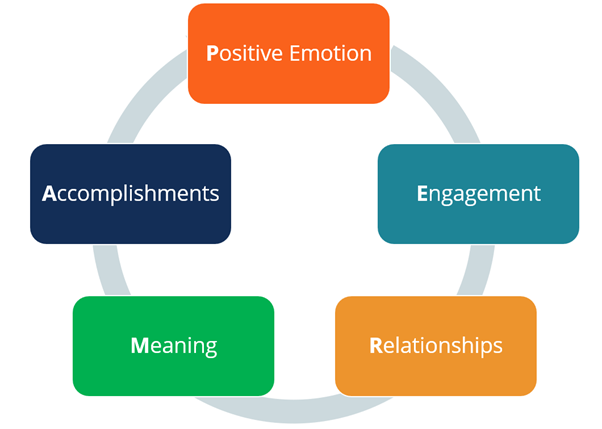
According to Seligman’s study, the five basic parts of the PERMA Model are what people require in order to acquire a healthy sense of well-being, fulfillment, and contentment in life, which can lead to the discovery of life’s real meaning.
The PERMA Model’s Five Elements
1. Positive emotion
Positive emotion is all about feeling good, and it’s the quickest way to happiness. When you’re in a good mood, you’re in a good mood. However, such pleasant emotion does not end with someone flashing a big smile, which anyone may do or, unfortunately, fake.
Positive emotion extends beyond that to include accepting the past, no matter how horrible it was, and looking forward to the future with optimism.
However, such mood does not imply that the person should be joyful all of the time, as this is hard to achieve. However, attempting to achieve a happy emotion has a significant impact on many other parts of life, including the other elements of the PERMA model.
The words pleasure and enjoyment are frequently associated with happiness, but they are frequently misunderstood as synonymous. The model defines pleasure as having one’s physical needs met, such as food, shelter, water, clothing, and safety. The happiness and fulfillment obtained from doing anything like painting, cross-stitching, or exploring a car’s motor, on the other hand, is known as enjoyment. When pleasure is attained, contentment follows suit.
2. Engagement
The PERMA Model’s second component is Engagement, which refers to something that can engross or consume an individual. Almost everyone has been lost in a book or living in “their own universe” as a result of something so captivating. It is actually beneficial to a person’s intelligence, emotions, and skills, which is why a child who is busy putting together Lego parts or stacking blocks should be permitted to do so and be left alone.
Even if it has nothing to do with one’s work or is regarded as stupid by others, doing something that engages an individual offers enjoyment. For example, a woman in her mid-30s who enjoys playing the violin can do so and, while doing so, temporarily escape the present and immerse herself in the music.
3. Relationships
According to the PERMA model, relationships are the third aspect of happiness and well-being. As humans, we have a natural urge to be linked to others and to be a part of a group, such as a clique, a school organization, or a circle. We were born with the need for love, affection, attention, and interaction, not just the desire for it. It is for this reason that people should form ties with their family, coworkers, friends, and peers, as it is from these groups that we can gain emotional support when times are tough.
When high school ladies go to the restroom together, even if only one of them needs to use it, this is a simple but powerful example of the need for belonging and contact.
4. Meaning
Many people are perplexed as to why so many celebrities who live in multimillion-dollar houses and take monthly holidays to the Maldives and the Caribbean commit suicide. What they don’t realize is that life is about so much more than money and material goods. Above all, it is the meaning that a person finds in their lives that motivates them to live.
Parents with young children recognize their importance in their children’s lives and work diligently to provide for their family. Even though she is alone, a lovely lady is content since she looks after her elderly parents. These things are more valuable than money, and meaning keeps people happy and motivated.
5. Accomplishments
Finally, accomplishments are the sixth PERMA model component. We’re all proud of whatever we’ve done or achieved. These accomplishments boost our self-esteem and give us the assurance that we are valuable. When we do something, we feel good about ourselves and want to do more and grow. It may be seen in even the tiniest of children.
For example, a young girl learns to eat with a spoon and fork, and when she realizes how proud her mother is of her, she continues to use her spoon and fork. She also wants to learn new skills that are more difficult than what she currently knows, such as pouring water into her glass or putting her toys away. In a nutshell, these achievements motivate people to strive more and make them feel good.

What is the PERMA Model’s Application in the Workplace?
We spend a significant portion of our day at work, working with people who are not related to us in any way other than as coworkers. True, each employee’s degree of happiness, as well as the ambiance of a workplace, have a significant and direct impact on an organization’s productivity.
As a result, the PERMA Model should be used in the workplace to build a pleasant work environment, which will eventually lead to a happy and productive staff.
• Simply thanking a coworker who has accomplished something at work might elicit positive sentiments. It could also be as simple as sending a thank-you message and a bar of chocolate to another employee who stepped in to cover a shift.
• The workplace does not always have to feel like a place where things must be completed. Why not create a “engagement room” with a tiny piano, reading corner, or multiple sketchbooks and canvasses where staff may take a break and do something engaging? Workers may recharge and reset their ‘buttons’ in this manner, allowing them to be more productive.
• Belonging is a crucial component of a productive workplace. Being a part of a team or a small group isn’t the only way to achieve it, though. One of the HR Department’s most effective techniques for creating healthy workplace connections is team building. Relationships can be developed at any time of day by doing things like inviting one or two coworkers to lunch.
• An organization should not just be profitable, but also have meaning in the society in which it operates. In fact, many businesses are already devoting more time and resources to corporate social responsibility.
Take, for example, Walt Disney English, which is a English Learning Centre in China that is under the company’s publishing sector. Because it works with children, its Voluntears Program chooses an orphanage or a school for special needs children as its fundraising recipient. Apart from the monetary donation, employees visit the chosen school and provide Mickey Mouse dolls for each child.
• Accomplishments have a greater impact when they are recognized by “higher-ups.” Every year, firms usually have a gala night where excellent employees are recognized. But why wait for a once-a-year celebration when employers can show their appreciation for their employees on a monthly basis without going overboard?
Although a Kudos wall is simple, the influence it has on the person whose name is on it for a job well done can be significant.
The Plus (+) in PERMA
Optimism
Optimism is a positive emotion that is essential for resilience and overall well-being. Optimism is the conviction that there will be more positive outcomes in life than negative ones. Optimistic people are more likely to be resilient in the face of adversity (Carver, Scheier, & Segerstrom, 2010).
People who are optimistic live longer, have better postoperative results, have lower depression levels, and transition better to college life (Carver et al., 2010).
Physical activity
In a variety of ways, physical activity has been related to happiness. Negative emotions are linked to a higher risk of physical disease and bad health practices, and those suffering from mental illness are more likely to be physically inactive (Hyde, Maher, & Elavsky, 2013).
Being active has obvious physical benefits, but it also helps to reduce symptoms of sadness, anxiety, and loneliness, as well as increase mental focus and clarity (Hyde et al., 2013).
Nutrition
Poor nutrition is linked to physical health issues including obesity, diabetes, heart disease, and even cancer, but there is also evidence of a link between diet and mental health (Stranges, Samaraweera, Taggart, Kandala, & Stewart-Brown, 2014).
It has been linked to happiness to eat a well-balanced diet rich in vegetables and nutrients (while avoiding processed or sugary foods). Individuals who ate more fruits and vegetables reported higher levels of happiness (Stranges et al., 2014). According to O’Neil et al. (2014), a poor diet (high levels of saturated fat, refined carbs, and processed foods) is connected to poor mental health in children and adolescents.
So, what are we going to eat? Berry, cruciferous vegetables, avocados, almonds, and seeds are just a few examples of “super foods” found in nature. A Mediterranean diet rich in vegetables, fruits, legumes, nuts, beans, cereals, grains, fish, and unsaturated fats has been demonstrated to alleviate depression symptoms while also providing a variety of physical health advantages (Parletta et al., 2017).
Sleep
Sleep hygiene supports mental and emotional resilience, according to neuroimaging and neurochemistry research, while sleep deficit leads to negative thinking and emotional fragility (Harvard Medical School, 2019). Furthermore, those with psychiatric diseases are more likely to have sleep problems, which may increase the chance of acquiring mental illness.
Insomnia, in particular, raises the chance of getting depression.
It is advised that you get seven to nine hours of quality sleep at the same time every night (Harvard Medical School, 2019). Sleep quality can be improved by making lifestyle adjustments such as avoiding coffee, nicotine, and alcohol, receiving physical activity, reducing screen time, and using the bedroom only for sleep and sex.
Relaxation and cognitive behavioral approaches for reducing stress and anxiety can also help you sleep better and feel better overall.
Important Points to Remember
When the PERMA Model is followed, the likelihood of generating a happy staff increases, which readily transfers to a happy and productive workplace. The key point is that each person’s contribution be appreciated, whether it is used by an individual for self-development or stress management or by a firm to build a healthy working environment.

Course Manual 7: Illness/Wellness Continuum
Introduction to Wellness
Definitions of Wellness
• Wellness is a choice—a decision you make to move toward optimal health.
• Wellness is a way of life—a lifestyle you design to achieve your highest potential for wellbeing.
• Wellness is a process—a developing awareness that there is no endpoint, but that health and happiness are possible in each moment, here and now.
• Wellness is a balanced channeling of energy—energy received from the environment, transformed within you, and returned to affect the world around you.
• Wellness is the integration of body, mind, emotions, and spirit—the appreciation that everything you do, and think, and feel, and believe, has an impact on your state of health and the health of the world.
• Wellness is the loving acceptance of yourself.
Everyone has the right and privilege to be well. Other than your free will, there are no prerequisites. The strong, the brave, the successful, the young, the whole, or even the illness-free being are not necessarily the “well” being. A person can be physically disabled, old, afraid of challenge, in pain, and imperfect while going through a wellness process. You can begin to appreciate yourself as a growing, evolving person, regardless of your current level of health, and allow yourself to strive toward a happier life and better health.
Learning to embrace your entire self is key to wellness. It’s about taking control of your life, living in the present now, and channeling your life force. It’s all about making decisions. It’s all about finding your own path to wellness. It everything boils down to you.
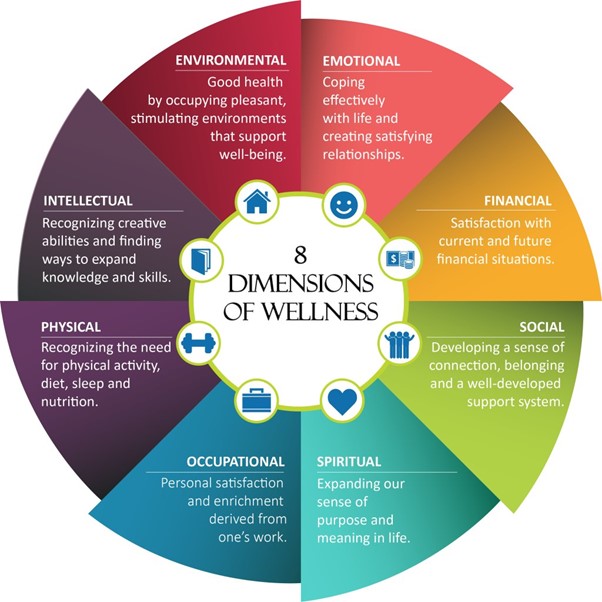
Source: GreenPath
Medical Paradigm compared with Wellness Paradigm
The Illness-Wellness Continuum depicts the relationship between the allopathic medical paradigm (or any other symptom-treatment system) and the self-responsibility-based wellness paradigm.
The three steps of awareness, education, and growth will be required to achieve high-level wellness. The purpose of these texts is to get you moving. Use the sections that follow to aid in self-evaluation and understanding of what is working—and what isn’t working—in your life right now. After that, you’ll be given some materials to help you with your self-education. Some of it is based on the experiences of those who have studied and lived it. Much of it is a reminder of things you already know but may have forgotten or avoided. Each part also contains growth possibilities, such as alternative suggestions, invitations to push your limitations, freedom to take risks, and encouragement to change.
Wellness is a process, never a static state.
We tend to conceive of wellbeing in terms of illness, and we presume that when there is no illness, we are healthy. There are many different levels of wellness, just as there are many levels of illness. The Illness-Wellness Continuum depicts how the treatment paradigm interacts with the wellness paradigm.
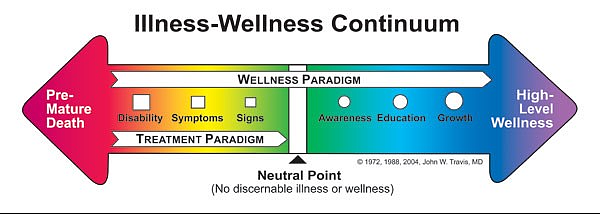
As you move from the center to the left, you can see how your health is deteriorating. Moving to the right of center suggests a rise in health and wellbeing. The treatment paradigm (drugs, herbs, surgery, psychotherapy, acupuncture, and so on) might get you to a point of neutrality, where your disease symptoms are no longer present. The wellness paradigm, which can be used at any point along the continuum, can assist you in achieving higher degrees of wellness. The wellness paradigm urges you to go beyond neutral and as far to the right as possible. It is not intended to replace, but rather to complement, the treatment paradigm on the left side of the continuum. If you’re sick, treatment is crucial, but don’t stop there. To achieve high-level wellness, apply the wellness paradigm.
People can be bored, depressed, tense, worried, or simply unhappy with their lives despite the absence of physical signs. Such emotional states are frequently the precursors to bodily and mental illness. Excessive stress, which weakens the immune system, can even lead to cancer. Negative emotional moods can also lead to physical abuse such as smoking, binge drinking, and overeating, all of which are attempts to satisfy other more basic human needs such as recognition and respect, a stimulating and supportive environment, and a feeling of purpose and meaning.
Wellness isn’t a state that exists in a vacuum. Giving good care to your physical self, using your mind productively, effectively expressing your emotions, being creatively involved with those around you, and being concerned about your physical, psychological, and spiritual environs are all part of high-level wellness. It’s not so much where you are on the continuum as it is which way you’re facing that matters. High-level wellness does not rule out sickness or weakness, nor does it deny that death is an inevitable aspect of life. We eventually expanded the model after becoming aware of this paradox, but first a little background.
John Travis first conceived up the Illness-Wellness Continuum late one evening in 1972, after everyone else at his workplace in the United States Public Health Service Hospital in Baltimore, Maryland, had gone home. It was a combination of Lewis Robbins’ (the creator of the Health Risk Appraisal) health risk continuum and Abraham Maslow’s concept of self-actualization.
The continuum was an instant hit when it was first released in 1975, providing an easy way to demonstrate what this new wellness notion was all about. It was quickly adopted by health practitioners and educators, and it began to appear in books, journals, and PowerPoint presentations all around the world. Because of its aesthetic significance, we included it in the first version of this book and will continue to do so. It is still reproduced in health and medical textbooks around the world.
A simple model, on the other hand, cannot always express a complicated concept. We’d known for a long time that the continuum may be misleading in one very important area. We understood it was conceivable to be physically ill yet have a wellness mindset, or to be physically healthy but have an illness mindset. This distinction was simply not visible in the one-dimensional model. Consider disabled, sick, or dying persons who are taking charge of their life and consciously participating in the experience. They would be on the left side of the continuum if only the physical dimension was examined, but if emotional, intellectual, and spiritual dimensions are considered, they will undoubtedly be on the right side.
Refining the Illness-Wellness Continuum
In the spring of 1986, John Travis was inspired by a new perspective on the original paradigm in Vail, Colorado. Regina Sara Ryan, co-author, immediately agreed when he shared his opinions on what he’d seen, and went on to build out the vision.
What everyone discovered is that the main distinction between illness and wellness, regardless of where a person is physically on the continuum, is the direction in which they are heading: toward high-level wellbeing or premature mortality.
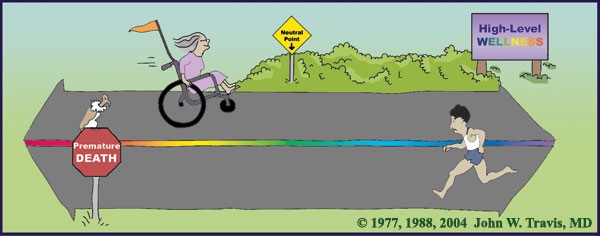
Consider the continuum to be a path. On the path, people can travel in either way. A person who is physically healthy but constantly complains or worries may be on the right side of the neutral point, but is unmistakably heading to the left – toward death. Another person, on the other hand, who is physically or mentally impaired, can yet have a really optimistic viewpoint, cultivate love rather than fear, and, as a result, be facing the right, in the direction of high-level wellness.

Course Manual 8: Positivity-Focused
Identifying negative thinking
Not sure if your self-talk is positive or negative? Some common forms of negative self-talk include:
• Filtering. You emphasize the bad features of a situation while ignoring the favorable parts. For instance, you had a fantastic day at work. You accomplished your work ahead of schedule and were praised for your efficiency and thoroughness. That evening, you’re just thinking about your plans to complete even more things, and you’ve completely forgotten about the compliments you’ve received.
• Personalizing. You instantly blame yourself when anything awful happens. If you hear that an evening out with friends has been canceled, you could believe that it’s because no one wants to be around you.
• Catastrophizing. You naturally expect the worse, even though there is no evidence that the worst will occur. When the drive-through coffee shop misunderstands your order, you fear the rest of your day will be a disaster.
• Blaming. You try to say someone else is responsible for what happened to you instead of yourself. You avoid being responsible for your thoughts and feelings.
• Saying you “should” do something. You think of all the things you think you should do and blame yourself for not doing them.
• Magnifying. You make a big deal out of minor problems.
• Perfectionism. Keeping impossible standards and trying to be more perfect sets yourself up for failure.
• Polarizing. You see things only as either good or bad. There is no middle ground.
Focusing on positive thinking
You can learn to change your negative thoughts into positive ones. The procedure is straightforward, but it does necessitate time and practice – after all, you’re forming a new habit. Here are some suggestions for thinking and acting in a more positive and optimistic manner:
• Identify areas to change. If you want to be more optimistic and think more positively, start by identifying areas of your life where you generally think negatively, such as job, your daily commute, life changes, or a relationship. You might begin by concentrating on a single area to approach in a more positive manner. Instead of a negative thinking, think of a good one to help you manage your stress.
• Check yourself. Periodically during the day, stop and evaluate what you’re thinking. If you find that your thoughts are mainly negative, try to find a way to put a positive spin on them.
• Be open to humor. Give yourself permission to smile or laugh, especially during difficult times. Seek humor in everyday happenings. When you can laugh at life, you feel less stressed.
• Follow a healthy lifestyle. On most days of the week, aim to exercise for about 30 minutes. You can also do it in 5 or 10 minute increments throughout the day. Exercise has been shown to improve mood and reduce stress. To energize your mind and body, eat a healthy diet. Make sure you get enough rest. Also, master stress management skills.
• Surround yourself with positive people. Make sure the people in your life are positive and supportive, and that you can count on them for sound advice and comments. Negative people might make you feel more stressed and make you doubt your capacity to cope with stress in a healthy way.
• Practice positive self-talk. Start with one basic rule: never say something to yourself that you wouldn’t say to anyone else. Self-care should be compassionate and encouraging. If a negative notion occurs to you, critically examine it and answer with affirmations of your positive qualities. Consider what you’re grateful for in your life.
Here are some examples of negative self-talk and how you can apply a positive thinking twist to them:
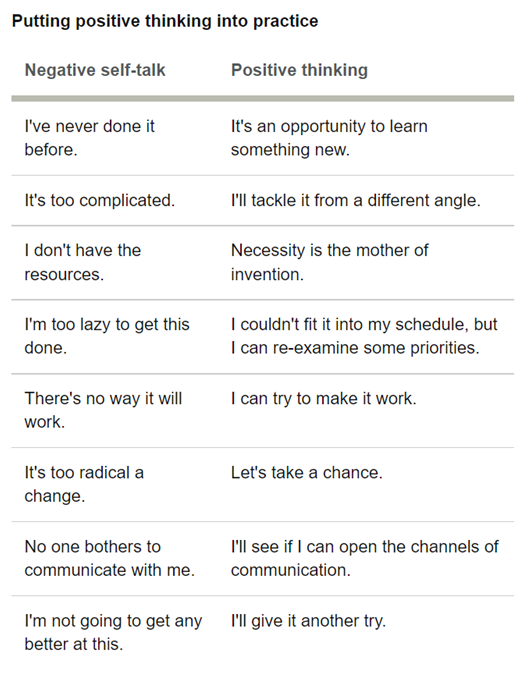
Practicing positive thinking every day
Expect to not become an optimist overnight if you have a pessimistic mindset. However, with practice, your self-talk will become less critical of yourself and more accepting of yourself. You may also lose your ability to be critical of the environment around you.
When you’re in a generally positive frame of mind, you’re better able to deal with everyday stress in a more productive manner. This capacity could play a role in the well-documented health advantages of optimistic thinking.
Is a Positive Mindset and a Growth Mindset The Same?
Believe it or not, you either have a positive mindset or a fixed positive mindset. Why is that and what does it mean? Let’s have a look at it in more detail.
Having a positive mindset entails attempting to be positive regardless of the circumstances. Take, for example, a man who is caught in a pit but does not give up; instead, he looks around and realizes that it will be freezing by nightfall, and he may perish. He concentrates on what he can do to keep optimistic and comfortable rather than looking beyond to uncover the broader problem.
In this situation, he keeps warm and finds a wooden ladder, but instead of climbing out and finding his way to safety, he ignores it. He resolves that staying optimistic and making advantage of what he has around him will be his top priorities. He probably believes that if he can make it through the night, someone will come to his rescue.
This positive mindset gives him a sense of false security and clouds his judgment because it only helps him to cope with the problem but not actually solve it! Now I’m not saying that having a positive mindset is bad. It’s important to stay positive and look on the bright side. In this case, at least he’s warm, he still has some wood to feed the fire and he’s sure that if he can stay positive everything will work out and someone will eventually come by to save him.
Being positive is excellent as long as it’s not fixed positivity, which means you’re confident there are some benefits no matter what, but because your thinking is fixed, you can’t see the reality, which is that you’re in a pit and should focus on how to get out, not how to stay comfortable.
It’s not the same as having a growth mindset. The development mindset focuses on how to grasp the entire circumstance, what the underlying problem is, and what needs to be sacrificed in order to move out of this difficult scenario. If this entails ascending the ladder in the dark to first solve the main issue, then what can he do after he’s out? He can explore what’s beyond the pit or he can draw up the ladder and focus on remaining warm.
The growth mindset examines the circumstance, considers his options, and determines what the most important learning opportunity in this situation is. He realizes that he can’t focus on comfort but must instead challenge himself to rise above into unfamiliar territory and adapt based on the situation. For example, if he can’t see anything around him, his first instinct would not be to stay warm but rather to look for something that can lead him to safety. In this case, he could use the stars to navigate, looking for the north star to determine which way he should go; he could then pull up the ladder and chop it up or carry it with him as he learns to navigate the new terrain and find his way to safety if there is none in sight; he could then use a few parts of the ladder to start a fire and other parts to build a shelter or a spear to help him hunt so he can cook something over an open fire.
So, how do you tell the difference between a growth mentality and a positive mindset? A positive mindset simply reframes a bad situation and looks for ways to improve it, whereas a Growth mindset analyzes the situation and tries to find the real problem and how to solve it, even if it means facing some challenges and difficulties along the way, at least he’ll learn from them and be able to take corrective action to get to safety, whereas a positive mindset might simply light a fire and say, “Well, at least I’m not cold, at least I’m not somewhere unfamiliar, at least I can still break off some more wood and I’m sure sooner or later someone or something will save me”.
So, what is the takeaway here? The lesson is that if we want to grow or, in this case, return to safety, we must take action, explore the unfamiliar, and give up temporary comforts. We can’t just sit back and wait for anything or someone to come along; we need to take action, be practical, and look outside the box to see the wider picture and see what new things we can attempt to learn how to conquer the circumstance and finally discover a long-term solution and permanent comfort.
So start with a growth mindset, then stay positive, don’t give up, and take action!
Don’t just assume that everything will work out if you look on the bright side and wait passively – else your so-called positivism will lead to your demise!

The Difference Between Growth Mindset and Toxic Positivity
Growth mindset is the newest buzzword in a variety of fields, from education to personal development. Because of its expanding popularity, its meaning and applications have been simplified — sometimes excessively so — in order to appeal to a wider audience. This makes sense: breaking down such a significant mental change into manageable chunks allows the average person to understand the notion and see the benefits of implementing it in his own life. To be sure, growth mindset is a valuable tool, but it’s vital not to mix it with toxic optimism, which is a trend that is less prominent in turn a phrase but just as prevalent. These two are sometimes reduced to simple platitudes like “look on the bright side” or “stay positive!” without the crucial explanation of what that means in practice.
So what are these two things? How are they different?
Growth Mindset is a mental shift away from defeatism that uses language to develop grit. It is the notion that a person’s most basic abilities can be developed via devotion and hard work, as well as feedback from others, plenty of chances to fail, and an optimistic attitude. That was a mouthful. What exactly does that imply? Take a look at this photograph from Dartmouth University. It illustrates the difference between a “growth mindset” and a “fixed mindset” by changing the words we use to describe obstacles and our sentiments about them.
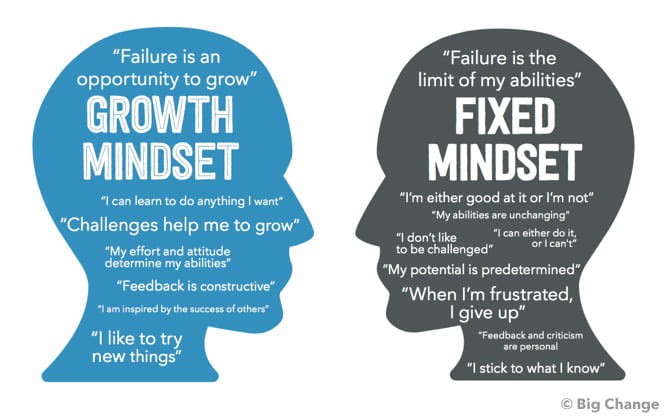
Grit, not aptitude, income, time, or any other measurable trait, is the most important indication of success. Above all else, grit is what gets people to the finish line. Numerous research have confirmed this.
So, a growth mindset seeks to develop grit with “the power of yet.” For example, “I’m not good at this… yet.”
What’s crucial to notice here is the recognition of the challenge’s difficulty, as well as the weapon provided to tackle it: language. We change our perception when we modify the words we use. By approaching issues from a different perspective, we inspire ourselves to attempt, fail, and try again, thereby strengthening our perseverance muscles.
It’s not that the growth mindset asserts that if we work hard enough, we can achieve anything. It claims that if we don’t give up, learn from our mistakes, and seek for help when we need it, we can do far more than we ever imagined. Although no one person can achieve everything, we can often accomplish more than we give ourselves credit for. However, there is a limit to growth attitude, and it is toxic positivity.
You’ve almost certainly encountered toxic positivity at some point in your life, most likely without realizing it. It shows up in all of the locations where we learn and grow, including our homes, schools, and workplaces. It’s something you’ve seen on social media or overheard at the dinner table. Toxic positivity is so ubiquitous in our culture that, despite the fact that it harms and limits us (and frequently causes strife), it has yet to be given a name. Toxic positivity is defined by psychologists as a “concept that keeping positive, and keeping positive only, is the right way to live your life. It means only focusing on positive things and rejecting anything that may trigger negative emotions.”
“But isn’t having a positive attitude all the time a good thing?” No, not at all!
Dr. Konstantin Lukin, a renowned psychologist who has spent his career researching these topics, claims that ignoring negative emotions, whether our own or others’, magnifies them. He also claims that we “lose crucial information” as a result of our actions. Emotions themselves provide information about our current situation and assist us in connecting with our intuition. Fear protects us from danger, while rage protects us from abuse. Our emotions, both positive and negative, work together to help us grow and live a healthy life. Negativity ignored over an extended length of time can lead to major difficulties, and not just in the mental health department. It often leads to a breakdown of one’s relationships, ability to perform tasks, learn new things, and ask for help when it’s needed — which is opposite of a growth mindset.
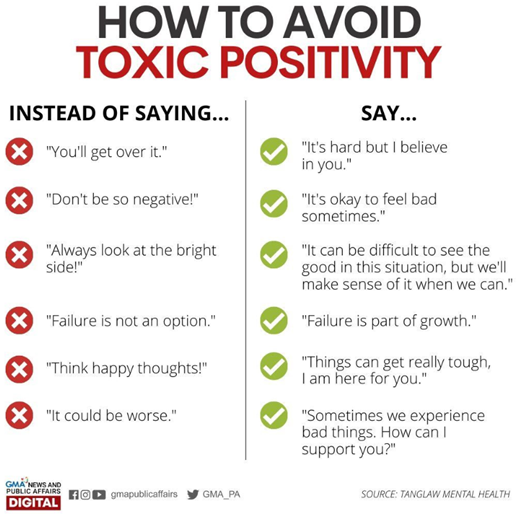
What does toxic positivity look like?
It might be a manager who dismisses an employee’s complaint or a parent who encourages their child to befriend an abusive bully. It’s a teacher who tells a disabled pupil that if they only “worked harder,” they could achieve more. It doesn’t validate feelings or recognise the magnitude of the problem. “Just believe in yourself,” it could sound like; “Stop whining!” “It’s not so horrible,” or “All you need is the appropriate mindset.” It leads to us giving up on a task far too quickly and promotes a fixed mindset, which undermines self-efficacy. This invalidation leads a person who is already doing their best to believe that the fault is with them rather than with their method to fixing the problem. All other circumstances become unimportant because “all” that is required is a change in attitude.
What’s worse? Forcing toxic positivity on someone else is a sort of gaslighting because it is traumatic for that person. When someone minimizes, laughs off, or avoids negative emotions, events, or situations in order to “keep things positive,” rather than admitting the fundamental reasons of a problem and committing to help fix it, they are displaying red flags.
Doesn’t view negativity as a symptom of a problem, but rather the problem itself.
Another reason toxic positivity is harmful is that it is, well, toxic. People become unrelatable, unapproachable, and stunted as a result of it. A person who doesn’t show a broad range of emotions doesn’t appear to be trustworthy – and isn’t. When someone inflicts toxic optimism on someone else, especially if they are an authority figure, the person who first voiced the concern is unlikely to seek aid from them again. The takeaway is that the person advising them to “remain positive” either doesn’t grasp the situation or, worse, doesn’t care enough to repair it. The individual dealing with the issue will seek aid from others in the future, even if their concerns are significantly more serious than the one they initially highlighted. When rapport is replaced with trite and shallow positivity, communication and trust break down.
The reason this is so dangerous is that these viewpoints are typically formed as a result of a person’s own poisonous positivity exposure. This is why it’s often confused with a growth mentality; many people aren’t aware of the distinction. But there’s a significant difference: one embraces adversity, while the other pretends it doesn’t exist.
While people with a growth mindset are willing to try again and again, they are also willing to admit when “this isn’t working” or “we need a new plan.” Collaboration, extreme transparency, and a commitment to getting to the bottom of problems in order to address them are all encouraged by a growth mindset. Toxic positivity, on the other hand, brushes these issues’ causes under the rug if they’re regarded “too negative.” It encourages people to wear smiling expressions even when they are experiencing loss, irritation, or terror. It is a wishful thinking fallacy, not a solution. It just addresses the symptoms of a problem – a person’s reaction or feelings as a result of it — rather tackling the disgusting and uncomfortable root cause.
To summarize, toxic positivity asserts that “everything is fine,” but a growth mindset inquires, “Where are the difficulties, and how do we solve them?” Both have the potential to influence your life; one for the better and one for the worst.

Course Manual 9: Strengths-Based
‘Fixing’ Weaknesses Doesn’t Work
The myth that you must ‘correct your weaknesses’ to be successful is probably the most common reason why people, teams, and corporations struggle to attain their full potential.
The Gallup Organization’s more than 40 years of research has proven that focusing on people’s strengths rather than trying to ‘fix’ their deficiencies improves employee engagement, performance, staff retention, customer engagement, profitability, and even workplace safety.
Yet, like Darryl before his “aha” moment, many leaders continue to believe that by correcting their team’s flaws, they will achieve greater results.
While we can improve on a weakness (or ‘non-talents’ in strengths terminology), the improvement will always be restricted compared to spending the same amount of time and attention on developing a natural talent (which then becomes a ‘strength’).
Working with a weakness not only results in limited improvement, but it also saps our energy and inner motivation, resulting in underperformance and disengagement (see graph).
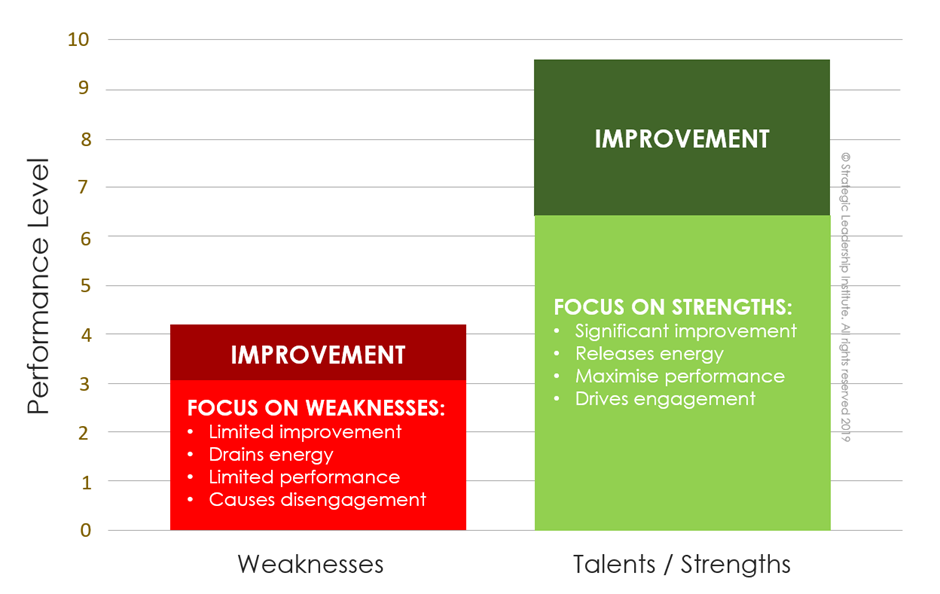

Why Strengths-Based Development Trumps ‘Weakness Fixing’ – A case study
“I have never enjoyed my work as much as I enjoy it now. Which is sad, considering that I’m due to retire in three years from now. Why didn’t they teach us this stuff twenty years ago?”
Coen Wenhold* is head of the Technical and Maintenance Department at one of South Africa’s largest transport companies. He is also a member of the company’s EXCO, where, until recently, his notoriously slow and analytical thinking has often led to friction and even conflict with colleagues who wanted to make decisions and move on.
“Since we’ve been through the Strengths process, I’ve changed the way I work with my team – I’m now focusing on each individual’s strengths instead of trying to get them to improve on their weaknesses as I did before. The results have been phenomenal.
“The best part, however, is how strengths helped me to understand why I think, feel and behave in certain ways. I realised that my strong Deliberative® and Analytical® talents need time to process information, and that this can sometimes frustrate others during meetings or discussions.”
Coen smiles as he continues. “Since Darryl* (Company CEO) also came to understand this, he has completely changed the way in which he manages me. When we have important decisions to make, he now asks me to gather and analyze the relevant information before the meeting. Analysis is my ‘sweet spot’, so I love doing it and I’m really good at it if I have enough time to do it properly.
“During the meeting, I then basically present my findings and deal with questions. Others now also understand my strengths and have come to appreciate and trust my ability to analyse and pre-empt problems before they occur. So it really is a win-win for all.”
Darryl van Rensburg, CEO, nods his head in agreement as he too reflect on how things have changed since the company embarked on their strengths journey, in particular with regard to Coen.
“To be honest, I sometimes thought Coen was being obnoxious. It frustrated the life out of me when he wanted to discuss and question every little detail before we could make a decision. However, when the EXCO team did our Team Strengths Matrix, the lights came on for me, as I realised that I completely misunderstood and underutilized my team’s potential.
“I started to see how it was my role to empower others to use their strengths, not to fix their weaknesses as I was trying to do before. In Coen’s case, it meant allowing him more time for analysis and to trust in his ability to see possible pitfalls which the rest of us didn’t see. Coen is now a greater asset to the company than ever before, and I attribute that directly to switching from weakness-fixing to strengths-based deployment.”

Building a Career on Your Strengths
Almost everyone who takes Gallup’s CliftonStrengths assessment wonders the same thing: What is the ideal career for me? What should I think about doing right now? What is the best fit for me?
These are difficult issues that require more than simply strengths to answer. Career development is also influenced by goals, hobbies, and education. Strengths, on the other hand, must be a big part of your career planning, and the Gallup development basics are a terrific place to start.
Those fundamentals are a collection of strengths-based standards that serve as a foundation for personal development. They provide insights that assist us in identifying our most fulfilling career goals and charting our progress toward achieving them.
This course manual describes how these guidelines relate to career development. What principles should guide career planning, and how can we develop an effective strengths-based career plan?
1. Take charge of your own development.
“Waiting to be noticed” is the most useless strategy. It’s absurd to expect people to see your abilities, take into account your interests and aspirations, and then offer you the ideal job.
When you “own your own development,” you are in charge of your career in the same manner as you are in charge of a job project, a child’s commitment, or your financial condition. It necessitates your participation. Career advancement is driven by ownership, which includes active decision-making and follow-through. Understanding your strengths enhances your self-esteem and inspires you to pursue job opportunities that match your skills.
2. You succeed because of who you are, not because of who you aren’t.
Those who have engaged in strengths-based personal development are familiar with this concept, but you may not see how it pertains to your professional development. It can be difficult to predict how your skills would “play out” in occupations you haven’t tried or even considered.
It’s also easy to become caught up in your restrictions. When presented with a difficult decision, employing a process of elimination can aid in the decision-making process. Rather of starting with what you know best, you eliminate choices for which you believe you lack the necessary expertise, education, or connections. Because it transfers your career progress outside your area of influence, this self-defeating approach limits individual growth.
Rather than losing their power to factors outside their control, successful people keep it. You may achieve and advance professionally by focusing on your skills in conditions that others consider restricted or impossible.
3. You cannot be successful alone.
Individuals who operate alone may be constrained by their unique experiences and knowledge base, as well as their abilities and nontalents. Individuals who develop partnerships with others are more powerful because they may tap into a “talent pool” that includes not just their own resources but also their partners’ talents, knowledge, skills, and abilities.
This remains true for job advancement; other people give resources that are necessary for the process to succeed. These are some of them:
• Strengths insight. Mentors, coaches, and friends who are familiar with you can provide valuable information about your skills and abilities. Even individuals who are unfamiliar with you may be able to recognize your abilities if they possess the required skills. These individuals can act as a mirror, reflecting your own strengths in their assessment of you.
You may need to direct their feedback at times. Ask your mentors or coaches what they think your strengths are and what you should do more of. Is there less of it? What are the qualities that people admire the most in you?
• Opportunities. Others will be aware of opportunities within their own constituencies and circles of influence, including jobs you may not be aware of. Inquiring about such chances is an excellent method to extend your horizons in terms of future roles. Tell them what you’re thinking about and ask for their opinion and assistance.
Opportunities frequently arise as a result of your extensive network of contacts. As some have dubbed it, the “rule of threes” promises to connect you with anyone in three stages. Let your network know you’re looking to connect with a specific person or organization, and someone will be able to offer you with the link you need sooner than you expect.
People can and will play a variety of roles in your development. You’re only limited by your unwillingness to seek for help.
4. What about your weaknesses?
Don’t get caught up in your limitations, but don’t disregard your flaws either. Instead, find out where they came from. Are they based on a person’s abilities? Or are they the result of a lack of knowledge, experience, or opportunity?
Situation-specific talent-based flaws exist. Your non-talents, for example, are unimportant at work until you take on a position that compels you to use them. So take a close look at the job you want. What impact would your non-talents have in that role? What is the significance of that component of the job? Who could assist you in compensating for your lack of talent?
Experience and education barriers are simpler to overcome because they are achievable, whereas fresh skills are not. You want to sell, but you’ve never worked in a sales position before? Look into volunteer programs that allow you to master sales tactics while also contributing to a good cause. Have you ever created a spending plan? Help your manager with the budgeting process by volunteering. Are you looking for a position of leadership? Inquire with your friends, neighbors, religious group, or human resources department. Someone will be aware of an opportunity that meets your requirements.
The knowledge you get from these experiences is just as valuable as the event itself. They might motivate you to take the next step, or they might make you question your motivations and “fit” for the role you want. Either outcome is beneficial to your professional development.
5. Make sure your strategy is something you WOULD Undertake rather than something you feel obligated to do.
The majority of successful people would agree that making a career plan is crucial. Without a plan, you wouldn’t try to launch a new product or manage an existing one. It’s not professional progress if you don’t have a strategy in place; it’s career danger!
The steps you’ll take to advance your career growth should be outlined in your plan. It’s then up to you to make them a reality. Your strategy is pointless if you explain the steps but do not follow them.
How do you make sure your strategy represents your deepest desires? Connect the action steps to your skills. You could get poor outcomes if there isn’t much “fit.” If you discover areas where you require assistance, seek it from mentors, coaches, and friends.
Consider putting together a “career board” to aid in the development of your strategy. Assemble a group of people who are aware of your assets, believe in you, and are eager to share their knowledge, connections, and support.
6. The test of development: results!
You should not anticipate your career strategy to result in you getting the job you want right now. It’s fulfilling and motivating to work in a role that “fits” who you are and in which you flourish. The more time you put into finding the appropriate job, the more probable it is that you will reap the benefits of doing what you do best every day.
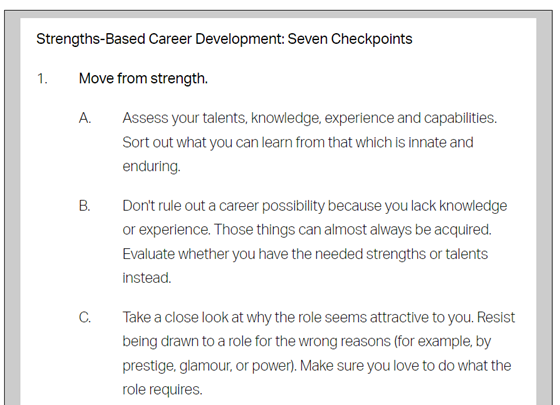
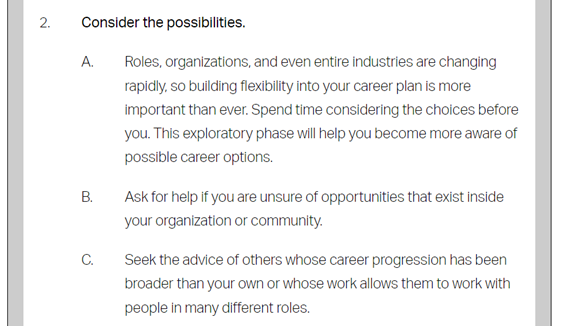
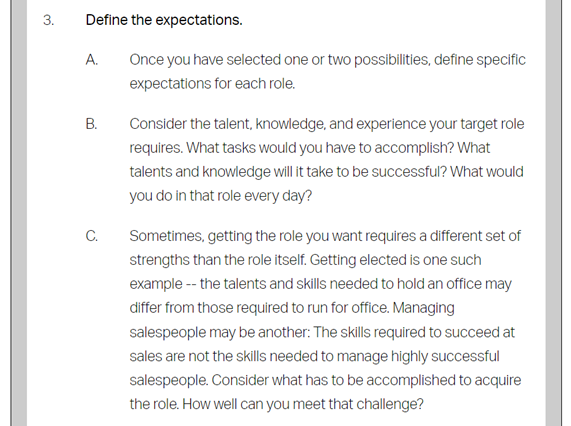
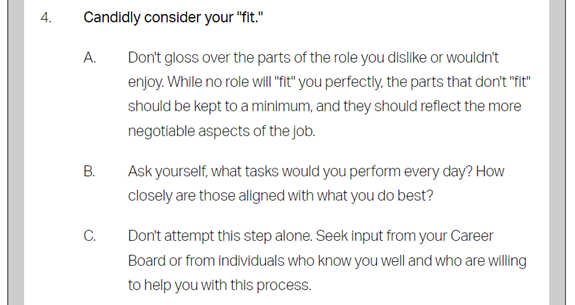
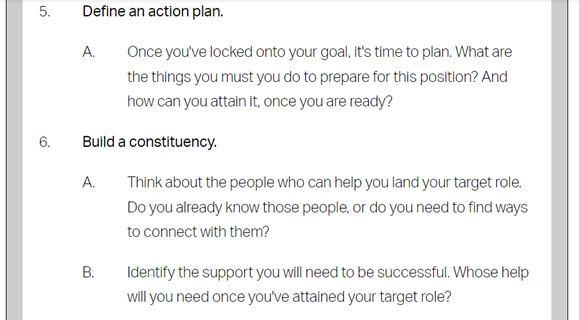
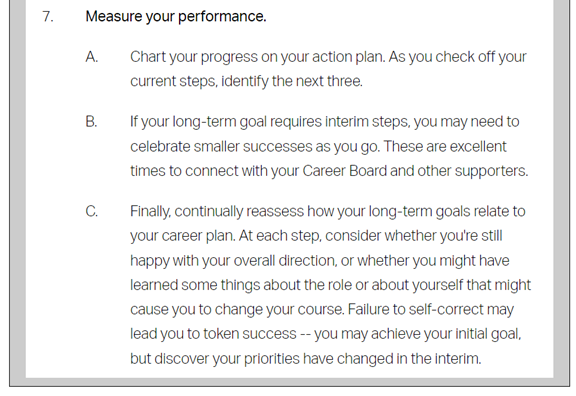

Course Manual 10: Cognitive Biases
List of Common Cognitive Biases
While people like to think of themselves as rational and logical, the truth is that they are constantly influenced by cognitive biases. These biases skew people’s thinking, alter their views, and influence the decisions and judgements they make every day.
These biases can be rather blatant at times, and you may even identify them in yourself or others. In some circumstances, these biases are so subtle that they are difficult to detect.
What causes these biases? There is a finite amount of attention available. This means that when generating thoughts and opinions, we can’t reasonably assess every potential information and occurrence. As a result, we frequently rely on mental shortcuts that speed up our capacity to make decisions, but can also contribute to bias.
The following are just a handful of the many cognitive biases that can have a significant impact on how you think, feel, and act.
The Confirmation Bias
The confirmation bias refers to our inclination to pay more attention to information that supports our current ideas. People are more likely to prefer information that confirms what they already think or believe due to this bias.
Examples include:
• Only paying attention to information that confirms your beliefs about issues such as gun control and global warming
• Only following people on social media who share your viewpoints
• Choosing news sources that present stories that support your views
• Refusing to listen to the opposing side
• Not considering all of the facts in a logical and rational manner
There are several causes for this. One is that just looking to confirm existing beliefs helps us conserve mental resources while making judgments. It also helps to maintain self-esteem by giving people the impression that their opinions are correct.
People on opposing sides of an argument can hear the same tale and come away with distinct interpretations that they believe confirm their previous point of view. This is frequently an indication that confirmation bias is at work to “bias” their viewpoints.
The issue with this is that it can lead to poor decisions, an inability to listen to other viewpoints, and even contribute to the marginalization of those who hold opposing viewpoints.
The Hindsight Bias
The hindsight bias is a common cognitive bias that involves the tendency to see events, even random ones, as more predictable than they are. It’s also commonly referred to as the “I knew it all along” phenomenon.
Some examples of the hindsight bias include:
• Claiming to know who would have won a football game after the game had ended.
• Believing that you knew which political candidate would win an election all along.
• Claiming that after losing a coin toss with a friend, you knew you weren’t going to win
• Reviewing an exam and concluding that you knew the answers to the questions you didn’t get
• Believing that you could have forecast which stocks would go up in value
Classic Research
College students were asked to guess whether then-nominee Clarence Thomas would be confirmed to the United States Supreme Court in a classic psychological experiment.
Prior to the Senate vote, 58 percent of students predicted Thomas’ confirmation. Following Thomas’s confirmation, the students were asked again, and a stunning 78 percent stated they believed Thomas would be confirmed.
Hindsight bias is caused by a number of factors, including our ability to “misremember” past forecasts, our tendency to regard events as inevitable, and our belief that we might have predicted certain events.
The effect of this bias is that it causes us to overestimate our ability to predict events. This can sometimes lead people to take unwise risks.
The Anchoring Bias
The anchoring bias refers to our proclivity to be swayed by the first piece of information we receive. Here are a few examples of how this works:
• During a pricing negotiation, the initial number stated usually becomes the anchoring point for all subsequent discussions.
• Hearing a random number can have an impact on estimates for completely unrelated subjects.
• When diagnosing patients, doctors can succumb to the anchoring bias. The physician’s initial perceptions of the patient frequently serve as an anchoring point for all subsequent diagnostic assessments, which might lead to errors.
While the existence of the anchoring bias has been thoroughly documented, the causes of the bias are still unknown. According to certain studies, the source of the anchor data may play a role. Other elements, such as priming and emotion, appear to play a role as well.
Anchoring, like other cognitive biases, can influence the judgments you make on a daily basis. It can, for example, affect how much you are willing to pay for a home. However, it can occasionally lead to poor decisions and make it more difficult for people to evaluate other relevant facts.
The Misinformation Effect
The misinformation effect occurs when recollections are substantially influenced by events that occurred after the event itself. A witness to a car accident or a crime may feel that their memory is unaffected by even minor effects, however experts have discovered that memory is surprisingly vulnerable to even minor changes.
For example:
• According to research, even asking questions about an event might alter someone’s memory of what occurred.
• Observing the event on television may alter how individuals recall it.
• Hearing other people describe a recollection from their point of view may alter your perception of what happened.
Classic Memory Research
In one classic experiment by memory expert Elizabeth Loftus, people who watched a video of a car crash were then asked one of two slightly different questions: “How fast were the cars going when they hit each other?” or “How fast were the cars going when they smashed into each other?”
When the witnesses were asked if they had seen any broken glass a week later, those who had been presented the “smashed into” form of the question were more likely to report seeing broken glass inaccurately.
A number of causes could be at play in this phenomena. It’s possible that new knowledge will be mixed in with old memories. In some circumstances, new information can be used to fill in memory “gaps.”
Misinformation can have a wide range of consequences, from little to major. It could cause you to forget something that happened at work, or it could lead to someone identifying the wrong culprit in a criminal case mistakenly.

The Actor-Observer Bias
The actor-observer bias is the tendency to blame our actions on external factors while blaming others’ on internal factors. The way we see others and how we ascribe their behavior is influenced by a number of factors, but whether we are the actor or the observer in a circumstance can have a significant impact.
When it comes to our own acts, we are far too quick to blame them on outside influences. Consider the following scenario:
• You can complain that jet lag caused you to miss an essential meeting.
• You may claim that you failed an exam because the professor asked too many trick questions.
However, when it comes to explaining other people’s conduct, we are significantly more likely to blame them on internal factors. Consider the following scenario:
• A coworker botched a critical presentation due to his laziness and incompetence (not because he also had jet lag).
• A classmate failed a test due to a lack of effort and intelligence (and not because they took the same test as you with all those trick questions).
While there are numerous aspects that might influence the outcome, one of the most important is perspective. We may observe our own thoughts and behaviors when we are the actors in a scene. However, we have no way of knowing what other individuals are thinking. This implies we concentrate on situational factors for ourselves, but make educated guesses about the interior factors that drive other people’s behavior.
The issue is that it frequently leads to misconceptions. Instead of considering all of the variables that could be at play, each side of a situation is essentially blaming the other.
The False Consensus Effect
People have a propensity to overestimate how much other people agree with their own ideas, behaviors, attitudes, and values, which is known as the false consensus effect. Consider the following scenario:
• Overestimating the amount of people who are similar to you
• Believing that the majority of people share your tastes
• Thinking that other people share your opinion on controversial matters
The false consensus effect, according to researchers, occurs for a variety of reasons. To begin with, the people we spend the most time with, our family and friends, have a strong tendency to hold similar values and perspectives. As a result, we begin to believe that our way of thinking is shared by the majority of people, even when we are among people who are not in our circle of family and friends.
Another reason we fall prey to this cognitive bias is that believing that others are just like us boosts our self-esteem. It enables us to feel “normal” and retain a favorable self-image in comparison to others.
This might lead people to believe not just that everyone else agrees with them, but also that their own opinions are overvalued. It also implies that when making decisions, we don’t always consider how others might feel.
The Halo Effect
The halo effect is the tendency for a person’s first impression to impact our overall opinion of them. We are either impacted by or utilize the halo to influence others virtually every day, often known as the “physical attractiveness stereotype” or the “what is beautiful is ‘good’ premise.” Consider the following scenario:
• Thinking individuals who are handsome are also smarter, nicer, and funnier than those who are not.
• Believing that things promoted by attractive people are more valuable as well.
• Believing that a confident political candidate must also be intellectual and competent
Our desire to be correct is one aspect that may influence the halo effect. If we have a positive first impression of someone, we want to see proof that our judgement was correct. It also aids people in avoiding cognitive dissonance, which occurs when they hold contradicting views.
In the actual world, this cognitive bias can have a significant influence. Job applicants who are handsome and charming, for example, are more likely to be considered as competent, knowledgeable, and qualified for the position.
The Self-Serving Bias
The self-serving bias is a propensity for people to give themselves credit for their accomplishments while blaming setbacks on external factors. When you do well on a project, you probably think it’s because you put in a lot of effort. When things go wrong, however, you’re more prone to blame it on bad luck or circumstances.
Here are several examples:
• Ascribing excellent grades to intelligence or hard work
• Assuming that your sports prowess is the result of practice and hard work
• Assuming that you received the job because of your qualifications
A number of things can influence the self-serving bias. Age and gender have both been found to play a role. Older individuals are more prone to take credit for their accomplishments, whereas men are more likely to blame external factors for their failures.
This prejudice does play a crucial part in preserving one’s self-esteem. It can, however, lead to erroneous attributions, such as blaming others for our own failings.

The Availability Heuristic
The availability heuristic refers to the propensity to estimate the likelihood of something occurring depending on the number of examples that spring to mind quickly. Here are several examples:
• If you’ve seen multiple news headlines about auto thefts in your neighborhood, you might think they’re more common than they are.
• Because you can easily think of multiple cases, you could believe that plane crashes are more common than they are.
It’s essentially a mental shortcut that allows us to save time while determining risk. The difficulty with this approach is that it frequently leads to inaccurate predictions and poor conclusions.
Smokers who have never known anyone who has died as a result of a smoking-related illness, for example, may underestimate the dangers of smoking. If you have two sisters and five neighbors who have had breast cancer, though, you may assume it is more frequent than statistics indicate.
The Optimism Bias
The optimism bias is a propensity to overestimate the possibility of positive things happening to us while underestimating the likelihood of bad things happening to us. In essence, we are far too optimistic for our own good.
We may believe, for example, that terrible occurrences will have little impact on us, such as:
• Job loss
• Divorce
• Illness
• Death
The availability heuristic is at the foundation of the optimism bias. Because you can probably think of examples of awful things that have happened to other people, it appears that negative events are more likely to affect others.
This bias can lead to health hazards such as smoking, bad dietary habits, and not wearing a seat belt. The bad news is that research has discovered that reducing optimism bias is extremely difficult.
However, there is some good news. This proclivity for optimism contributes to a sense of expectation for the future, providing people with the hope and desire to achieve their objectives.
Final words
The cognitive biases listed above are frequent, but they are just a few of the many that might influence your thinking. Many of our thinking and, ultimately, decisions are influenced by these biases.
A lot of these prejudices are unavoidable. We just don’t have the time to check every thought and choice for bias. Understanding these biases is essential for understanding how they might lead to poor life decisions.

Course Manual 11: Limiting Beliefs
How to Identify Your Limiting Beliefs
So, what’s the best way to spot limiting beliefs? You can do it in a variety of ways, all of which take some personal contemplation.
Given that they may be difficult to spot, here are a few techniques you might use to bring them to light.
1. Identify and Write Down Your Beliefs
Begin by putting down your broad beliefs to uncover beliefs that are limiting you.
Make a list of your beliefs about anything you care about and that affects your daily life. Divide them into categories such as finances, family, relationships, and health.
Examine which ones are assisting you in your growth and which ones may be hindering you.
2. Assess Your Behavior
Another method for identifying limiting beliefs is to examine your own conduct.
Consider situations where you’ve acted in a negative or toxic manner and why you did so. If you examine your harmful behaviors closely, you may find that the underlying cause is a set of limiting beliefs.
If you find it difficult to express yourself when someone has offended you, for example, you may have the limiting view that conflict is bad. As a result, you may be unable to establish truly close relationships since you are unable to express yourself and have healthy confrontations.
3. Write Down Areas Where You Feel Challenged
If you’ve observed that you’re having trouble in particular aspects of your life, it’s possible that you have limiting beliefs.
Maybe you can’t seem to find a well-paying work, or you’ve never had luck with love. These difficulties could simply be the result of false beliefs that you’ve accepted as reality.
Make a note of which of your beliefs apply to each obstacle you write down as you go through each one. So, if you’re constantly fighting to make enough money, take a look at how you think about money and how easily you can get it.

7 Ways to Overcome Limiting Beliefs
The good news is that you have the ability to change your limiting beliefs at any time. This does not imply that it will be a simple process, but dedication and a higher level of self-awareness can help.
The tips below may assist you in overcoming any limiting beliefs you may have.
1. Organize Your Environment
Your surroundings, believe it or not, can influence your beliefs. A well-organized and roomy workplace can help you think more positively and boost your mental health. When your surroundings are neat, you have more room to think and obtain clarity.
Get rid of any clutter you may have acquired at home to improve the environment. You can even consider remodelling your room to increase flow.
You may even employ feng shui principles. The primary principle is to channel the flow of energy by strategically positioning things.
It’s an effective approach to keep positive energy flowing through your home while removing negative energy. Hopefully, this will have a beneficial impact on your thinking and assist you in focusing on positive thoughts and beliefs.
2. Try Minimalism
Minimalism might assist you in overcoming incorrect assumptions that are holding you back.
Minimalism is defined by clarity, honesty, and a separation from material possessions.
For example, if you’re addicted to filling your closet with new clothes, it could be due to self-limiting thoughts about your physical appearance. “I’m not attractive unless I’m dressed in the latest fashion,” for example, is an example of such a notion.
Because minimalism is all about changing your attitude and fighting peer pressure, it may be able to help you overcome limiting ideas and embrace a more fulfilling lifestyle.
3. Explore More
As previously said, closed-mindedness can lead to restrictive beliefs. Learn to follow your curiosity to help open your mind. You’re more inclined to investigate the world around you and break out of your comfort zone if you give in to curiosity. This has the potential to broaden your mind and cause you to question your views.
Curiosity also allows you to learn about other people’s perspectives and observe new concepts. Conversations with people from different backgrounds are one method to learn more about yourself.
Traveling is another great option to attempt because it allows you to interact with people from various cultures and ways of life.
4. Counseling
If you’re having trouble changing your limiting ideas on your own, a therapist or counselor may be able to help.
If your limiting beliefs are causing you to experience other symptoms such as anxiety or sadness, you may need to seek professional help even more. Counselors and therapists provide the resources and skills to assist you in overcoming obstacles and leading a more fulfilling life. They can also help you identify limiting beliefs and provide you with the tools you need to overcome them, such as gamified cognitive-behavioral therapies.
Getting counseling and health-related services has never been easier thanks to technological advancements. This is because you can use your smartphone to download health-related apps and communicate with your therapist or counselor.
Anxiety triggers, emotional states, and your progress over time can all be tracked with mental health trackers. All of this means you’re not alone in your quest to break free from restrictive ideas.
5. Meditation
Beliefs are typically formed by other people’s thinking worming their way into our own, therefore addressing your own thoughts may help you modify unfavorable beliefs.
Take a few minutes each day to meditate to have more control over your thoughts. Meditation allows you to clear your mind of negative or undesired thoughts and ideas.
Allowing thoughts to travel through your mind without engaging in them should be the purpose of meditation.
Meditation aids in the relaxation of the mind and the connection with one’s inner self. You may focus on the positive beliefs you wish to embrace once you’ve gotten through all of the clutter in your head.
These beliefs may eventually take the place of the negative ones. Your mind will be filled with positive beliefs that will help you become the best version of yourself before you know it.
6. Personal Development
You must work on yourself if you want better beliefs to govern your thoughts and decisions. This entails actively seeking out possibilities for growth and development in all areas of your life.
Self-improvement is crucial since it can help you become more self-aware and overcome flaws. Because it necessitates action, you’re compelled to do something about your limiting ideas rather than hoping they’ll vanish on their own.
There are a variety of ways to grow as a person, including:
• Reading books from authors that share the kind of beliefs you hope to have.
• Podcasts are also a great way to consume information that could make you better.
• Set practical goals so that you can measure your growth.
• Journaling can help you monitor your progress, especially when it comes to your thoughts and beliefs.
7. Positive Affirmations
It can be difficult to build positive beliefs if you have poor self-esteem. Positive affirmations, on the other hand, are an excellent technique to boost your self-esteem. They compel you to speak positively about yourself, and hopefully, over time, you will learn to believe your affirmations.
It may be difficult to attract loving and compassionate individuals into your life if you have limiting thoughts about how lovable you are.
You may put down an affirmation like “I am valuable, amazing, and lovable” to assist you shift your mind. Saying this to yourself every day could help you gain self-confidence over time.
Your positive affirmations should also highlight your positive qualities. Use your accomplishments and strengths to create affirmations that remind you of how amazing you are. This may also provide you with the motivation to push yourself and achieve more.
Final Thoughts
The world is full of beliefs, and as long as there are different kinds of people, this won’t change. However, you must determine which ideas enable you to live the life you’ve always desired.
All of the beliefs that prevent you from living that life are restricting and should be abandoned. You offer yourself an opportunity to live a life that exceeds your expectations by doing so.

Case study: How overcoming limiting beliefs could make you millions
“During one of our regular meetings with a business advisory client, we began discussing the five-year plan of the business. We asked the two directors where they saw themselves and their business in five years’ time. We quickly realised that there was a big difference between the directors’ thoughts. When discussing the business’s possible future turnover, one director said he thought the business could be turning over around £10 million, and the other thought £1 million. We quickly realised that the vast difference in their expectations was due to the limiting beliefs of one of the directors. The director who estimated the lower amount had the belief that one million was the maximum amount a business like his could turnover, and that anything more was unrealistic. He didn’t see himself as ever being a very wealthy person. However, the other director did not have this limiting belief and therefore could see the business’s real potential for growth.
Overcoming limiting beliefs
Using our coaching skills, we worked together and discussed the director’s limiting belief. Throughout the discussion it became clear that they were a person who preferred to look at things in fine detail, rather than the bigger picture. Once we knew that, we could help overcome the limiting belief by breaking the idea of a £10 million turnover into parts, by looking at the different factors and what little things would need to happen year on year for the business to grow to that level. Once the £10 million plan was broken down, both directors agreed that it was a realistic and achievable plan and there would only be a few small steps to take over the next five years to be able to achieve it. Both directors now had the empowering belief that they CAN achieve a £10million turnover in the next five years, and they left the meeting with a positive view of the future of their business. By challenging their beliefs and assumptions about what they felt they could achieve, we helped them empower themselves to reach their true potential.”
Source: Rosslyn Associates

Course Manual 12: Leadership: Process Feedback
The Importance of Feedback: 7 Benefits
So, what is it about feedback that is so appealing? Let’s look at how team leaders can use it to affect communication and collaboration inside their organization.
1. Feedback keeps everyone on track.
This is advantageous for anyone engaged in any form of activity, such as working on a project, preparing for an event, learning, and so on.
2. Feedback helps your team avoid major mistakes.
It saves you time correcting someone’s work, decreases errors caused by miscommunication, and prevents regrets from people who feel like they failed by establishing a clear and honest communication flow during any type of teamwork.
3. You form better relationships.
Honesty and trust are fostered via feedback. It frequently entails criticism, which is something that most people dislike. However, if provided in the appropriate way, it can aid in their evolution.
4. Constructive feedback motivates people.
Here, a friendly demeanor works nicely. You may not only assist people in seeing what they may be doing incorrectly, but you can also allow them to use this as counsel rather than judgment. Make them feel as if you believe in them and simply want to assist them in achieving the project’s objectives sooner. They will be much more motivated to accomplish an excellent job as a result of this.
5. Feedback promotes personal and professional growth.
Feedback entails actively listening, analyzing, and then devising the greatest feasible solution to improve performance. It offers constructive criticism and enables everyone to recognize what they can do to enhance their attention and results. It draws individuals together and allows for a healthy flow of conversation.
6. Feedback helps to create a friendly work environment.
Other beneficial impacts include greater openness to criticism and a desire to receive feedback. It’s not uncommon for the best ideas to come from a team member who merely proposes a solution to a problem or points out an issue that others haven’t yet seen.
7. Feedback produces some business-related, direct benefits.
They are business expansion, cost savings, increased sales, on-time project completion, and other positive developments in finance, customer relationships, and market positions.
All of this increases team members’ involvement in the work process. Once offering feedback becomes a habit, you may notice that people become more engaged and loyal.

The Skill of Providing Feedback
The value of feedback for a team leader, manager, or instructor cannot be overstated. While it is a strong practice with an apparent positive impact, it may also be harmful, lowering people’s self-esteem or making them feel underappreciated.
Plan your approach ahead of time to ensure a successful outcome. Consider these simple suggestions on what to do and what not to do while giving and receiving feedback.
• First, avoid any language that could be interpreted as condemning or judging: you want to motivate people and show them areas where they can develop, not the other way around. Always emphasize to your staff the importance of open communication about potential improvements as a win-win situation. Mention their qualities first, then point out an area where they could improve.
• Be specific and use evidence. Your staff should understand exactly the part of the project you’re discussing, what went wrong, and how it can be fixed. As a result, it’s critical to rely on hard evidence like time tracking and employee progress statistics to show how much time each person spends on tasks and what activities they engage in along the way. ActiTIME, a smart timesheet application with powerful reporting and task management capabilities, can be used to capture this information. It can assist you in real-time monitoring of team performance and data collection to inform your feedback.
• Give individuals time to understand your feedback and follow up on their reactions. They should feel free to express their feelings about it. Be open-minded and consider the perspectives of your colleagues.
• Don’t forget to let them be part of the problem-solving process. Even if you already have a specific solution in mind, hear them out, then share your proposal using some of their words or ideas.
• It is not uncommon that people aren’t actually sure what happened or what their next step should be. That’s why you should ask questions in the end and see if the other person received your message. Follow up after a few days to see how they are doing and whether there’s still an issue.
• Finally, encourage team members to provide feedback. Leave your ego at the door and ask if they have anything to say about your performance and function as a manager. Pay attention to what they say. Allow them to give examples so you can understand what they’re talking about, and then talk about it honestly and collaboratively to figure out how to make it work and use the feedback effectively.
The Importance of Feedback
Your next step should be to encourage team feedback. Make space for it (and schedule time for it!) when you plan your future activities. Take into account that feedback should be available at all times. Allow time for your staff to adjust to this new, open-minded, and feedback-friendly atmosphere.

How to Deliver Effective Feedback in the Workplace
How to Give Effective Feedback
It’s crucial to provide feedback, but knowing how to do so successfully is even more critical. In order to be valuable, your feedback must be precise, concise, and focused. We’ll show you how to give effective feedback and give you some examples of constructive comments.
Start with the Positive
If you need to deliver critical criticism, such as on a piece of work, start by praising the employee’s accomplishments. Individually, we are significantly more likely to internalize criticism than compliments. Employees are less likely to take criticism personally when it is presented in a good light.
Constructive feedback example
Instead of: “Your work isn’t written in line with our company voice.”
Try this: “I really like how you’ve approached this piece of work. I have identified a couple of instances where your writing doesn’t match the company voice, so please can you revisit these again.”
Be Specific
If you want to get the most out of your feedback, it needs to be direct. Avoid making broad judgments and asking broad questions about something. Make your opinion as specific and actionable as possible by include as much information as possible.
Constructive feedback example
Instead of: “You were great!”
Try this: “I really liked the introduction you gave in your presentation on Monday.”
Instead of: “Can you make your work a bit clearer and consistent?”
Try this: “Your spreadsheet is quite helpful and informative. The last two columns, on the other hand, are not as obvious as the rest of your columns. “Could you please make them match the rest?”
Be Objective
Always stick to real information and back up your comments, even if they’re negative. Make an effort not to make decisions based on subjective information or personal sentiments and emotions.
Constructive feedback example
Instead of: “I’m not keen on how you answered that phone call.”
Try this: “I was pleased with how quickly you answered that phone call. However, next time please can you give the customer your name and ask how you can help?”
Give Actionable Advice
If you’re going to give unfavorable comments, it’s critical to provide actionable recommendations. It’s pointless to criticize a piece work if you don’t offer suggestions for how to enhance it. Always give pointers for the employee to work on, and follow up on your feedback to make sure they grasp what they’re supposed to perform.
Constructive feedback example
Instead of: “I think you could improve your public speaking.”
Try this: “Great job on speaking in front of everyone; I know how intimidating it may be. Instead of glancing down at your writing, consider looking up a little more next time. I have a book you can read to assist you gain confidence in your ability to do this.”
Make Feedback Frequent
Always strive to provide frequent feedback – don’t wait until an annual appraisal to let an employee know how they’re doing. This is especially critical if you are dissatisfied with an employee’s performance on a task. If you don’t provide feedback quickly, the employee will unconsciously continue to do the same mistakes.
Constructive feedback example
Instead of: “I’ll discuss this piece of work with you in your next monthly one-to-one.”
Try this: “I’d like to talk with you about this project.” Could you please tell me when you’ll be available to talk about it in the next few days?”
Communicate face-to-face
If at all possible, give feedback in person rather than via chat platforms or email. This allows the employee to ask questions and ensures that your feedback is genuine.
Constructive feedback example
Instead of: “I’ll email you feedback on your task.”
Try this: “I’d like to provide you with some feedback on your completed project.” Could you please tell me when you’ll be available to talk about it in the next few days?”
Workshop Exercises
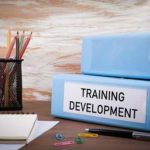
Growth Foundation Exercises
01. Growth Mindset: Explain in your own words how this process will directly impact upon your department?
02. Intention Sets the Course: Explain in your own words how this process will directly impact upon your department?
03. Three-Part Brain: Explain in your own words how this process will directly impact upon your department?
04. Basic Human Needs: Explain in your own words how this process will directly impact upon your department?
05. Self-Esteem & Self-Efficacy: Explain in your own words how this process will directly impact upon your department?
06. PERMA Model of Human Flourishing: Explain in your own words how this process will directly impact upon your department?
07. Illness/Wellness Continuum: Explain in your own words how this process will directly impact upon your department?
08. Positivity-Focused: Explain in your own words how this process will directly impact upon your department?
09. Strengths-Based: Explain in your own words how this process will directly impact upon your department?
10. Cognitive Biases: Explain in your own words how this process will directly impact upon your department?
11. Limiting Beliefs: Explain in your own words how this process will directly impact upon your department?
12. Leadership: Process Feedback: Explain in your own words how this process will directly impact upon your department?

SWOT & MOST Analysis Exercises
01. Undertake a detailed SWOT Analysis in order to identify your department’s internal strengths and weaknesses and external opportunities and threats in relation to each of the 12 Growth Foundation processes featured above. Undertake this task together with your department’s stakeholders in order to encourage collaborative evaluation.
02. Develop a detailed MOST Analysis in order to establish your department’s: Mission; Objectives; Strategies and Tasks in relation to Growth Foundation. Undertake this task together with all of your department’s stakeholders in order to encourage collaborative evaluation.
Project Studies
Project Study (Part 1) – Customer Service
The Head of this Department is to provide a detailed report relating to the Growth Foundation process that has been implemented within their department, together with all key stakeholders, as a result of conducting this workshop, incorporating process: planning; development; implementation; management; and review. Your process should feature the following 12 parts:
01. Growth Mindset
02. Intention Sets the Course
03. Three-Part Brain
04. Basic Human Needs
05. Self-Esteem & Self-Efficacy
06. PERMA Model of Human Flourishing
07. Illness/Wellness Continuum
08. Positivity-Focused
09. Strengths-Based
10. Cognitive Biases
11. Limiting Beliefs
12. Leadership: Process Feedback
Please include the results of the initial evaluation and assessment.
Project Study (Part 2) – E-Business
The Head of this Department is to provide a detailed report relating to the Growth Foundation process that has been implemented within their department, together with all key stakeholders, as a result of conducting this workshop, incorporating process: planning; development; implementation; management; and review. Your process should feature the following 12 parts:
01. Growth Mindset
02. Intention Sets the Course
03. Three-Part Brain
04. Basic Human Needs
05. Self-Esteem & Self-Efficacy
06. PERMA Model of Human Flourishing
07. Illness/Wellness Continuum
08. Positivity-Focused
09. Strengths-Based
10. Cognitive Biases
11. Limiting Beliefs
12. Leadership: Process Feedback
Please include the results of the initial evaluation and assessment.
Project Study (Part 3) – Finance
The Head of this Department is to provide a detailed report relating to the Growth Foundation process that has been implemented within their department, together with all key stakeholders, as a result of conducting this workshop, incorporating process: planning; development; implementation; management; and review. Your process should feature the following 12 parts:
01. Growth Mindset
02. Intention Sets the Course
03. Three-Part Brain
04. Basic Human Needs
05. Self-Esteem & Self-Efficacy
06. PERMA Model of Human Flourishing
07. Illness/Wellness Continuum
08. Positivity-Focused
09. Strengths-Based
10. Cognitive Biases
11. Limiting Beliefs
12. Leadership: Process Feedback
Please include the results of the initial evaluation and assessment.
Project Study (Part 4) – Globalization
The Head of this Department is to provide a detailed report relating to the Growth Foundation process that has been implemented within their department, together with all key stakeholders, as a result of conducting this workshop, incorporating process: planning; development; implementation; management; and review. Your process should feature the following 12 parts:
01. Growth Mindset
02. Intention Sets the Course
03. Three-Part Brain
04. Basic Human Needs
05. Self-Esteem & Self-Efficacy
06. PERMA Model of Human Flourishing
07. Illness/Wellness Continuum
08. Positivity-Focused
09. Strengths-Based
10. Cognitive Biases
11. Limiting Beliefs
12. Leadership: Process Feedback
Please include the results of the initial evaluation and assessment.
Project Study (Part 5) – Human Resources
The Head of this Department is to provide a detailed report relating to the Growth Foundation process that has been implemented within their department, together with all key stakeholders, as a result of conducting this workshop, incorporating process: planning; development; implementation; management; and review. Your process should feature the following 12 parts:
01. Growth Mindset
02. Intention Sets the Course
03. Three-Part Brain
04. Basic Human Needs
05. Self-Esteem & Self-Efficacy
06. PERMA Model of Human Flourishing
07. Illness/Wellness Continuum
08. Positivity-Focused
09. Strengths-Based
10. Cognitive Biases
11. Limiting Beliefs
12. Leadership: Process Feedback
Please include the results of the initial evaluation and assessment.
Project Study (Part 6) – Information Technology
The Head of this Department is to provide a detailed report relating to the Growth Foundation process that has been implemented within their department, together with all key stakeholders, as a result of conducting this workshop, incorporating process: planning; development; implementation; management; and review. Your process should feature the following 12 parts:
01. Growth Mindset
02. Intention Sets the Course
03. Three-Part Brain
04. Basic Human Needs
05. Self-Esteem & Self-Efficacy
06. PERMA Model of Human Flourishing
07. Illness/Wellness Continuum
08. Positivity-Focused
09. Strengths-Based
10. Cognitive Biases
11. Limiting Beliefs
12. Leadership: Process Feedback
Please include the results of the initial evaluation and assessment.
Project Study (Part 7) – Legal
The Head of this Department is to provide a detailed report relating to the Growth Foundation process that has been implemented within their department, together with all key stakeholders, as a result of conducting this workshop, incorporating process: planning; development; implementation; management; and review. Your process should feature the following 12 parts:
01. Growth Mindset
02. Intention Sets the Course
03. Three-Part Brain
04. Basic Human Needs
05. Self-Esteem & Self-Efficacy
06. PERMA Model of Human Flourishing
07. Illness/Wellness Continuum
08. Positivity-Focused
09. Strengths-Based
10. Cognitive Biases
11. Limiting Beliefs
12. Leadership: Process Feedback
Please include the results of the initial evaluation and assessment.
Project Study (Part 8) – Management
The Head of this Department is to provide a detailed report relating to the Growth Foundation process that has been implemented within their department, together with all key stakeholders, as a result of conducting this workshop, incorporating process: planning; development; implementation; management; and review. Your process should feature the following 12 parts:
01. Growth Mindset
02. Intention Sets the Course
03. Three-Part Brain
04. Basic Human Needs
05. Self-Esteem & Self-Efficacy
06. PERMA Model of Human Flourishing
07. Illness/Wellness Continuum
08. Positivity-Focused
09. Strengths-Based
10. Cognitive Biases
11. Limiting Beliefs
12. Leadership: Process Feedback
Please include the results of the initial evaluation and assessment.

Project Study (Part 9) – Marketing
The Head of this Department is to provide a detailed report relating to the Growth Foundation process that has been implemented within their department, together with all key stakeholders, as a result of conducting this workshop, incorporating process: planning; development; implementation; management; and review. Your process should feature the following 12 parts:
01. Growth Mindset
02. Intention Sets the Course
03. Three-Part Brain
04. Basic Human Needs
05. Self-Esteem & Self-Efficacy
06. PERMA Model of Human Flourishing
07. Illness/Wellness Continuum
08. Positivity-Focused
09. Strengths-Based
10. Cognitive Biases
11. Limiting Beliefs
12. Leadership: Process Feedback
Please include the results of the initial evaluation and assessment.

Project Study (Part 10) – Production
The Head of this Department is to provide a detailed report relating to the Growth Foundation process that has been implemented within their department, together with all key stakeholders, as a result of conducting this workshop, incorporating process: planning; development; implementation; management; and review. Your process should feature the following 12 parts:
01. Growth Mindset
02. Intention Sets the Course
03. Three-Part Brain
04. Basic Human Needs
05. Self-Esteem & Self-Efficacy
06. PERMA Model of Human Flourishing
07. Illness/Wellness Continuum
08. Positivity-Focused
09. Strengths-Based
10. Cognitive Biases
11. Limiting Beliefs
12. Leadership: Process Feedback
Please include the results of the initial evaluation and assessment.

Project Study (Part 11) – Logistics
The Head of this Department is to provide a detailed report relating to the Growth Foundation process that has been implemented within their department, together with all key stakeholders, as a result of conducting this workshop, incorporating process: planning; development; implementation; management; and review. Your process should feature the following 12 parts:
01. Growth Mindset
02. Intention Sets the Course
03. Three-Part Brain
04. Basic Human Needs
05. Self-Esteem & Self-Efficacy
06. PERMA Model of Human Flourishing
07. Illness/Wellness Continuum
08. Positivity-Focused
09. Strengths-Based
10. Cognitive Biases
11. Limiting Beliefs
12. Leadership: Process Feedback
Please include the results of the initial evaluation and assessment.

Project Study (Part 12) – Education
The Head of this Department is to provide a detailed report relating to the Growth Foundation process that has been implemented within their department, together with all key stakeholders, as a result of conducting this workshop, incorporating process: planning; development; implementation; management; and review. Your process should feature the following 12 parts:
01. Growth Mindset
02. Intention Sets the Course
03. Three-Part Brain
04. Basic Human Needs
05. Self-Esteem & Self-Efficacy
06. PERMA Model of Human Flourishing
07. Illness/Wellness Continuum
08. Positivity-Focused
09. Strengths-Based
10. Cognitive Biases
11. Limiting Beliefs
12. Leadership: Process Feedback
Please include the results of the initial evaluation and assessment.
Program Benefits
Human Resources
- Improve engagement
- Improve retention
- Mitigate burnout
- Foster wellbeing
- Human flourishing
- Inclusive environment
- Recover morale
- Inspire workforce
- Reduce absenteeism
- Employee satisfaction
Management
- Greater collaboration
- Increased focus
- Supportive culture
- Cohesive workforce
- Greater potential
- Team work
- Employee empowerment
- Individual ownership
- Strength exploitation
- Improved outcomes
Production
- Promote innovation
- Lead-time reduction
- Increased productivity
- Enhanced feedback
- Accurate projections
- Better responsiveness
- Resource utilization
- Reduce risk
- Greater resilience
- Improved performance
Client Telephone Conference (CTC)
If you have any questions or if you would like to arrange a Client Telephone Conference (CTC) to discuss this particular Unique Consulting Service Proposition (UCSP) in more detail, please CLICK HERE.






